In the 2018 governor’s race, Gavin Newsom leads the pack in fundraising
Schwarzenegger: ‘We’re going through some difficult moments ... but I guarantee we will work our way out of this’
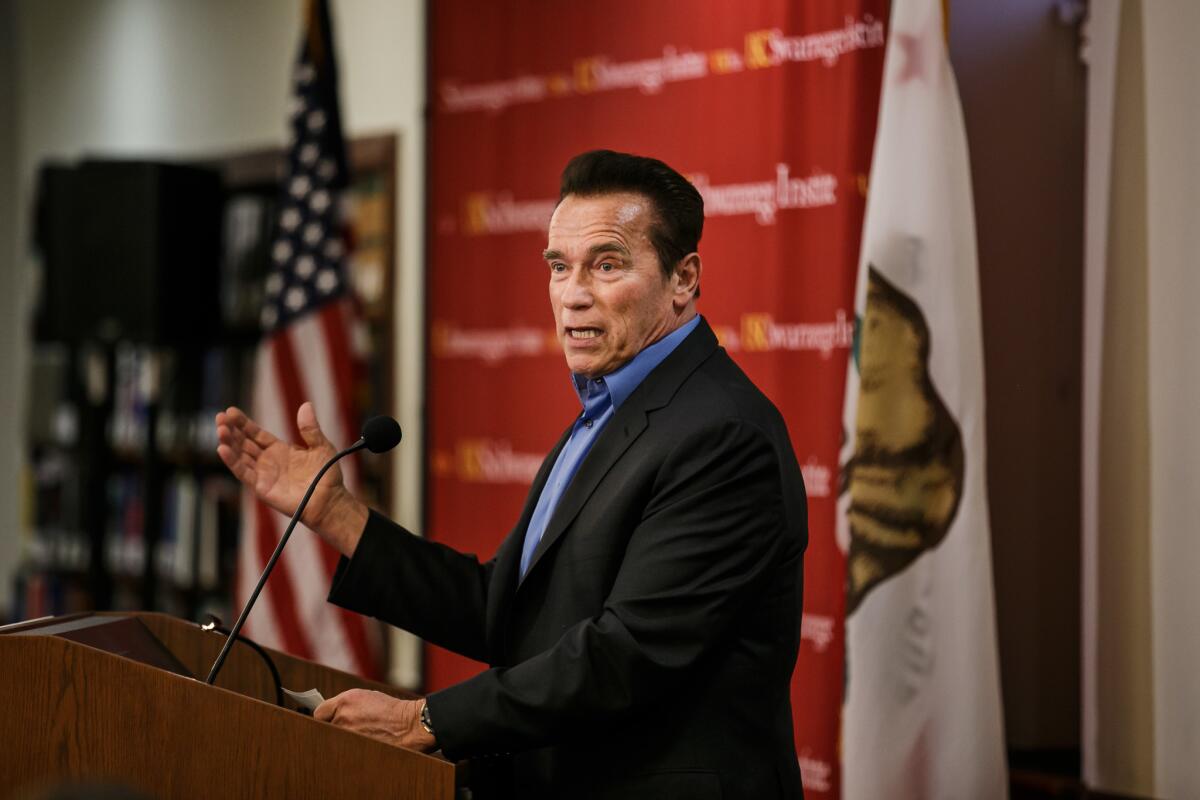
Former Gov. Arnold Schwarzenegger said Tuesday that the United States had faced trying times and political crises before, and has always persevered.
“Yes, we’re going through some difficult moments right now, as we have in the past, but I guarantee we will work our way out of this,” Schwarzenegger said, speaking at an electoral reform event at the University of Southern California.
He recalled immigrating to the United States and seeing the violent protests at the Democratic National Convention in 1968, Watergate and the economic troubles during President Jimmy Carter’s tenure.
“One thing you can count on in America is even though it falls every so often — as we all do — it dusts itself off, gets up and gets going again,” Schwarzenegger said. “That is why … it’s the number one country in the world.”
Although Schwarzenegger did not mention President Donald Trump by name during his remarks, the comments appeared to be a reference to the turbulence since Trump took office less than two weeks ago.
Tensions between Schwarzenegger, who replaced Trump as the host of “Celebrity Apprentice,” and the new president and fellow Republican have been escalating. On Monday, Schwarzenegger called the implementation of Trump’s temporary ban on immigration from several Muslim-majority countries “crazy.” The previous week, Schwarzenegger slammed Trump’s pick to lead the Environmental Protection Agency, Oklahoma Atty. Gen. Scott Pruitt, as a hypocrite.
Earlier in January, Trump mocked Schwarzenegger for the first ratings of “Celebrity Apprentice” after the former governor took over as the host. During the presidential campaign, Schwarzenegger repeatedly made clear his disdain for Trump, pointedly casting his ballot in the California primary for Ohio Gov. John Kasich after he had dropped out.
On Tuesday, Schwarzenegger was headlining an event about redistricting reform at his namesake institute at USC. He did not respond to reporters’ questions after the event.
While governor, Schwarzenegger championed electoral reform, including an ultimately successful effort to take the redrawing of congressional and legislative districts away from politicians and give them instead to an independent commission.
Both political parties have long tried to use gerrymandering to create districts that favor their politicians.
But David Daley, author of “The True Story Behind the Secret Plan to Steal America’s Democracy,” argued that Republicans were able to make unprecedented changes in the 2010 redistricting that will have long-lasting effects on this nation’s politics because of a confluence of factors, including unprecedented technology such as mapping software, and a flood of anonymous money due to the Citizens United ruling.
“In 2010, gerrymandering enters its steroid era,” Daley said.
The end result, he said, was that while the nation remained relatively closely divided between the two parties, the GOP was able to exponentially expand its hold of statehouses, governor’s mansions and congressional seats.
Speakers urged Californians to take the lessons they had learned through the state’s redistricting reform and try to help voters apply them in other states, through the initiative, or legislative or legal systems.
“We are the model for the rest of the nation and that is why we in California have to do everything we can to pull together all the things that happen successfully in California and nationwide,” Schwarzenegger said. “Because the rest of the states are waiting for us.”
Top Democratic donor Tom Steyer is planning a larger role opposing President Trump
On Sunday, Tom Steyer was holding a cardboard sign saying “not on my watch” at San Francisco’s airport, one of thousands protesting President Trump’s order preventing visitors from several predominantly Muslim countries.
“I went out there to participate, but also to listen,” he said.
Like other liberal leaders, he’s been hunting for the right approach to counter Trump. Now the deep-pocketed Democratic donor is launching a new effort that could expand the scope of NextGen Climate, the San Francisco-based organization he created and funded.
Although Steyer expects to stay active on environmental issues — the onetime hedge fund manager is best known for advocating stronger steps to fight climate change and support clean energy — he’s looking to play a more expansive role in opposing Trump.
“The number of issues that have to be addressed are broader,” he said in an interview, pointing to Trump’s statements on issues such as voting that he considers to be a broader attack on “fundamental American rights.” In a video posted on Tuesday night, Steyer says, “I promise to do everything in my power to stand up to Trump” and asks for the public’s thoughts on what next steps should be taken.
Steyer spent $74 million in the 2014 midterm election, and then millions more last year to support Hillary Clinton and other Democrats. Although results have been mixed — Republicans gained ground in both years — Steyer said the experiences have positioned NextGen to educate and mobilize voters across the country.
“There are very few people who are set up organizationally to do what we’re trying to do,” he said.
Steyer has already played a role in opposing Trump’s nominees, running advertisements criticizing his choice for secretary of State, former Exxon Mobil Chief Executive Rex Tillerson.
Besides simply fighting Trump, Steyer also hopes to project an alternative view of the country — one that comes with a dose of California sunshine.
“America can pursue a much more optimistic, a much more prosperous, a much more equitable and a much healthier future,” he said.
At CNN town hall, House Minority Leader Nancy Pelosi calls Trump ‘reckless’ for refugee ban
House Minority Leader Nancy Pelosi (D-San Francisco) called President Trump “reckless” and his administration “incompetent” Tuesday night for his executive order last week banning refugees and visa holders from seven countries from entering the United States.
Pelosi was participating in a CNN town hall and responding to a question from a Yemeni woman whose mother cannot enter the country, when she said, “Your family is suffering because our president is reckless.”
You can see the full exchange below along with some other highlights from the town hall.
Former aide is preparing to run for Rep. Grace Napolitano’s seat if she retires
Rep. Grace Napolitano (D-Norwalk), who turned 80 last year, has not made plans to retire. But one San Gabriel Valley politician is raising funds to run in case Napolitano does decide to bow out after 10 terms in Congress.
Mary Ann Lutz, the former mayor of Monrovia and a former aide to Napolitano, reported having $101,000 in the bank to run for Napolitano’s 32nd Congressional District seat, according to a new filing with the Federal Election Commission.
But Lutz says she will run only if Napolitano retires.
“I have enormous respect for my former boss, Congresswoman Grace Napolitano, and would never run against her for any office,” Lutz said in a statement. “In the event that the 32nd Congressional District seat eventually opens up, I plan to run, and run aggressively.”
Napolitano suffered a minor stroke last February that affected her ability to write and slightly slowed her walk.
She continued her reelection campaign and beat state Assemblyman Roger Hernandez (D-West Covina), who effectively ended his campaign in August after a judge granted his ex-wife’s request for a domestic violence restraining order against him.
During an interview with The Times a day before the November election, Napolitano said the health of her 90-year-old husband would be a key factor in her decision on whether to run for an 11th term in 2018.
“I would love to stay but it depends,” she said. “I will be ready to hang it up when I am ready.”
Lutz was elected in 2003 to the City Council in Monrovia, a city of 36,000 in the foothills of the San Gabriel Mountains, and was elected mayor in 2009. She lost her reelection bid in 2015 and went on to work for Napolitano as an advisor on water issues.
Lutz raised $26,000 and loaned her campaign committee an additional $75,000. Napolitano has $144,692 in the bank if she wants to run again.
Repeat challenger to Xavier Becerra enters race to replace him in Congress
Villaraigosa raises a quick couple of million dollars for his gubernatorial campaign
State Senate committee votes in favor of funding legal aid for immigrants in California facing deportation
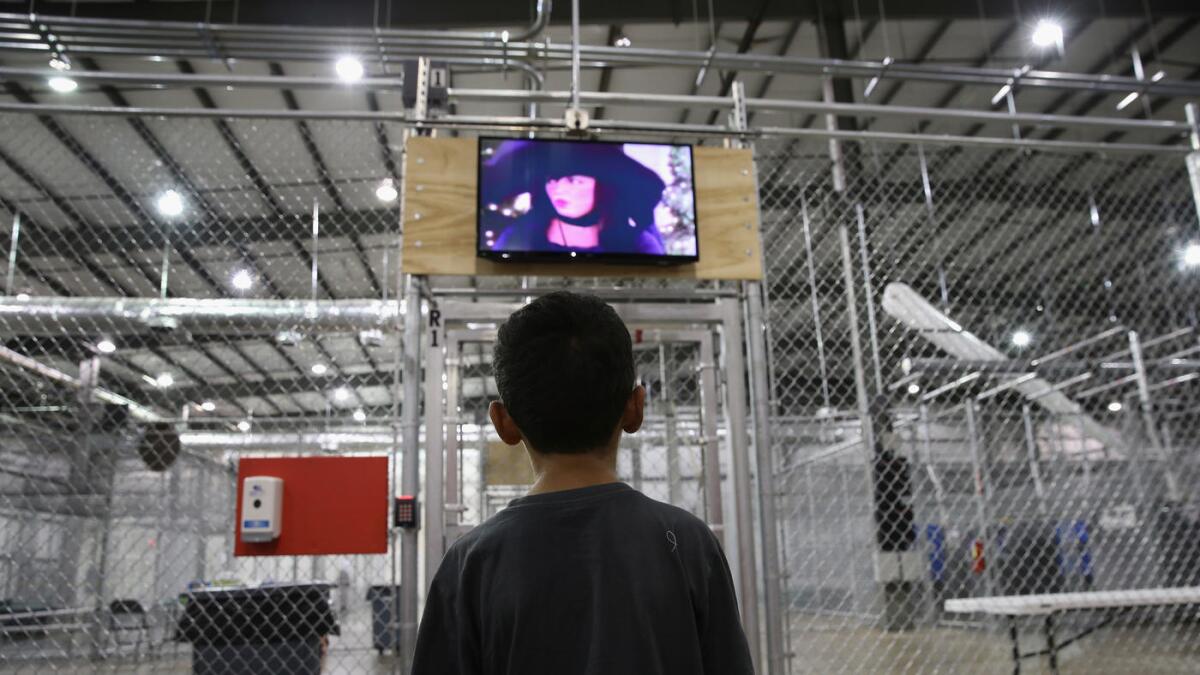
A state legislative bill seeking to expand legal services for immigrants in the U.S. illegally moved out of the Senate Judiciary Committee on Tuesday on a 5-2 vote. The bill, introduced by state Sen. Ben Hueso (D-San Diego), would create a legal defense program funded with state money that would provide lawyers for immigrants caught in deportation or removal proceedings.
It comes roughly three years after the Unaccompanied Undocumented Minors program began providing state-funded legal services for young refugees fleeing gang violence in Central America.
Hueso said the measure faced new urgency given President Trump’s executive orders last week on immigration.
“This is a bill protecting Californians, protecting their families, but also protecting California’s economic prominence,” Hueso said. “I hope we can all stand united on this and say, ‘Yes, we stand by our immigrant community in California.’”
Members of the committee raised concerns about whether it whittled away at defense services available for detainees convicted of certain crimes — and over how the state would be able to afford it amid a looming deficit and budget cuts from the federal government.
“It is well-meaning, but it is a whole different agency that we are setting up in an expedited way,” Sen. Bob Wieckowski (D-Fremont) said.
California assemblyman wants state to make cleaner purchases
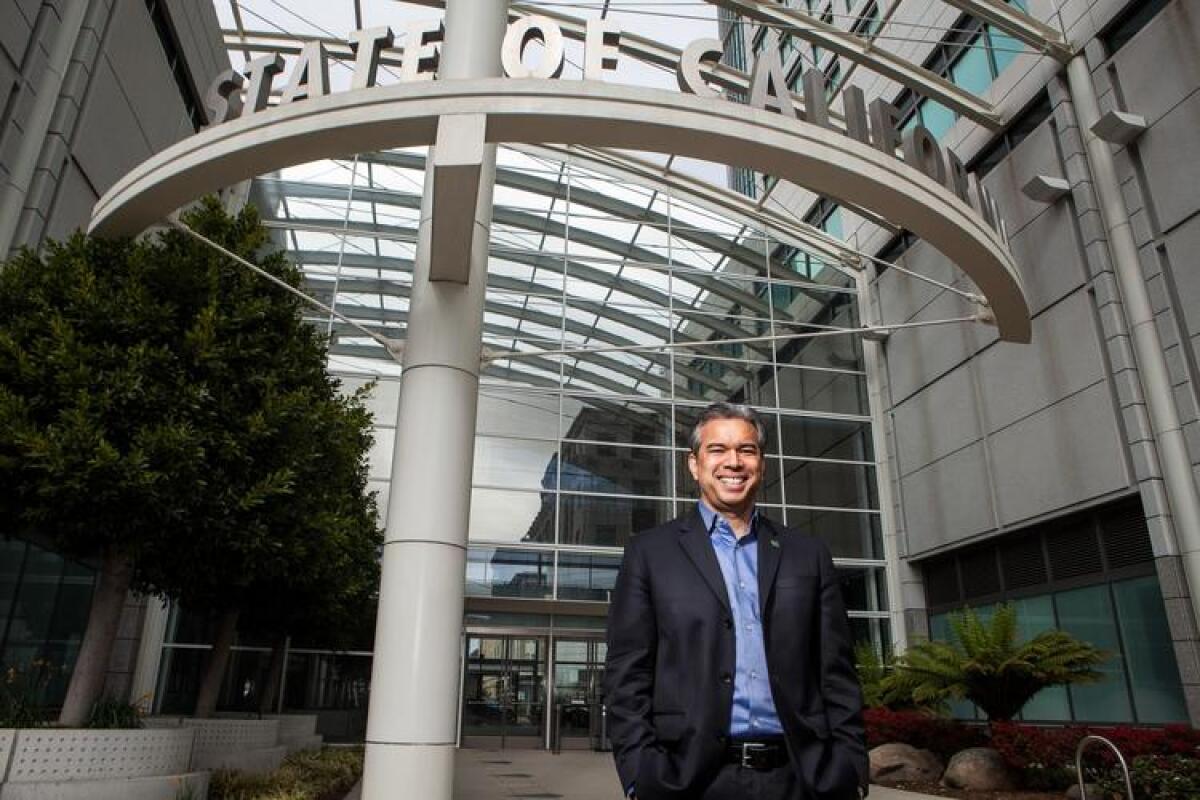
A California lawmaker wants state officials to consider greenhouse gas emissions when making new purchases, a proposal that would add a new wrinkle to the bidding process for government contracts.
Assemblyman Rob Bonta (D-Oakland) said the legislation (AB 262) would “harness the state’s enormous buying power to support clean manufacturing.”
The measure, which includes state agencies and university systems, would affect the purchase of materials such as asphalt, cement, steel and glass for projects such as hospitals, dormitories and roads.
Companies bidding on state contracts would be required to report greenhouse gas emissions generated by the manufacturing and transportation of supplies. Officials would then factor that information into their decision.
Given California’s goal of slashing emissions, Bonta said he hopes that the legislation “puts the state’s money where its values are.” He doesn’t expect the requirement to report more information would be a significant burden on companies seeking contracts.
“This will just be one more piece of information that will need to be added,” he said.
John Chiang rakes in $4.2 million for his gubernatorial campaign, keeps spending to a minimum
First of several immigrant protection bills clears state Senate Public Safety Committee

As national debate and protests have taken place over President Donald Trump’s executive actions on immigration and refugees, the state Senate Public Safety Committee on Tuesday passed the first of several bills aimed at protecting immigrants in California.
Senate Bill 54, introduced by Senate President pro Tem Kevin de León (D-Los Angeles), would prohibit state and local law enforcement agencies from using resources to investigate, detain, report or arrest persons for the purposes of immigration enforcement.
The proposal, dubbed the California Values Act, also aims to protect immigrants’ personal data, requiring state agencies to review their confidentiality policies and to ensure that they are only collecting information necessary to their departments.
It moved out of committee with a 5-2 vote.
The bill seeks to strengthen immigrant protections threatened under Trump’s executive actions. In orders signed last week, the president pledged to cut federal dollars from so-called sanctuary cities, which have policies limiting the cooperation between local law enforcement and federal immigration authorities.
At a committee hearing Tuesday, De León said the proposal builds on the California Trust Act, which Gov. Jerry Brown signed in October 2013. The state law prevents law enforcement agencies from detaining immigrants longer than necessary for minor crimes so that federal immigration authorities can take them into custody.
A long line of immigrant advocates, lawyers and lobbyists rose in support of the bill, saying it would continue to help law enforcement officials build trust within immigrant communities and allow more victims and witnesses to report crime.
Democratic members in the committee urged their Republican colleagues to vote for the legislation and move away from Trump’s rhetoric, which they said stereotyped immigrants as criminals. They pointed to low crime rates in immigrant communities and stressed that many police chiefs do not want to enforce immigration laws.
Nancy Skinner (D-Berkeley), chair of the committee, said people across California were under economic stress that could be manipulated into fear.
“All of us want hardened criminals prosecuted under the law,” she said. “All of us. But what we are watching now is a pitting of people against each other, a targeting of immigrants.”
Opponents were not swayed. They said the bill’s language was too broad and could prevent communication among police agencies at different levels of government, allowing dangerous criminals to escape prosecution.
“I’m concerned that you are basically making the state of California a de facto sanctuary state,’” Sen. Jeff Stone (R-Murrieta) told De León.
Sen. Kamala Harris to vote no on Trump’s pick to lead Education Department
State Senate committee weighs bill some say would turn California into a ‘sanctuary state’
California lawmakers seek stricter enforcement, more transparency at state toxics control agency
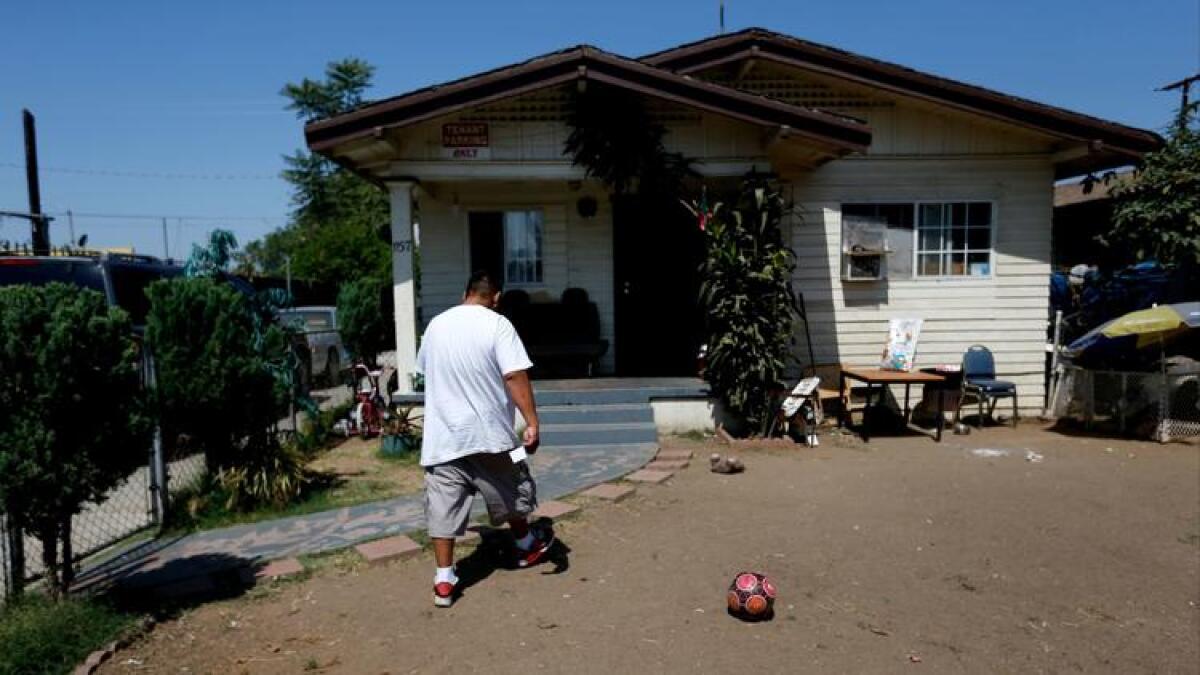
Assembly Democrats unveiled a package of five bills Tuesday aimed at reforming the state agency tasked with regulating toxic substances.
The Department of Toxic Substances Control has been roundly criticized for its flat-footed response in regulating and cleaning up pollution from the now-closed Exide battery recycling plant in Vernon.
A Los Angeles Times review in 2015 found the department knew for years that the plant was violating environmental regulations but was slow to act on it.
“Too many communities, including communities I represent, have been harmed by toxic emissions that were released into their neighborhoods — emissions that could and should have been stopped,” Speaker Anthony Rendon (D-Paramount) said in a statement. “The goal of this legislative package is a more transparent, accountable, and responsive Department of Toxic Substances Control — and safer and healthier communities throughout California.”
The proposed legislation includes:
- AB 245 by Assemblyman Jimmy Gomez (D-Los Angeles), which would require hazardous waste facilities to comply with higher financial assurance requirements to make sure there are adequate funds for contamination cleanup.
- AB 249 (Gomez), which would increase maximum penalties the department can assess to match what the federal government can assess in similar situations.
- AB 248 by Assemblywoman Eloise Gomez Reyes (D-San Bernardino), which would require hazardous waste facilities to submit permit renewals two years prior to the current permit’s expiration to avoid lapses.
- AB 246 by Assemblyman Miguel Santiago (D-Los Angeles), which would promote the use of fence line monitoring by facilities to better detect leaks.
- AB 247 by Assemblywoman Cristina Garcia (D-Bell Gardens), which would create a statewide task force focused on reducing lead poisoning in the state.
Sen. Dianne Feinstein says she will vote ‘no’ on Jeff Sessions’ nomination for U.S. attorney general
California Sen. Dianne Feinstein announced this morning that she will vote “no” on the nomination of Alabama Sen. Jeff Sessions for U.S. attorney general. The statement comes after protestors visited Feinstein’s home and office out of concern that she may vote in favor of the nomination.
“It is very difficult to reconcile for me the independence and objectivity necessary for the position of attorney general with the partisanship this nominee has demonstrated,” Feinstein said Tuesday. “We are being asked to determine whether this nominee’s record demonstrates that he will have the objectivity to enforce the law for all Americans and be an independent attorney general and not an arm of the White House.”
Feinstein is the ranking Democrat on the Senate Judiciary Committee, which votes today on the confirmation of Sessions to be President Trump’s attorney general.
Feinstein pointed to former acting U.S. Atty. Gen. Sally Yates as an example of what she is looking for. Yates was fired Monday, just hours after she announced that the Justice Department would not defend Trump’s controversial executive order banning refugees and travelers from certain countries.
“Yesterday, early in the evening, we clearly saw what a truly independent attorney general does…I have no confidence that Senator Sessions will do that,” Feinstein said. “Instead, he has been the fiercest, most dedicated, and most loyal promoter in Congress of the Trump agenda, and has played a critical role as the clearinghouse for policy and philosophy to undergird the implementation of that agenda.”
Protesters descend on Sen. Dianne Feinstein’s home and office to urge ‘no’ vote on Sessions appointment
Dozens of protesters concerned that Sen. Dianne Feinstein could vote to confirm Sen. Jeff Sessions as U.S. attorney general gathered Monday evening outside her office in Santa Monica.
Several held signs bearing the familiar “No Ban, No Wall” slogan that Trump protesters have used in recent days. Others chanted, “Hey, Feinstein, hear us shout, if you don’t we’ll vote you out!”
Organizer Hannah Allison with Democratic Socialists for America said her group pulled together the protest over the last couple days. Word about the protest spread late Monday through social media, with many others pledging to call Feinstein’s offices to register opposition to Sessions’ appointment.
“People are so absolutely outraged about Sessions and they don’t want to see a racist attorney general,” Allison said.
Wesley Taylor, 30, said he heard about the protest through word of mouth.
“I came out here to make certain that she votes no,” said Taylor, an actor.
The protest follows similar action over the weekend, when an estimated 200 protesters showed up at a park next to Feinstein’s San Francisco home, urging her to vote against Sessions. Organizers of that protest told the San Francisco Chronicle that they were responding to what they felt was unresponsiveness from Feinstein’s office.
The Senate Judiciary Committee, on which Feinstein sits as the senior Democrat, is expected to vote Tuesday on Trump’s appointment of Sessions. So far, Feinstein has voted with other Democrats to support Nikki Haley for the post of U.N. ambassador, James Mattis for secretary of Defense, Mike Pompeo as CIA director and John Kelly for secretary of Homeland Security.
Feinstein’s office did not immediately respond to a request for comment.
Where do California’s members of Congress stand on President Trump’s refugee order?

President Trump’s executive order Friday, which blocked U.S. entry to refugees and nationals of seven Muslim-majority nations, brought thousands of Americans to the nation’s airports in protest over the weekend.
Several Democrats from California’s 54-member congressional delegation joined constituents at airports, and lobbied customs and Border Patrol officials to release the detained visa holders. Many of the state’s 14 Republican representatives were initially silent on the executive order. Several have since voiced their support, while others were critical of the order’s rollout.
Here’s a look at what each member of the California congressional delegation has said about the executive order:
California state Senate passes resolution condemning President Trump’s refugee ban

After nearly two hours of debate, the state Senate on Monday passed a resolution that condemned President Trump’s executive order banning immigrants and refugees from seven predominantly Muslim countries, calling it “discriminatory overreach.”
Democrats introduced the resolution after the president’s order Friday spurred a weekend of protests and chaos at airports across the country. The resolution denounces Trump’s actions and urges the U.S. Department of Homeland Security to comply with federal court orders permitting detainees to have timely access to counsel.
It cleared the Senate floor with a 26-11 vote largely along party lines, reflecting the national rift over Trump’s immigration order. Two Republican members abstained.
On the Senate floor, Democrats called the executive order an affront on religious freedom that panders to fear and foments discrimination, and said it would not further public safety. Reaching to members across the aisle, they said the resolution was not about partisanship or opposing Trump, but about protecting American institutions.
In a fiery speech, state Sen. Hannah-Beth Jackson (D-Santa Barbara) said the order is unconstitutional and violates fundamental rights.
“You see this is how we end up with fascism and totalitarianism,” she said.
Sen. Holly Mitchell (D-Los Angeles) said she did not want four more years of executive orders “crafted in the cover of darkness.”
But Republican members said that President Obama had taken similar actions and that they had a duty to their constituents, who were worried about national security and a vetting process they said did not stop terrorists from entering the nation’s borders. Obama has rejected comparisons of his policy to Trump’s.
“We do not welcome those who have come here to harm us,” Sen. Jim Nielsen (R-Gerber) said, urging a “no” vote. “We cannot ignore contemporary reality. Our enemies do not reside beyond our shores. They are within.”
The resolution states that 134 million people are temporarily barred from entering or reentering the United States, including nationals with dual citizenship. Hundreds of thousands with visas are also blocked, it says.
The resolution also denounces the manner in which the executive order was executed, saying it was not fully vetted by the departments tasked with protecting the nation’s national security interests.
State attorneys general met in Florida to strategize on how to counter Trump, Becerra says
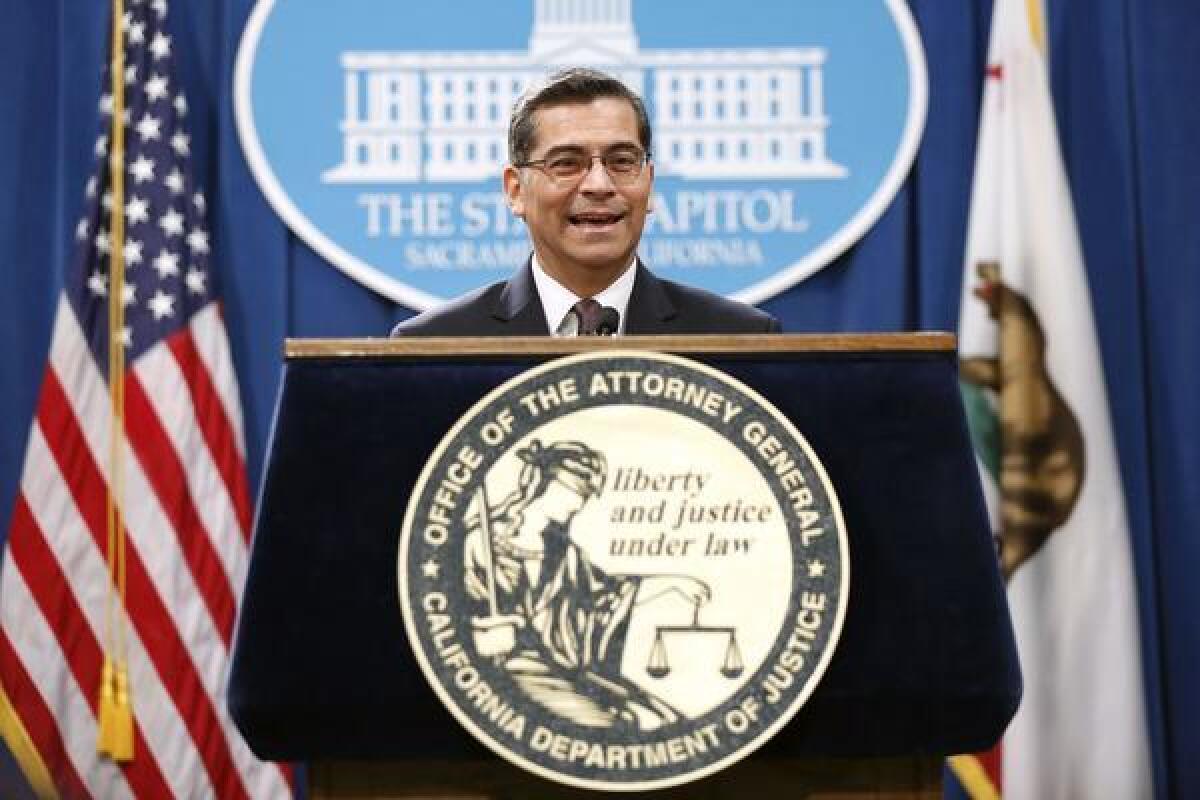
A joint statement by 15 attorneys general over the weekend condemning President Trump’s refugee order grew out of a meeting in Florida between California Atty. Gen. Xavier Becerra and some of his concerned counterparts, Becerra said Monday.
Becerra gathered Thursday in Fort Lauderdale with other attorneys general, including Washington Atty. Gen. Bob Ferguson, to strategize about responding to the Trump administration on various issues.
The meeting took place at the annual winter conference of the Democratic Attorneys General Assn.
“Several of the AGs have been in communication,” Becerra said in an interview with The Times. “We made it very clear in our joint statement that we are going to do everything we can to make sure that the unlawful, unconstitutional executive orders by the Trump administration don’t see the light of day.”
Officials who signed the joint statement included legal representatives from Washington, Connecticut, Hawaii, Illinois, Iowa, Maine, Maryland, Massachusetts, New Mexico, New York, Oregon, Pennsylvania, Vermont and Virginia.
On Monday, Ferguson announced he was suing Trump over the executive order that suspended refugee entries for 120 days and barred entry to the U.S. for 90 days for those traveling from Iran, Iraq, Libya, Somalia, Sudan, Syria and Yemen.
Becerra said that he had been in contact with Ferguson and that the option to pursue legal action is under consideration for California.
“That’s one of many avenues of how we are looking to approach this,” Becerra said.
As a result of the Florida meeting, Becerra said, the top lawyers from the 15 states are collaborating on how to address various Trump directives.
“Everyone is doing a little bit of something,” he said. “Everyone’s trying to figure out how best to address this.”
Florida Atty. Gen. Pam Bondi, a Republican, did not attend the meeting, Becerra said.
California congressional Democrats protest against Trump’s travel ban from steps of Supreme Court
State senators debate resolution opposing Trump’s immigration actions
California warily watches President Trump while pushing forward on climate change

It’s been a decade since California set its first target for slashing greenhouse gas emissions, one of several policies that has made the state an international leader in the fight against global warming.
So while President Trump suggests he’s going to roll back the country’s environmental regulations, state leaders insist they won’t be knocked off track here.
“This is when you do your best work,” said John Laird, secretary of the California Natural Resources Agency. “We can’t worry about pulling back just to sink with everyone else who isn’t moving at all.”
Rep. Pete Aguilar slams White House for invoking San Bernardino attack in defending immigration ban
Rep. Pete Aguilar (D-Redlands) is getting frustrated with President Trump and his staff mentioning the 2015 San Bernardino shooting to defend an executive order banning refugees and others from seven predominantly Muslim countries.
“This executive order will do nothing to make our country safer and only sends a message of hate and bigotry to the rest of the world,” Aguilar, who represents the district where the site of the shooting is located, said in a statement. “This order would not have prevented the attack in San Bernardino and the use of San Bernardino as justification for this anti-Muslim policy is a revolting way to exploit our community.”
Fourteen Californians were killed in the December 2015 attack by Syed Rizwan Farook, an American, and his wife Tashfeen Malik, who was raised in Pakistan and lived in Saudi Arabia before marrying him.
People from Pakistan and Saudi Arabia are not affected by Trump’s order, which bars all refugee entries for 120 days, blocks Syrian refugees indefinitely and bars for 90 days the entry of citizens from Iraq, Iran, Syria, Yemen, Sudan, Libya and Somalia.
Rep. Duncan Hunter urges Trump to make an executive order exemption for Iraqis who aided U.S. military
Reps. Duncan Hunter (R-Alpine) and Adam Kinzinger (R-Ill.) are asking President Trump to approve waivers to his executive order for Iraqis who helped the American military.
Hunter and Kinzinger, who both served in Iraq and Afghanistan, said in the letter to Trump that they supported a request from Defense Secretary James N. Mattis that visa reviews for some Iraqis be fast-tracked.
“For the safety of these courageous individuals and their families, and in the interest of our national security, it’s critical that we make this exception and do so swiftly,” the congressmen said in a statement.
The executive order Trump signed Friday bars all refugee entries for 120 days, blocks Syrian refugees indefinitely and bars for 90 days the entry of citizens from Iraq, Iran, Syria, Yemen, Sudan, Libya and Somalia.
Some of the earliest stories of people caught up in the ban included military interpreters from Iraq who had visas.
“We respectfully ask that you take this action to ensure these individuals are not put in any further danger. Doing so would send a strong signal to those who show such immense courage to advance U.S. security interests at a risk to their own safety, as well as the many veterans and warfighters who’ve relied on the service of these individuals for their own protection and to accomplish their objectives,” their letter states.
Democrats target 7 congressional seats held by California Republicans for 2018 midterm elections

The Democratic Congressional Campaign Committee has released a list of top targets looking ahead to the 2018 elections, and California’s Republican delegation is a big part of it.
Of the 61 Republicans Democrats are looking to unseat nationwide, seven are Californians:
- CA-10: Jeff Denham (R-Turlock)
- CA-21: David Valadao (R-Hanford)
- CA-25: Steve Knight (R-Palmdale)
- CA-39: Ed Royce (R-Fullerton)
- CA-45: Mimi Walters (R-Irvine)
- CA-48: Dana Rohrabacher (R-Costa Mesa)
- CA-49: Darrell Issa (R-Vista)
All of these lawmakers represent districts carried by Hillary Clinton in the general election, with Valadao’s district voting for Clinton over Trump by double-digit margins. Many of them seemed to win despite Trump in 2016, out-polling him by at least several percentage points.
Issa and Denham won by the closest margins of the group, with Issa eking out a 51-49 win over Doug Applegate, who has already said he’ll run again in 2018. Denham overcame two-time challenger Michael Eggman by less than five percentage points.
Denham, Issa and Valadao were also among the top spenders in California on a per-vote basis in the November election, spending well above $30 per each vote they received.
In a memo, the Democratic committee noted Trump’s low approval ratings and the fact that few presidents in history have seen their party gain seats in Congress during the first midterm elections.
Democrats in the California Legislature move to condemn President Trump’s immigration orders
Assembly Republican leader Chad Mayes voices his misgivings about refugee order
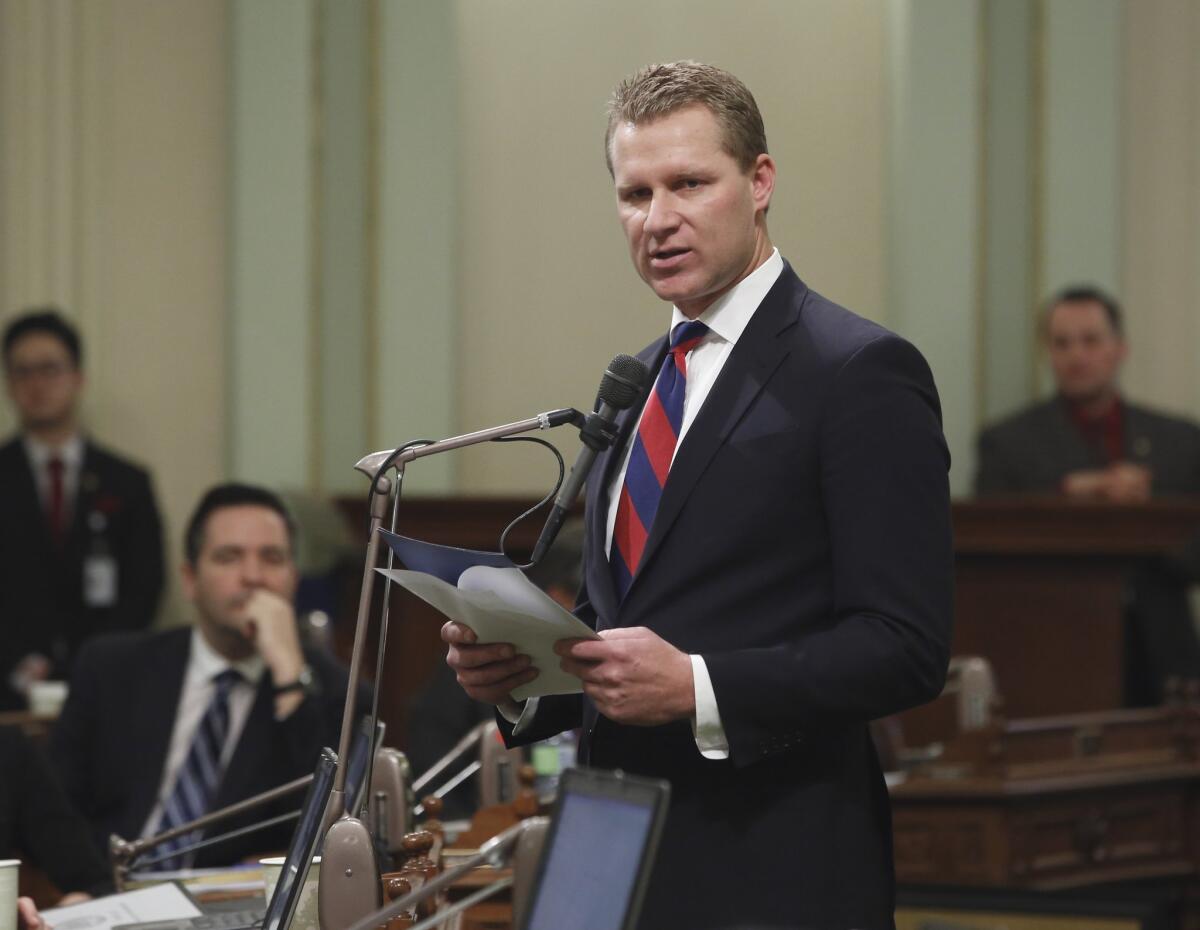
Assembly Republican Leader Chad Mayes of Yucca Valley on Monday joined a number of GOP politicians who are voicing misgivings about President Trump’s order temporarily barring refugees from some majority-Muslim countries from entering the country.
“Religious liberty is a core value of our nation. My ancestors immigrated to America to flee religious persecution,” Mayes said in a statement. “While bolstering our national security is important, when forced to decide between security and liberty, I will always side with liberty.”
“He is concerned about them [the orders],” said Matt Mahon, a spokesman for the assemblyman.
Trump’s directives suspended refugee entries for 120 days and barred entry to the U.S. for 90 days for those traveling from Iran, Iraq, Libya, Somalia, Sudan, Syria and Yemen.
Rep. Zoe Lofgren and other ranking Democrats demand emergency meeting on refugee ban
After two days of protests across the country over President Trump’s order Friday banning refugees from seven countries, Rep. Zoe Lofgren (D-San Jose) and the ranking Democrats of three committees that oversee immigration issues are demanding a meeting with President Trump’s new Homeland Security secretary, John F. Kelly.
The move by Trump prevented green card and visa holders from reentering the country, and led to the detention of more than a hundred people landing at U.S. airports with valid entry documents. Late Saturday, a federal judge in New York issued a temporary stay against the deportation of anyone who had arrived with a valid visa.
The letter demanding the meeting, signed by Lofgren, Judiciary Committee ranking member John Conyers (D-Mich.), Homeland Security Committee ranking member Bennie Thompson (D-Miss.) and Foreign Affairs Committee ranking member Elliot Engel (D-N.Y.), calls for it be scheduled by the close of business Wednesday. The Democrats also ask for more information about how the order is being implemented, whether the stays placed by federal judges over the weekend are being followed and whether green card holders are affected.
“Only two days after the order was signed it is clear that it has already led to panic and disorder, not to mention protests,” the letter states. “This is apparently due in part to the lack of internal administration review prior to its issuance as well as a lack of clarity and guidance provided thereafter.”
Lofgren, a former immigration attorney and the ranking Democrat on the Judiciary Committee’s Immigration Subcommittee, also plans to file legislation today to rescind the executive order. Getting such legislation through the House could be difficult with Speaker Paul Ryan supporting the executive order. Sen. Dianne Feinstein (D-Calif.) is proposing similar legislation in the Senate.
House and Senate Democrats plan to hold a rally against the order outside the Supreme Court Monday evening.
As California Democrats blast Trump’s refugee order, Republicans in the congressional delegation hold their fire
Only a few of the state’s 14 Republican representatives have publicly commented on an executive order signed by President Trump on Friday that barred refugees and green card holders from seven countries from entering the U.S.
Rep. Devin Nunes (R-Tulare) released a statement Sunday night saying some tweaks are needed, but his background as chairman of the House Select Intelligence Committee leads him to support the executive order.
“In light of attempts by jihadist groups to infiltrate fighters into refugee flows to the West, along with Europe’s tragic experience coping with this problem, the Trump administration’s executive order on refugees is a common-sense security measure to prevent terror attacks on the homeland. While accommodations should be made for green card holders and those who’ve assisted the U.S. armed forces, this is a useful temporary measure on seven nations of concern until we can verify who is entering the United States,” he said.
Rep. Ed Royce (R-Fullerton) told the Washington Post that “pausing the intake of refugees from terror hotspots is the right call to keep America safe,” but he hopes the cases of people traveling on visas who were prevented from reentering the country are resolved quickly.
Rep. Jeff Denham (R-Turlock) said on Twitter on Sunday that the rollout has created confusion, and that executive orders aren’t the way to fix the country’s long-term problems.
Several of California’s 38 Democratic congressional representatives and the state’s two senators were out in force over the weekend demanding the release of refugees and green card holders, and an end to the executive order.
Sen. Dianne Feinstein (D-Calif.) announced two pieces of legislation she’ll file in response. One would immediately rescind the president’s order. The second would limit executive authority under the Immigration and Nationality Act to prevent a president from unilaterally banning groups of immigrants.
“It’s clear that the president gave little consideration to the chaos and heartbreak that would result from this order,” she said in a statement.
Sen. Kamala Harris (D-Calif.) joined protesters outside the White House Sunday afternoon.
In Los Angeles, Reps. Maxine Waters (D-Los Angeles) and Ted Lieu (D-Torrance) joined protesters at Los Angeles International Airport. On Saturday, Reps. Judy Chu (D-Monterey Park), Nanette Barragán (D-San Pedro) and Lou Correa (D-Santa Ana) joined the initial protests at the airport, and worked to get some of those being held released.
Rep. Eric Swalwell (D-Dublin) accompanied protesters at San Francisco International Airport Sunday.
2:31 p.m. Jan. 30: This post was updated to clarify Rep. Ed Royce’s statement about the executive order. It was originally published Jan. 29.
Protests beginning at LAX Sunday morning
California Sen. Kamala Harris joins protesters outside the White House
State Atty. Gen. Xavier Becerra condemns Trump’s refugee order and explores challenge
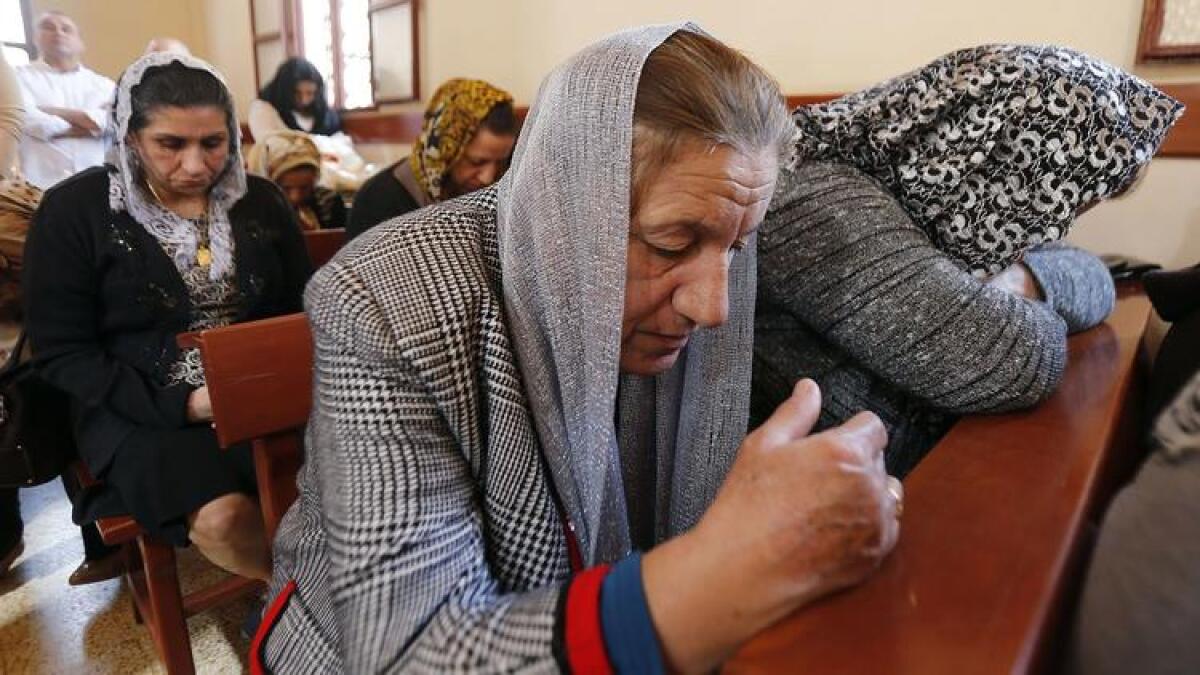
California state Atty. Gen. Xavier Becerra on Saturday condemned an executive order by President Donald Trump barring people from some Muslim-majority countries from entering the U.S. and said he is consulting with legal advisors over a way to challenge the directive.
Trump has suspended all refugee entries for 120 days and barred entry to the U.S. for 90 days for those traveling from Iran, Iraq, Libya, Somalia, Sudan, Syria and Yemen.
“Justice in America doesn’t live or die on the stroke of one man’s pen regardless of how high his office,” Becerra said in a statement late Saturday, less than a week after taking office. “The Trump Administration’s anti-religion, anti-refugee executive order is in so many ways unjust and anti-American”
He said the order discriminates against people based on their faith and denies entry to those with fears of death and persecution.
“I have conferred with my team, and we are reaching out to others as well, to find every avenue possible to defend our family members and those who live permanently in our communities who may be barred from re-entry into America,” Becerra said.
“The Trump executive order should not stand and must be confronted as a constitutional overreach,” he added.
California Politics Podcast: Reactions to President Trump’s first week
Even before the weekend controversy and protests, California’s top elected officials spent much of the last week reacting to the first moves by President Donald Trump.
On this week’s California Politics Podcast, we take a closer look at the sharp words offered by Gov. Jerry Brown in his State of the State speech when it comes to the new politics of Washington.
We also focus much of this week’s discussion around three big topics that caught the attention of a number of California lawmakers: immigration moves by Trump; the rough week that was for the nation’s environmental protection enforcers; and rekindled but unproven allegations of widespread voter fraud.
I’m joined by Marisa Lagos of KQED News and Anthony York of the Grizzly Bear Project.
State Atty. Gen. Xavier Becerra: Trump’s executive order ‘must be confronted as a constitutional overreach’
California Reps. Nanette Barragán and Judy Chu show up at LAX amid protests against Trump’s refugee ban
Democratic legislators to join LAX protest of immigration ban
Gov. Jerry Brown will undergo new round of treatment for prostate cancer, but won’t miss any work
Gov. Jerry Brown, who first was diagnosed with prostate cancer in 2012, will begin a new round of treatment for the disease, his office reported on Saturday.
Brown, 78, will maintain his duties as governor during the treatment, according to his staff. No additional details were provided about how long the treatment will take, or what prompted its timing.
“Fortunately this is not extensive disease, can be readily treated with a short course of radiotherapy, and there are not expected to be any significant side effects,” said Dr. Eric Small, a UC San Francisco oncologist, in an emailed statement provided to reporters. “The prognosis for Gov. Brown is excellent.”
Brown initially learned he had prostate cancer in late 2012 and underwent similar treatment for several weeks. The governor has also been treated for basal cell carcinoma — a type of skin cancer — twice in the past nine years, with reconstructive surgery on the right side of his nose in 2011.
With almost two years remaining on his final term in office, Brown is already the oldest governor in California history. He often made a point of pointing out his physical fitness in his return to the job in 2011, including a 2012 challenge to New Jersey Gov. Chris Christie of “a 3-mile race, a push-up contest and a chin-up contest.”
Though he’s been treated in San Francisco, the governor and First Lady Anne Gust Brown now live full-time in the historic governor’s mansion in Sacramento after moving out of Oakland last year.
‘This is a Muslim ban’: Kamala Harris, Nancy Pelosi and Dianne Feinstein rail against Trump’s refugee ban
They were joined by multiple other California Democrats, who almost immediately reacted to President Trump’s order to temporarily ban most refugees from entering the U.S.
Latest candidate in race to replace Becerra helped run his father’s long-shot 2016 presidential campaign
Ricardo De La Fuente, the son of a long-shot presidential candidate who ran as both a Democrat and an independent in 2016, says he will now run for Congress in Los Angeles’ 34th Congressional District.
De La Fuente, 27, was born and raised in San Diego and says he helps run his family’s real estate and business empire, which was started by his grandfather. He says he is also involved with solar energy start-up companies.
De La Fuente most recently served as campaign director for the failed presidential and U.S. Senate bids of his father, Roque “Rocky” De La Fuente, and says he will step away from the family business to run full time for Congress. He recently moved to downtown Los Angeles.
“I want to serve my community, and I think it’s about time my generation jumps in the political realm and gets involved,” the younger De La Fuente said. His father appeared on Democratic presidential primary ballots in at least two dozen states last year and ran as a Democratic candidate for U.S. Senate in Florida, earning 5.4% of the primary vote.
The elder De La Fuente then ran as an independent in the general presidential election, filing for recounts in Wisconsin and Nevada, where he received 1,500 and 2,500 votes, respectively.
Ricardo De La Fuente is one of at least 19 candidates vying for this seat. Candidates have until Feb. 9 to turn in papers with the L.A. County registrar to qualify for the April 4 special primary ballot. If no candidate receives more than 50% of the vote, a runoff will be held June 6.
Hundreds rally against Obamacare repeal at Rep. Kevin McCarthy’s office
House Majority Leader Kevin McCarthy’s Bakersfield-based district has been a flashpoint in the debate over how to overhaul healthcare in recent weeks.
Atty. Gen. Xavier Becerra takes a jab at the Trump administration when asked about the battles to come
Proposed law would make penalties for using fake immigration papers the same as those for using fake driver’s license
A proposed California law seeks to ensure that a person who uses false documents to conceal their citizenship status faces the same punishment as a person who uses a fake driver’s license.
The legislation by Assemblyman Raul Bocanegra (D-Pacoima) would amend the penal code to make both crimes “wobblers,”
meaning prosecutors would have the discretion to charge suspects in such cases with either felony offenses or lower-level misdemeanors.
Under the proposal, the repercussions for defendants would be the same: If convicted of a misdemeanor, offenders would have to serve up to one year in county jail, while a felony conviction would mean up to 16 months in county jail, or two or three years in prison.
A spokesman for Bocangera said the measure was introduced as a proactive response to President Trump’s hard-line stance on immigration and would reverse part of Proposition 187, a controversial ballot measure to deny public services, such as education and healthcare, to immigrants in the country illegally.
The proposition, approved by voters in 1994, requires any person who uses false immigration records to face felony charges. Bocangera’s bill amending those provisions would need a two-thirds vote in the Assembly and the state Senate to pass.
“Today, if an underage college student uses a fake ID to purchase a six-pack of beer, he or she can be charged with a misdemeanor,” Bocanegra said in a statement. “However, if an immigrant is caught using that same fake ID, he or she is automatically charged with a felony and is subject to five years in prison. This is fundamentally unfair.”
Fearing catastrophe, California’s Gov. Jerry Brown wants the world’s leaders to stop ‘goofing off’
Gov. Jerry Brown pointedly criticized world leaders for “goofing off” instead of addressing looming problems with climate change and nuclear weapons during a radio interview on Friday.
“They’re really averting their gaze,” he said. “And that is dangerous, very dangerous.”
Brown has become increasingly outspoken about issues he describes as existential threats to humanity, and the election of Donald Trump has only made him more concerned. During the interview, he spoke in sweeping terms about the need to support scientific research in the face of political denial.
“Darkness cannot totally extinguish the light,” Brown said while criticizing Republicans for refusing to accept the scientific consensus around climate change and the need for dramatic changes to confront global warming.
At another point, Brown mused that humans have accumulated vast power without a corresponding increase in wisdom. That creates “a gap between the power to destroy and the wisdom to control those destructive forces.”
Brown reiterated his plan to push forward California’s policies on climate change even if Trump follows through on the federal government’s plans.
“We’re going to do everything we can to stay on track,” he said.
Some California lawmakers say it’s time to expand how the state defines ‘violent crime’
As California undergoes the largest overhaul of prison parole in a generation, some lawmakers and law enforcement officials say it’s time to revisit how the state legally defines a “violent crime.”
Gov. Jerry Brown’s Proposition 57, which voters overwhelmingly approved in November, continues a statewide effort to increase rehabilitation services and decrease the prison population. Among its provisions, the initiative gives the state parole board greater latitude to consider the early release of prisoners who have served their primary sentences, and whose crimes are not designated as “violent” under the California penal code.
But since the early days of the ballot measure campaign, debate has brewed over just who the law will benefit, with prosecutors saying that short and porous list excludes certain rape crimes and other dangerous offenses. This legislative session, the discussion moves to the Capitol.
Fearing deletion, Tom Steyer copies Environmental Protection Agency website on climate change

With President Trump in the White House, information about climate change has been disappearing from government websites.
Some fear the same thing could happen with the Environmental Protection Agency. Now the advocacy organization run by environmentalist and political donor Tom Steyer is taking steps to preserve the information.
NextGen Climate copied the website and made it available at SaveOurEPA.com.
“As Americans, we will not allow Donald Trump to erase the truth or rewrite history,” Steyer said in a statement. “This information belongs to the people, and the public has a right to know the truth.”
Trump has taken other steps that have alarmed environmentalists. For example, he greenlighted two oil pipelines that had been stopped by former President Obama.
For California, a return to center stage in the 2020 presidential contest

Kamala Harris hadn’t even arrived in Washington to take up her job as California’s spanking-new U.S. senator when the chatter began: Kamala for president!
Never mind her disavowals — “Seriously?” — or the fact that the first balloting of the 2020 race is, at a minimum, 1,000-plus days away. The soul-sapping election of Donald Trump has Democrats desperately looking far, far down the road.
“Usually the candidates start sending signals,” said Jim Demers, a longtime party strategist in New Hampshire, the state that traditionally holds the first presidential primary. “This time I’m hearing activists begging for the race to begin.”
With a wide-open contest (read: not a Clinton or Obama in sight), the list of would-be contenders, real and imagined, is lengthy, even by the prodigious standards of this early stage.
What’s different in 2020 is that California — huge in population, mighty in economic power, desperate to matter in presidential politics — figures to be at the center of speculation in a way it hasn’t for a generation.
There’s a major fight on the way over Trump’s plans for ‘sanctuary cities’
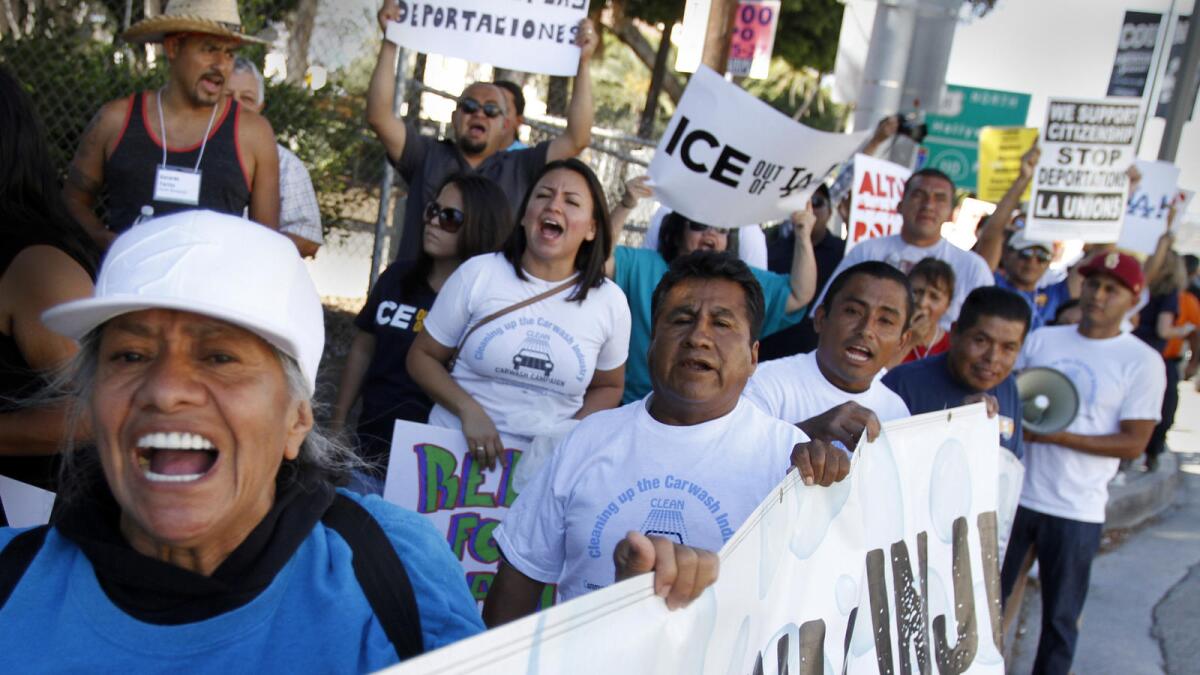
Cities in California are gearing up for a legal fight against President Trump’s plans to take away federal dollars from so-called sanctuary cities.
These cities typically are defined as those that don’t cooperate with federal immigration officials for deportation purposes, and the new president wants to strip them of funding unless they start doing so.
But the language in Trump’s executive order on the issue is vague, and San Francisco officials believe their city is already exempt from the mandate.
Fighting Trump’s border wall on environmental grounds probably won’t win in court
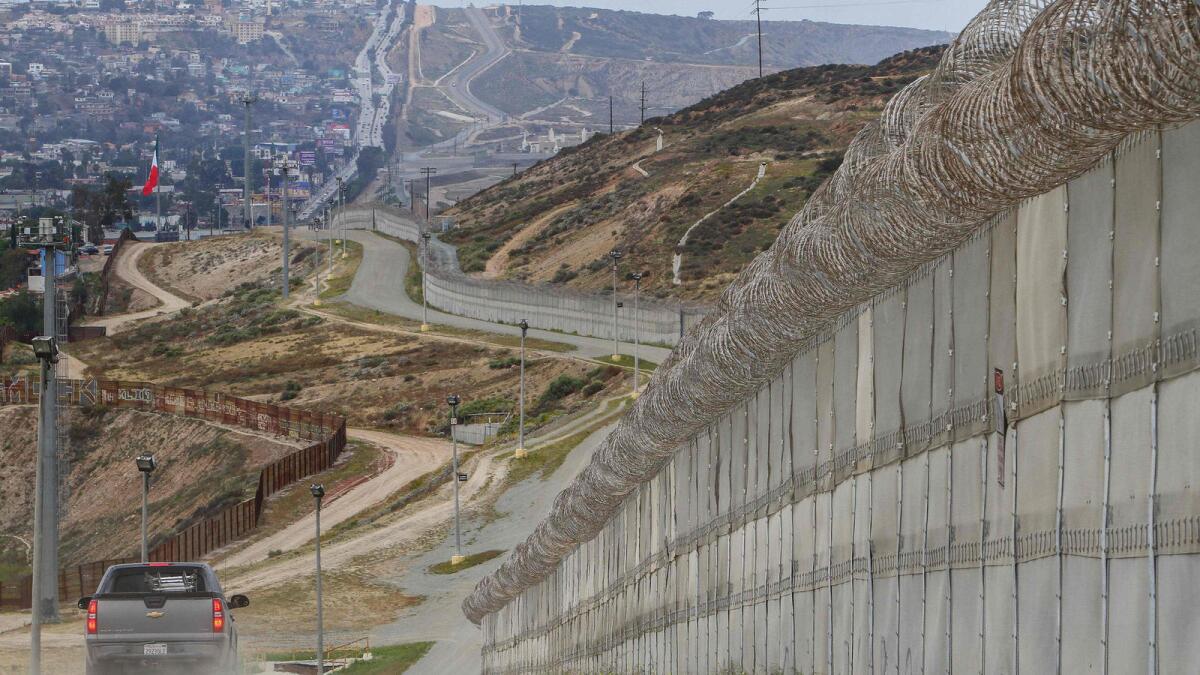
California political leaders are seeking all sorts of strategies to fight President Trump’s plans to build a wall along the border with Mexico.
One strategy that’s likely to fail is a lawsuit based on state and federal environmental laws, legal experts said.
Congress already has given the federal government broad authority to waive environmental laws to build a border fence and the courts have upheld that power.
‘Calexit’ organizers can now start collecting signatures to get California secession on the ballot
Supporters of the campaign for California to secede from the United States can now begin collecting the hundreds of thousands of signatures they need to get a proposed “Calexit” initiative on the ballot.
California Secretary of State Alex Padilla cleared the proposed initiative to begin collecting signatures on Thursday.
If the measure gets on the ballot and gains approval by a majority of voters, it would repeal clauses in the California Constitution stating that the state is an “inseparable part of the United States” and that the U.S. Constitution is the “supreme law of the land,” according to the title and summary prepared by the state attorney general’s office.
The measure would place another question on the ballot in 2019, asking whether California should become a separate country. If at least half of registered voters participate in that vote, with at least 55% of those voting to approve, the results would be treated as California’s declaration of independence.
The current measure’s fiscal effect is “dependent on various factors,” writes the state’s nonpartisan legislative analyst, and if it succeeds would result in “major, but unknown budgetary impacts.”
The proposal’s backers, known as Yes California, have argued that the state is culturally out of step with the rest of the U.S. and that California pays more money to the federal government than it receives in spending. The election of President Trump has only strengthened their argument, they say.
“California loses [by] being a part of America culturally and financially,” said Marcus Ruiz Evans, one of the group’s founders. “It could be a nation all its own, everybody knows that. The only question is if they want to break off.”
It’s unclear how the group will collect the required 585,407 valid signatures from registered voters over the next 180 days to qualify for the ballot.
A campaign committee, Yes California Independence Committee, has raised no funds so far, according to records from the secretary of state. But Evans says that his group has more than 7,000 volunteers (significantly down from a 13,000 estimate in December) ready to gather signatures and that voters can expect to see signature gatherers on the streets in the next couple of days.
Yes California says that even if the proposed initiative does land on the ballot and voters approve it, such an unprecedented move to secede would need to receive approval of at least a majority of the states in the union, among other legal hurdles.
Evans says he’s not fazed.
“America already hates California, and America votes on emotions,” he said. “I think we’d have the votes today if we held it.”
UPDATE
7:01 p.m.: This post has been updated to clarify that the proposed initiative would place a future vote on California’s secession on the ballot in 2019.
Rep. Ted Lieu is trolling Donald Trump, and he hopes you’re watching
Rep. Ted Lieu is now placing an asterisk next to President Trump’s name in news releases.
It’s the Torrance Democrat’s way of drawing attention to his concerns about the new administration, he said.
“Sometimes the best way to respond to crazy is with satire,” Lieu said. “Never before have I had this feeling where our leader is potentially unhinged and has a problem with the truth, and that is highly disturbing for the leader of the free world. So I’ve decided I’m just going to point that out as much as I can.”
The asterisk leads readers to the bottom of the email, where a postscript says:
“ ***In addition to losing the popular vote, Trump — as of January 20, 2017 — is in violation of the Emoluments Clause set forth in Article I, Section 9 of the U.S. Constitution due to massive conflicts of interests and his refusal to put his global business holdings in blind trusts. Trump also benefitted from Vladimir Putin ordering a multifaceted and brazen Russian influence and cyber hacking campaign with the goals of undermining faith in the U.S. democratic process, denigrating Secretary Clinton’s electability, and helping Trump’s election chances. Trump and his press secretary also routinely make stuff up.”
The sophomore congressman said he initially planned to give Trump the benefit of the doubt, hoping his rhetoric was a campaign tactic and that he would pivot to uniting the country following the election. Then Lieu listened to the president’s inaugural speech.
“I was hoping he would govern different than how he campaigned,” he said. “I came to the conclusion that it would be worse for America to normalize him.”
Lieu followed the addition to his news releases with a “Cloud of Illegitimacy Clock” that counts the time since Trump’s swearing-in, which is how long Lieu says Trump has been in violation of the Constitution by not divesting from his businesses or putting them in a blind trust. The Constitution bans government officials from receiving gifts or payments from foreign governments.
Next he posted a series of tweets mocking White House spokesman Sean Spicer for giving incorrect figures on how many people attended the inauguration, and top Trump aide Kellyanne Conway for using the term “alternative facts.”
“I’ve decided that the administration using ‘alternative facts’ is more profane than anything that I could say,” he said. “When the administration lies, they just need to be called out on that. If they are going to lie about stupid little things, like crowd size, imagine what they’re going to say when they roll out their healthcare plan, whenever that might be.”
Lieu has needled Trump in responses to several executive orders this week, including by saying he would bet a “nice bottle of California wine that the Administration will be unable to find a credible witness to testify under oath to the allegation that 3-5 million people illegally cast votes in 2016,” and by mentioning the inauguration crowd while talking about Trump’s proposed border wall.
Lieu said he’s “absolutely” hoping Trump will respond.
“I think satire is an effective way to highlight issues, and I want the American people to see who this president really is, because in 22 months they get to vote again on every member of Congress, and that will be a referendum on Donald Trump,” Lieu said.
California Democrats propose adding third, nonbinary gender option for driver’s licenses and other official documents
California driver’s licenses and birth certificates could have a third option for gender in addition to male or female under legislation unveiled Thursday by Democratic lawmakers.
The bill by state Sens. Toni Atkins (D-San Diego) and Scott Wiener (D-San Francisco) would establish a new nonbinary gender marker for official state documents.
Lawmakers framed the measure as an expansion of rights for transgender, intersex and other people who do not identify as male or female.
“It will keep California at the forefront of LGBTQ civil rights,” Atkins said at a Capitol news conference.
The bill, SB 179, also would streamline the process for people to change their gender on such documents. It would remove the requirement that an individual obtain a sworn statement from a physician certifying medical treatment for gender transition. It also would create a process for people younger than 18 to apply for a change of gender on their birth certificate.
Jo Michael, of Equality California, a gay rights advocacy group, said the bill had personal resonance. Michael identifies as transgender and nonbinary.
“For the first time, Californians like me could have accurate gender markers that truly reflect who we are,” Michael said.
Wiener said the proposal places California in stark relief to other states in the country, including North Carolina, where a high-profile law regulating transgender people’s use of public bathrooms roiled the state.
“As the LGBT community — but especially the trans community — is under assault in this country, California needs to go in the opposite direction and embrace the trans community and support the trans community and modernize these laws,” he said.
The legislation does not specify what the alternate gender marker would be, but other countries that have implemented such a policy, such as Australia and New Zealand, have used the letter “X” alongside “M” for male and “F” for female, according to Sasha Buchert of the Transgender Law Center.
Atkins, who is a lesbian and a member of the California Legislative LGBT Caucus, said this proposal marks an “evolution” for her in better understanding the concerns of the transgender and intersex community. She authored a law in 2014 that ensures death certificates reflect a person’s gender identity, an experience she said made her more aware of the bureaucratic hurdles that transgender people often face.
This year’s bill, she said, “is moving us forward into a new world, where acceptance is ... letting people be who they tell you they are.”
Former U.S. Atty. Gen. Eric Holder will visit Sacramento to meet with Democratic legislators next month
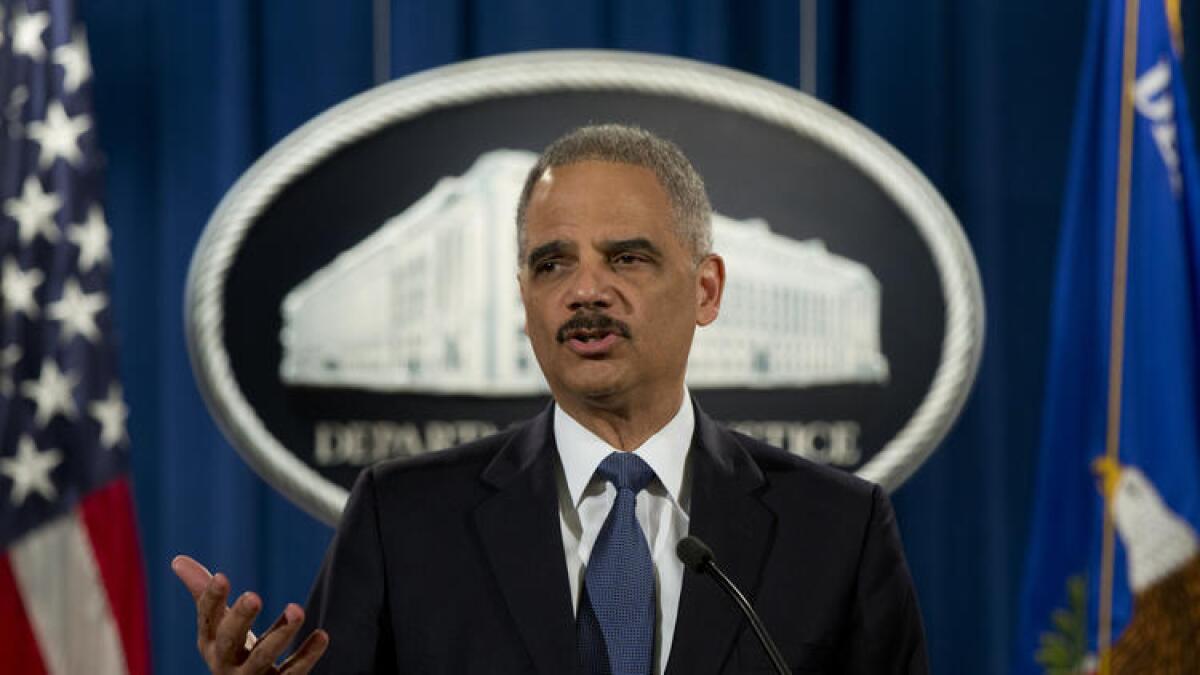
California lawmakers will have a chance to meet the Legislature’s new outside counsel on Feb. 7, when former U.S. Atty. Gen. Eric H. Holder Jr. travels to the state to address Senate and Assembly Democrats.
Holder, leading a team of attorneys from the firm Covington & Burling, has been hired by Senate President Pro Tem Kevin de León (D-Los Angeles) and Assembly Speaker Anthony Rendon (D-Paramount) to serve as outside counsel as the state prepares a legal strategy to deal with the administration of President Trump.
But Senate and Assembly staff officials said his invitation to meet with lawmakers was extended prior to the contract, which begins in February, and that Holder is making the trip on his own personal time. His travel and accommodations expenses will not be paid with state funds, and his appearances will not be part of his billable hours, they said.
Holder will address Senate Democrats at their annual policy retreat, and will speak to the Assembly Democratic caucus. His visit comes soon after state Democratic leaders this week denounced Trump’s executive orders on immigration and pledged to take his administration to court should other legislative means of resistance fail.
A guide to the guessing game that is the 2018 California governor’s race
While the race to succeed Gov. Jerry Brown already has attracted a small cadre of well-known Democrats, the behind-the-scenes strategizing, cajoling and guessing games surrounding a handful of other potential contenders could create havoc in what’s expected to be California’s biggest political showdown since 2010.
Among those watching closely are the candidates already definitely in the running, including Lt. Gov. Gavin Newsom, former Los Angeles Mayor Antonio Villaraigosa and state Treasurer John Chiang.
Delaine Eastin, who spent eight years as California’s top education official, announced she was running in November and officially launched her campaign — and fundraising operation — on Thursday.
‘This is not a monarchy’: California Senate leader Kevin de León bashes Trump’s immigration orders
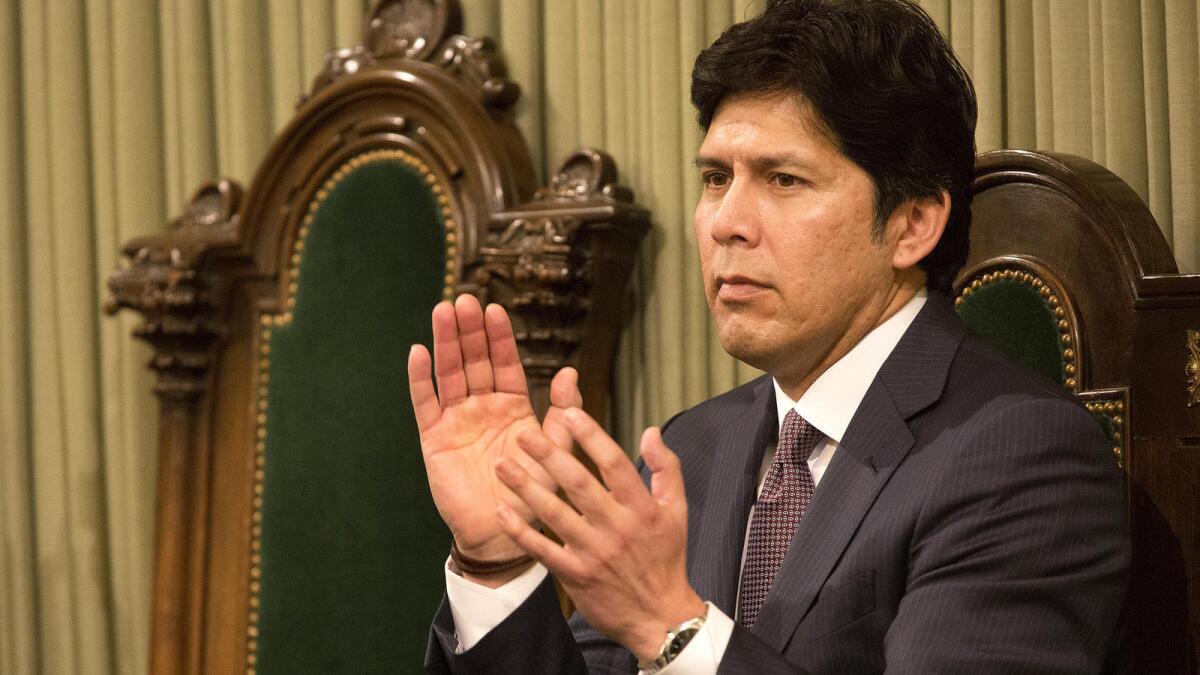
California Senate leader Kevin de León took another shot at President Trump and his executive orders on immigration Wednesday night, calling his threat to withhold federal dollars from so-called sanctuary cities “political blackmail” and “political vengeance.”
In an interview on the MSNBC show “The Last Word with Lawrence O’Donnell,” De León said California was working with former U.S. Atty. Gen. Eric H. Holder Jr. to study all of its legal options to oppose the directives. Under the 10th Amendment, the state Senate leader said, the federal government cannot commandeer and force local municipalities and police agencies from carrying out their work.
The appearance came hours after Trump signed orders to temporarily halt the U.S. refugee program, cut funding for cities that offer immigrants protections and order federal officials to construct a U.S.-Mexico border wall.
“California will not become a cog in the Trump deportation machine,” De León said. “This is not a monarchy, and I know he fancies himself as a king, but this is a republic.”
President Trump’s voter fraud allegation is ‘a lie,’ says California’s top elections officer
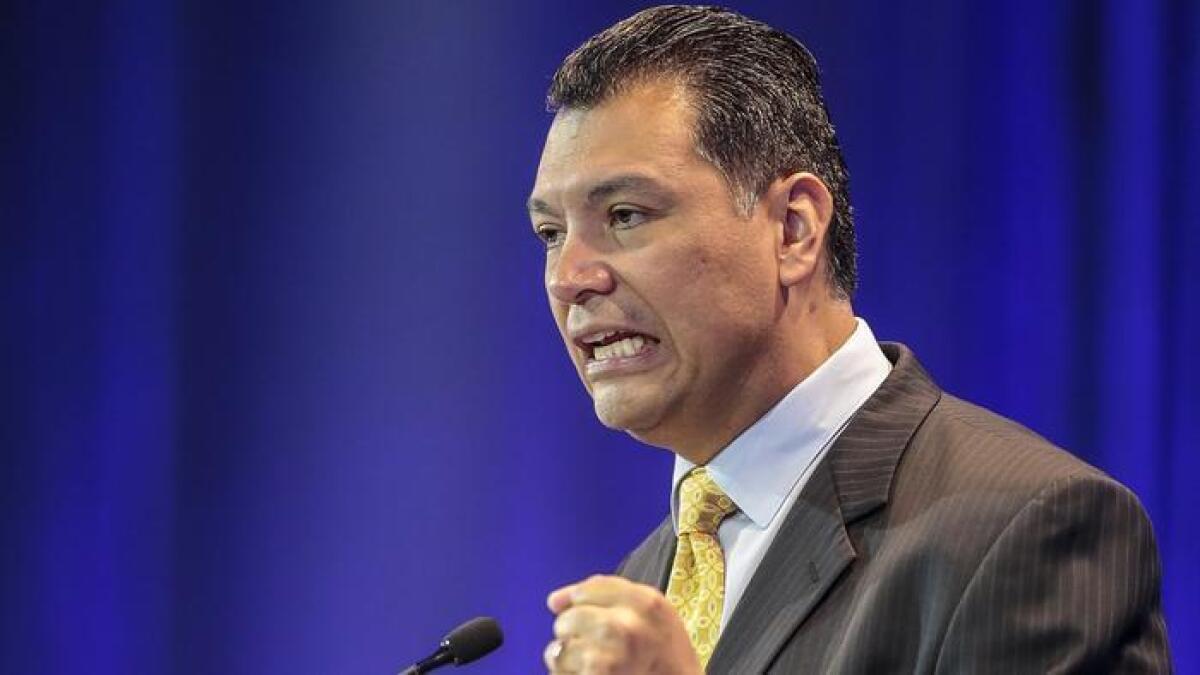
With President Donald Trump rehashing last year’s accusation of widespread voter fraud in California and elsewhere, the state’s top elections official is also restating his take: It’s not true.
“When the president says millions of illegal ballots are cast, that’s simply not the case,” said Secretary of State Alex Padilla in an interview on CNN Wednesday. “It’s a lie.”
As was the case when Trump made the accusation in November, there’s no evidence of such a broad attempt to sway the outcome in California. The president lost the Golden State to Democrat Hillary Clinton by almost 4.3 million votes.
Trump’s announcement on Wednesday of a “major investigation” into voter fraud reignited the issue, even though there was also Republican skepticism in the wake of the new round of accusations.
“Is it a question of millions of people? That’s a pretty steep hill to climb,” said Assemblyman Matthew Harper (R-Huntington Beach), the vice chairman of the Assembly’s elections committee. “You’d have to have a very strong coordinated effort across California to pull that off.”
Harper said he believes the better discussion is whether new, independent audit capabilities need to be in place to examine election results.
Others, though, were sharply critical of the president’s motives.
“Allegations of widespread voter fraud are not just ‘alternative facts,’ they are a calculated and sinister attempt at voter suppression that takes a page from this nation’s bleak history of segregation,” said Laphonza Butler, president of the state council of the Service Employees International Union.
In the CNN interview, Padilla said he worried the president was sowing doubt in an effort to legitimize efforts such as a purging of voter rolls.
“I hope that it’s not a sign of things to come,” he said.
Save the dates: Special election set in congressional race to replace Xavier Becerra
The race is officially on in the 34th Congressional District, after Gov. Jerry Brown officially set the date for a special election to replace former Rep. Xavier Becerra, who resigned Monday to become California’s attorney general.
The primary election will take place on April 4, according to a proclamation Brown issued Wednesday afternoon.
If no candidate receives more than 50% of the vote, a general election will be held June 6.
The election dates are separate from two already scheduled municipal elections on March 7 and May 16 in Los Angeles, which encompasses nearly the entire district.
This could heighten concerns about low voter turnout for an off-year election. At least 18 candidates have already stated their intention to run to replace Becerra, who had been in office for 24 years.
‘Medieval policy that no longer works today’: California legislators sound off on Trump’s immigration plans
‘This isn’t who we are’: What California House members are saying about Trump’s dramatic immigration orders
California’s congressional delegation responded largely with dismay Wednesday to President Trump’s executive orders to begin building a wall along the country’s southern border, cut off funding for cities that don’t comply with federal immigration enforcement officials and expand lockup facilities for those caught entering the country illegally.
Rep. Linda Sanchez of Whittier, vice chair of the House Democratic Caucus, called Trump’s plans for a wall “absurd” and “reckless,” and said Americans will end up footing the bill, not Mexico as Trump insists.
“This is a waste of everyone’s time and money, and does not address the fundamental need for comprehensive reform to fix our broken immigration system. If history has taught us anything it is that walls are expensive, unnecessary and people ultimately find ways around them,” she said in a statement.
Rep. Zoe Lofgren (D-San Jose), a former immigration attorney, dismissed the idea that a wall will keep people out, making reference to the Great Wall of China.
Rep. Scott Peters (D-San Diego), whose district is near the southern border, said Trump doesn’t understand that tens of thousands of jobs in San Diego, and millions around the country, depend on border trade with Mexico.
“In San Diego, we see the border as an opportunity, not a threat, and we know that a wall isn’t the answer. This money would be better spent on modernizing infrastructure and hiring staff at our border crossings to make the screening of cargo and travelers more efficient and secure,” he said in a statement.
House and Senate Republicans are in Philadelphia for an annual retreat. Only one of California’s 14 Republican House members went on record as favoring the president’s orders in the hours after they were announced.
Intelligence committee led by Californians investigating Russian influence in 2016 election
The House Select Intelligence Committee is examining allegations that the Russian government tried to influence the 2016 election, Republican Chairman Rep. Devin Nunes and ranking Democrat Rep. Adam Schiff said in a statement Wednesday.
The two Californians said the committee is looking at Russian cyber activity and “other active measures” directed against the U.S. It also will examine links between Russia and people working for political campaigns as well as the federal response to Russia, including leaks of classified assessments from the intelligence community.
The statement does not specifically mention President Trump, the assessment of the U.S. intelligence community that Russia attempted to intervene in the presidential election to ensure he would win or news that Trump’s national security advisor was in frequent contact with the Russian ambassador as President Obama was considering sanctions against Russia.
“This issue is not about party, but about country. The Committee will continue to follow the facts wherever they may lead,” the statement said.
The Senate Intelligence Committee, on which Sen. Dianne Feinstein (D-Calif.) serves, also is investigating Russian interference in the election, and the U.S. response.
Two Republican senators have joined a number of House and Senate Democrats, including House Select Intelligence Committee member Eric Swalwell (D-Dublin) in pushing for a nonpartisan independent commission to examine the issue.
Nunes, who served on Trump’s transition committee, has previously said he doesn’t think an independent commission is necessary.
The statement also asked the new, Trump-appointed heads of intelligence agencies to bring documents requested by the committee directly to committee members.
“It will not be adequate to review these documents, expected to be in the thousands of pages, at the agencies. They should be delivered to the House Intelligence Committee to provide members adequate time to examine their content,” it states.
No stamp, no problem: Lawmaker says postage-paid ballots should be available to all Californians
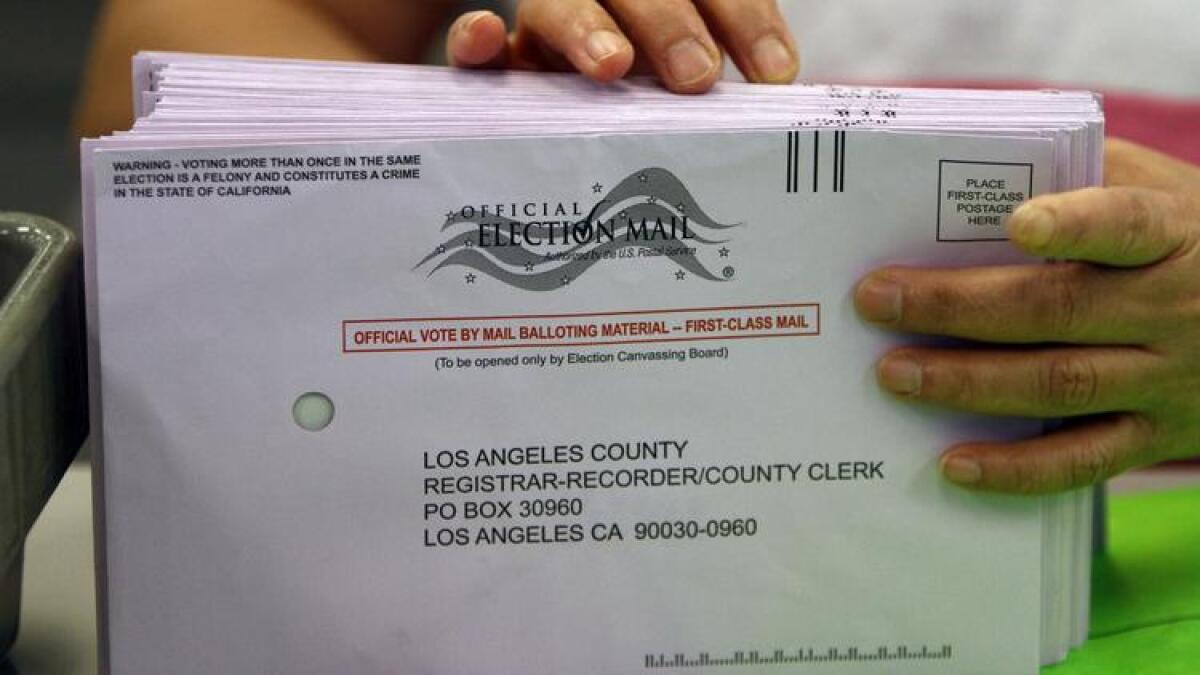
California voters would no longer have to scrounge around in search of a stamp to mail in their ballot under new legislation introduced this week at the state Capitol.
“We want to make sure voters don’t have any barriers,” said Assemblywoman Lorena Gonzalez Fletcher (D-San Diego), the bill’s author.
Ballot envelopes sent by elections officials would be marked as “prepaid postage” and the postage costs would be paid for by individual counties. A key question will be the cost for mailing in as many as 10 million ballots statewide. Not all ballots will weigh the same, given the numerous city and county measures that also are considered in regularly scheduled elections.
The initial language of Assembly Bill 216 doesn’t offer specifics on reimbursing counties, though Gonzalez Fletcher said she expects the proposal’s ultimate cost could be under $2 million, if the law also makes clear that voters can still place a stamp on their ballot.
Regardless, postage fees are likely to be deemed a mandated cost that state government must cover.
Gonzalez Fletcher said the advent of email and online bill-paying services have meant that fewer voters have stamps readily available, with busy working Californians scrambling just to find the time to exercise their right to vote.
“It starts to feel like a very small poll tax,” she said.
The proposal is another example of the steady evolution of elections conducted less by the ballot box than the mailbox in California, as more than half of all registered voters now permanently receive absentee ballots. A number of the state’s most populous counties are expected to soon embrace a sweeping new law shifting elections away from neighborhood polling places and toward a substantial number of votes being cast by mail.
“This is welcome legislation,” said Kim Alexander, president of the nonpartisan California Voter Foundation. “Requiring voters to pay for ballot postage sends a message that the government is putting up obstacles to make it more difficult to vote.”
In many cases, ballots placed in the mail without proper postage are already being delivered by the U.S. Postal Service. Some counties in California have offered prepaid postage in the past, but the vast majority have not.
State legislators react to Trump’s immigration executive orders
California improves grades from anti-smoking group with barrage of anti-tobacco laws
California led other states in adopting a flurry of new laws restricting tobacco products last year, resulting in a big improvement in the state’s grades from the American Lung Assn.
In a report released Wednesday, the health group boosted the state’s grade for the level of tobacco taxes from an F last year to a B, in recognition that California voters in November approved a $2-per-pack increase in the cigarette tax.
The Legislature last year also adopted a half-dozen new laws, including an increase in the minimum age for smoking from 18 to 21 and an expansion of a smoking ban in public places, including restaurants and theaters, to also include use of electronic cigarettes.
The state’s grade for “smoke-free air policies” rose from a B to an A, while California received a B for restricting tobacco to young people.
The group gave the state an “incomplete” for funding of tobacco prevention programs because officials have not yet started collecting money from the tobacco tax increase in Proposition 56.
“In 2016, Californians fought back against Big Tobacco’s grip on our state,” said David Pogue, chairman of the American Lung Assn. in California’s governing board. “Tobacco-related illnesses remain the single most preventable cause of disease and death in California, and we’re proud to reaffirm ourselves as a national leader in the effort to reduce smoking rates and exposure to secondhand smoke and to protect our children from a lifetime of addiction.”
The group cited the lack of significant new tobacco laws passed in Los Angeles for its decision to leave the city’s C grade unchanged. El Monte and West Hollywood passed some new tobacco policies and raised their grades. Santa Ana earned a C, but was at top of the list in Orange County, where almost all the other cities received Fs, officials said.
California Rep. Lou Correa urges Trump to restore Spanish-language version of White House website
Freshman Rep. Lou Correa (D-Santa Ana) asked President Trump in a letter Wednesday to reinstate the Spanish-language version of the White House website.
An aide to the president said Tuesday that a Spanish-language version of the page would be available at some point.
Correa’s spokesman, Andrew Scibetta, said the congressman wants to make sure it’s moving forward.
“In development is not the same as online. We want to make sure this actually happens, and doesn’t get stuck in indefinite development,” he said.
Correa represents California’s 46th Congressional District, in which more than half of residents speak Spanish at home, according to the U.S. Census Bureau’s 2015 American Community Survey.
The Trump administration took over the site on Friday, the day he was inaugurated. Among other changes, it no longer includes an option for translation into Spanish or an option that gave information about access for disabled users.
Sen. Kamala Harris pushes Trump’s budget director pick on timely disaster relief
Sen. Kamala Harris (D-Calif.) pushed President Trump’s budget chief pick Tuesday on whether he’d advise the new Republican leader to offer timely disaster relief, especially to states like California that face earthquakes, fires, floods and other natural disasters.
“Can you assure me that when natural disasters hit various parts of the country like California, that you will be willing to put the immediate interests of people in need as the first priority for you, or will you insist that the budget cuts be made before agreeing to provide critical assistance to those victims?” Harris asked Rep. Mick Mulvaney during a confirmation hearing Tuesday.
The South Carolina Republican asked for spending cuts to offset billions in relief funding after Hurricane Sandy hit the East Coast.
“There is a proper federal role in dealing with natural disaster relief,” Mulvaney said in response to Harris’ questioning. “Sandy is a tremendous example of something so large, it’s simply too large for one state or local government to deal with, it is an appropriate function of the federal government.”
Harris pushed a second time, “So can you assure me that if a natural disaster hits other states, like California for example, that you will not hold up relief for the state, waiting to determine whether there are going to be budget cuts or cuts in order to provide that relief? Or are you going to sit back and crunch the numbers while people are waiting for help?”
Mulvaney replied, “No, I see my role in that particular circumstance as advising the president. Mr. President, here’s what we’ve done it in the past, here’s how it worked out, here’s how I think we should proceed in this circumstance and here’s why. And then whatever the president says to do, I will enforce.”
Harris is still weighing how to vote on Mulvaney’s confirmation, her staff said.
Trump is a hot topic in California’s race for governor, but not in a good way

One of the most talked about politicians in California’s 2018 governor’s campaign isn’t even running.
Rarely does a day go by when Republican President Donald Trump isn’t used as a political piñata by one of the top Democrats in the race.
Lt. Gov. Gavin Newsom took some jabs Tuesday when he addressed the California Legislature before Gov. Jerry Brown’s annual State of the State speech. Newsom mocked the Trump administration for its reliance on “alternative facts” — a phrase used by a Trump senior advisor when defending inflated inauguration crowd figures — and took a subtle shot at the president’s comment about “American carnage” in the nation’s cities.
On Monday, state Treasurer John Chiang criticized Trump for doubting the scientific evidence of climate change.
“President Trump may believe global warming was created by and for the Chinese in order to make U.S. manufacturing noncompetitive,’’ Chiang said. “We Californians stand with the scientific community and the 195 nations that have declared climate change is an urgent and potentially irreversible threat to human societies and the planet.”
When Antonio Villaraigosa announced his bid for governor right after the general election, the former Los Angeles mayor was sure to include a dig at Trump.
“I’m running because I think the answer to the divisiveness we see in the country right now is unity, and the answer to fear is hope,” he said.
Last May, Villaraigosa compared Trump to segregationist George Wallace.
California’s former superintendent of public instruction, Delaine Eastin, last week ripped Trump for nominating Betsy DeVos for Education secretary. Eastin said DeVos, a charter school advocate and Republican fundraiser from Michigan, was a threat to public education in the country.
In speeches, in fundraising emails, in tweets and Facebook posts, the Democrats have liberally excoriated Trump while largely avoiding lobbing any criticism at one another. It’s a safe and easy tactic that appeals to a sizeable majority of voters in left-leaning California.
In the November election, Trump was trounced by Democratic presidential nominee Hillary Clinton in California — losing to her by more than 4.2 million votes.
San Diego Mayor Kevin Faulconer, a Republican being urged to run by fellow party members, has also rebuked Trump in the past.
In May, Faulconer said he rejected Trump’s “divisive rhetoric” about women and immigrants. Faulconer was absent at Trump’s inauguration and skipped a Trump campaign rally in San Diego last spring.
For any Republican to have a legitimate shot in the governor’s race, or any statewide election, the more distance they put between themselves and Trump the better, said GOP political consultant Rob Stutzman.
“It’s important that you’re not on the record gushing about Trump,” Stutzman said.
3:30 p.m.: This story was updated to correct the title of Delaine Eastin. She is a former state superintendent of public instruction.
California’s House members vote along party lines on permanently banning federal funds for abortion
California’s House delegation split along party lines Tuesday on a bill to permanently prohibit the use of certain federal funds for abortions.
President Trump promised the anti-abortion community during the campaign that he would make the funding ban — commonly called the Hyde Amendment — permanent.
It passed the House 238-183 and goes next to the Senate. The 52 members who represent California in the House split along party lines, with 36 Democrats against for it, and 14 Republicans voting for it. Reps. Ted Lieu (D-Torrance) and Jim Costa (D-Lieu) did not vote. Their staffs each said the member would have joined Democrats in voting against the measure.
If passed by the Senate, it would permanently prohibit federal funding from being used to cover abortion costs except in cases of rape, incest or if the mother’s life is in danger. It effects government employee’s health plans, Medicaid and health insurance plans offered under the Affordable Care Act.
The amendment has been added to the annual appropriations bill for the past 40 years and the bill approved by the House Tuesday would make it permanent.
During debate on the House floor Rep. Judy Chu (D-Monterey Park) called the bill a “women’s health catastrophe” that will keep poor women on Medicaid or the Affordable Care Act from having access to insurance.
“In effect it makes abortion only an option for the wealthy,” she said.
Previous versions of the bill twice passed the House but were not considered by the Senate while President Obama was in office.
11:09 a.m. Jan. 25: An earlier version of this article reported that Democrats voted for the bill and Republicans voted against the bill. It was the opposite.
California lawmakers to weigh whether younger children should be allowed to testify in custody cases
California lawmakers will weigh whether family courts should allow children as young as 10 to testify before judges regarding parent custody or visitation rights.
A bill filed by state Sen. Connie Leyva (D-Chino) would lower the current threshold from age 14 to enable more children to express their wishes in court, some of whom she said could find themselves in life-threatening situations.
The legislation was co-sponsored by the California Protective Parents Assn. and the Center for Judicial Excellence. Neither current law nor the bill would require children to testify in family cases unless they choose to.
In a statement, Levya called the proposal an important child safety measure.
“As a family court makes critical life decisions for children, it makes sense for them to be granted a greater voice in court proceedings since they can contribute essential information before final decisions are made,” she said.
Support for California secession is up, one poll says

Californians’ support for a breakaway California republic has increased, one poll has found.
One-third of state residents support peacefully seceding from the United States, up from 20% since Californians were last asked the same question in 2014, according to a new Reuters/Ipsos opinion poll. The poll’s margin of error for the California answers was plus or minus 5 percentage points.
Still, half of Californians opposed the idea of succession, though Democrats were more inclined to support it than Republicans. The survey found that 60% of Republicans gave the idea of peacefully seceding a thumbs down compared with 48% of Democrats and 50% of independents.
Nationally, 22% of those polled supported having their state break away from the U.S., according to the survey.
A “Calexit” campaign already is underway to make California an independent nation. The effort faces extremely long odds.
The poll surveyed 14,000 adults nationwide, and 500 in California, from Dec. 6 to Jan. 19.
Skelton on Gov. Brown’s State of the State address: ‘Most fiery’ speech to date
Gov. Jerry Brown defiantly tells lawmakers ‘California is not turning back’ in face of Trump and GOP proposals
Gov. Jerry Brown used his State of the State speech on Tuesday to promise a forceful defense of California’s efforts on climate change, healthcare and assistance to those in the country illegally against new proposals by President Donald Trump and national Republican leadership.
“California is not turning back,” Brown said to applause. “Not now, not ever.”
The governor’s remarks, delivered in front of lawmakers and state elected officials in the Assembly chambers, came just four days after President Trump’s forceful inaugural address that signaled a dramatic new course for the federal government.
While he never mentioned the president by name during the 16-minute speech, Brown said there are “disturbing” signs as to what’s on the horizon.
“We have seen the bald assertion of ‘alternative facts,’ whatever those are,” he said, a reference to top Trump advisor Kellyanne Conway’s weekend comments on NBC’s “Meet the Press.” “We have heard the blatant attacks on science. Familiar signposts of our democracy — truth, civility, working together — have been obscured or swept aside.”
The annual event in the chamber of the state Assembly was unusual from the outset. Just minutes before beginning his speech, Brown gave the oath of office to Atty. Gen. Xavier Becerra, the former Los Angeles congressman confirmed to the post on Monday afternoon by the state Senate.
Legislators have had a decidedly unusual start to their new two-year session. After a raucous opening day in December that laid bare wounds from the presidential race, lawmakers were presented two weeks ago with Brown’s projection of a $1.6-billion budget deficit looming on the state’s fiscal horizon.
But the sea change in national politics has been a persistent buzz in the state Capitol, and Brown promised a strong defense of California’s unique view on major policy issues.
The governor made a special mention of the issue of illegal immigration, offering perhaps his strongest words to date.
“Let me be clear,” the governor said, his voice rising. “We will defend everybody — every man, woman and child who has come here for a better life and has contributed to the well-being of our state.”
Even with those critiques, the governor veered from his prepared remarks to praise Trump’s call for a new focus on infrastructure projects.
“I say, ‘Amen to that, man!’ ” he said.
And Brown urged members of the Legislature to reject the bitter partisan divisions of this moment in the nation’s history.
“Democrats are in the majority, but Republicans represent real Californians, too,” he said to bipartisan applause. “We have generally been civil to one another and avoided the rancor of Washington. I urge you to go even further and look for new ways to work beyond party and act as Californians first.”
Governor ends State of the State address by saying California’s ‘truth is marching on’
Gov. Jerry Brown says Planned Parenthood has been ‘unfairly attacked’
Governor defends Planned Parenthood in State of the State address
Gov. Jerry Brown promises to protect immigrant rights
Let me be clear: We will defend everybody -- every man, woman and child -- who has come here for a better life and has contributed to the well-being of our state.
— Gov. Jerry Brown, speaking on immigration in his State of the State speech
Gavin Newsom: California is the ‘antidote’ to federal politics
Xavier Becerra takes oath of office, is first Latino to become California attorney general
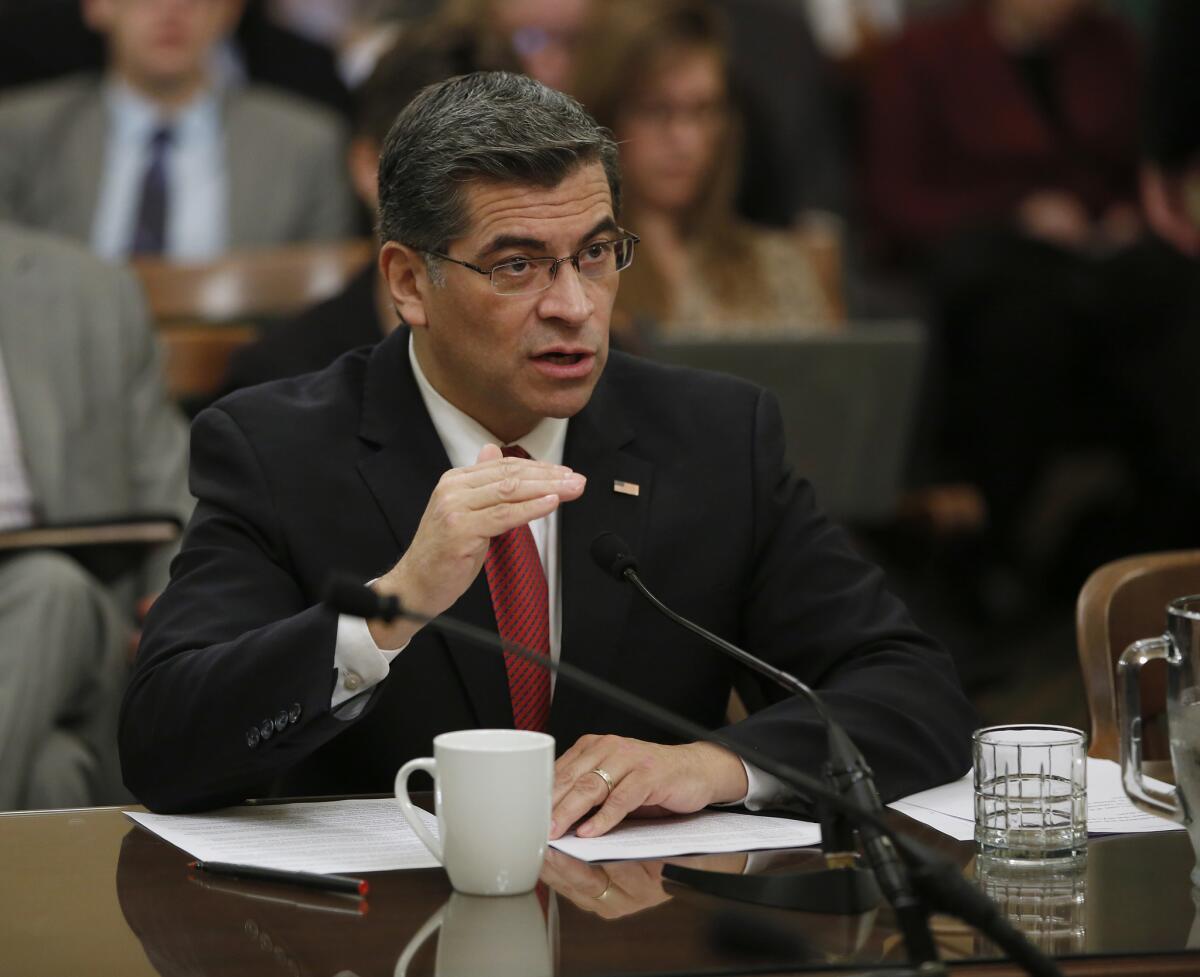
Minutes after resigning his seat in Congress on Tuesday, Xavier Becerra took the oath of office as California’s new attorney general, and he immediately made plans for a sit-down with sheriffs from throughout the state to talk about law enforcement issues.
Becerra, 58, was given the oath of office at the Capitol by Gov. Jerry Brown, who predicted earlier that “Xavier will be a champion for all Californians.” The ceremony was held before Brown was scheduled to deliver his annual State of the State address, and a day after Becerra received final confirmation by the state Senate.
“I will do my utmost to uphold your faith in me to serve as our great state’s next chief law enforcement officer and legal advocate,” Becerra said in a letter to Brown on Tuesday, letting him know he had resigned from Congress.
“And while I leave Congress with mixed emotions, I am ready to begin my work as Attorney General. California’s hard-working families are counting on us, and we won’t let them down,” Becerra said.
Becerra was accompanied at the ceremony by his wife, physician Carolina Reyes, two of his three daughters, and his parents, both immigrants from Mexico.
Brown appointed Becerra to fill a vacancy after former Atty. Gen.l Kamala Harris won election to a seat in the U.S. Senate.
Becerra has pledged to challenge any attempts by the new administration of President Trump to roll back state policies on immigration, civil rights and the environment.
Brown noted his appointee’s background during his speech.
“Like so many others, he is the son of immigrants who saw California as a place where, through grit and determination, they could realize their dreams,” Brown said. “And they are not alone, millions of Californians have come here from Mexico and a hundred other countries, making our state what it is today: vibrant, even turbulent, and a beacon of hope to the rest of the world.”
The first Latino to become state attorney general in California spent the last two weeks meeting with dozens of legislators as he went through confirmation hearings in both houses.
“Governor Brown and state legislators have already shared valuable ideas on our path forward,” Becerra said in a statement after his confirmation. “And next week I hope to sit down with sheriffs from across our state to begin our work together keeping our families safe and enforcing our laws fairly.”
The first focus on local law enforcement was welcomed by Kern County Sheriff Donny Youngblood, president of the California State Sheriffs’ Assn.
“He wants to start with law enforcement in the San Joaquin Valley, and I think that’s a really positive step,” Youngblood said. “I’m impressed with his credentials. I’m impressed with his background, and I think he’s going to be a good attorney general.”
Xavier Becerra is officially sworn in as California’s new attorney general
Governor’s aide references Woody Guthrie in State of the State preview
Watch: Gov. Jerry Brown delivers his State of the State address
Gov. Jerry Brown will deliver his State of the State address at 10 a.m. PST. Watch live here:
A tribute to the governor’s late dog before the State of the State speech
Xavier Becerra’s resignation from Congress took effect at 9:15 a.m.; he calls serving a ‘distinct honor’
California’s senators split on CIA director confirmation
California’s senators split Monday night on the confirmation of Rep. Mike Pompeo (R-Kan.), President Trump’s pick to lead the CIA.
Sen. Dianne Feinstein (D-Calif.), who serves on the Senate Select Intelligence Committee and backed Pompeo, said in a statement that Pompeo gave straightforward answers to her questions, and that House colleagues called him “smart, hardworking and devoted to protecting our country.”
“Congressman Pompeo has committed to following the law regarding torture, promised to provide objective analysis of Iran’s compliance with the nuclear agreement and insisted that he would continue to keep the Senate Intelligence Committee fully informed of CIA activities,” Feinstein said.
Sen. Kamala Harris (D-Calif.) said in a statement that she appreciated that Pompeo was “responsive, engaging, and has made a number of positive commitments” during the confirmation process, but said she couldn’t vote for him after looking at his entire “record on issues such as torture, surveillance, and the collection and use of metadata.”
Pompeo was confirmed 66 to 32 Monday evening. Thirteen Democrats joined Feinstein in voting for him.
While House members don’t get to vote for confirmation, the leaders of the House Select Intelligence Committee, Chairman Rep. Devin Nunes (R-Tulare) and ranking Democrat Rep. Adam Schiff (D-Burbank) joined Feinstein in congratulating Pompeo for his confirmation.
Sen. Kamala Harris moves into some familiar digs on Capitol Hill
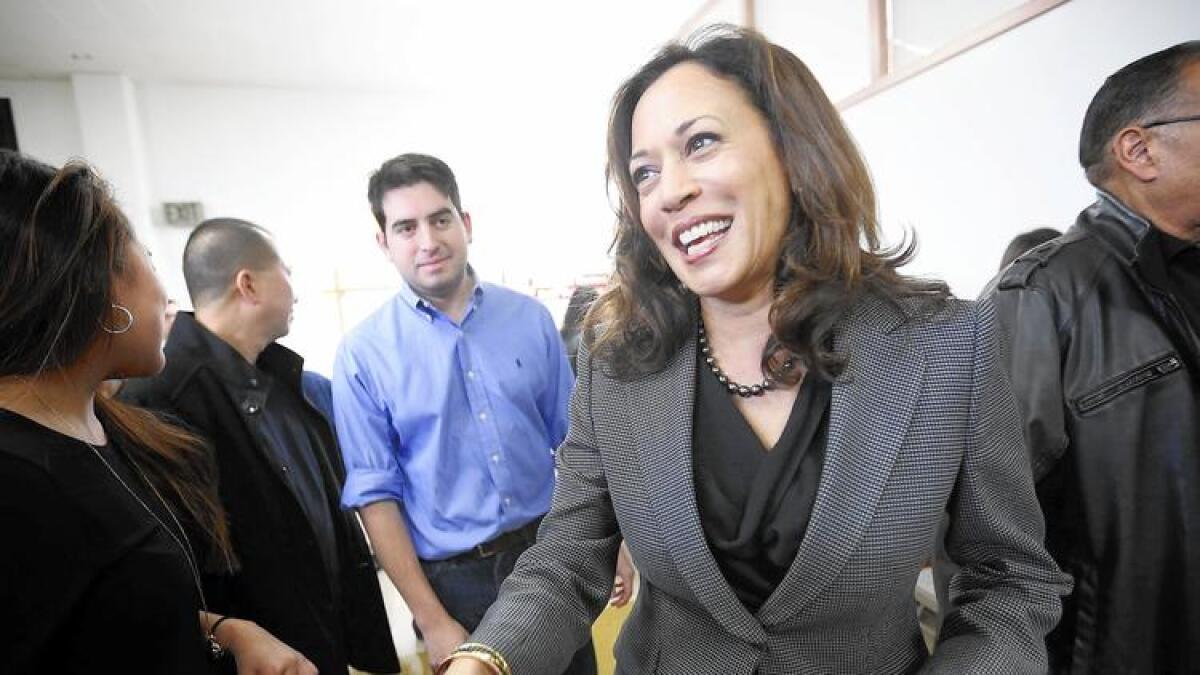
Sen. Kamala Harris (D-Calif.) and her staff can begin moving today into her official Senate office, the same space she interned in as a college student.
Few offices can hold a staff as large as the ones allocated to the California members and as expected, Harris was assigned an office in the Hart Senate Office Building, the same space occupied by former Sen. Barbara Boxer (D-Calif.). Harris can start moving in this morning, her staff said.
Back home, Harris plans to have state offices in Fresno, Los Angeles, Sacramento, San Diego and San Francisco, her staff said.
It is a bit of a change from Boxer, who had additional offices in Oakland and Riverside, but did not have an office in San Francisco.
The space in Washington should feel familiar. It was occupied by Sen. Alan Cranston (D-Calif.) when Harris interned for him as a mailroom clerk for a summer when she was a Howard University student in the 1980s.
Two floors up in the same building is Sen. Dianne Feinstein (D-Calif.).
Except for states where staff size is a consideration, Senate offices are assigned based on seniority and sitting senators have months to decide if they want to move offices. That means some new senators could spend months working out of temporary space.
Assembly speaker taps former Obama spokesman for communications strategy
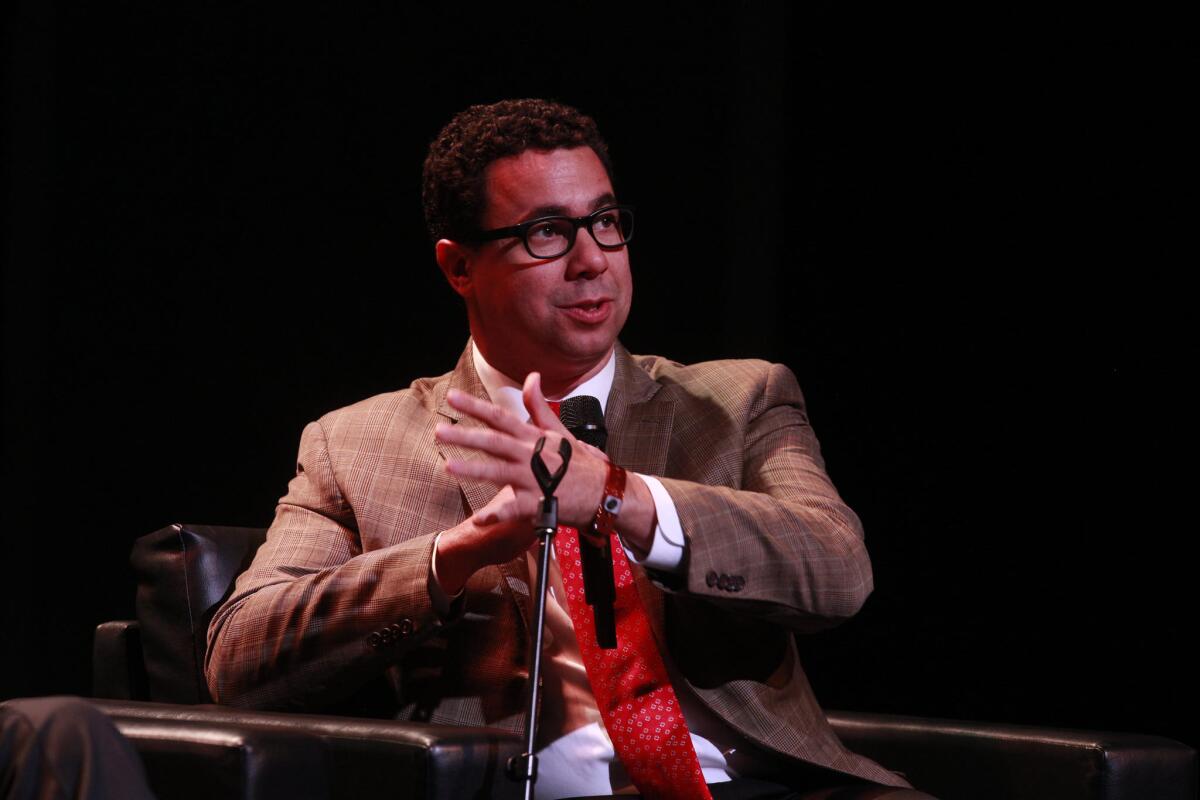
With California’s face-off against Washington, D.C., getting widespread attention, Assembly Speaker Anthony Rendon has turned to a veteran of national politics to help shape his public image: White House veteran Bill Burton.
Burton, who once worked as deputy press secretary in the Obama administration, was hired this month by Rendon, a Democrat from Paramount, for communications strategy.
Now a managing partner in the Los Angeles office for SKDKnickerbocker, a prominent liberal public affairs firm, Burton said he relished being involved in California politics, which he said sets a model for liberals nationwide.
“With President Trump and congressional Republicans controlling the national agenda, Speaker Rendon and his incredible staff are at the center of some of the most important progressive fights in the country and we couldn’t be more excited to be helping any way we can,” he said.
Burton said his services, paid for out of Rendon’s campaign account, are meant to offer a “more intentional approach to how he’s been dealing with media” — a recognition, he said, of Rendon’s and California’s “elevated role” in national politics.
Rendon is not the only legislative Democrat to be represented by SKDKnickerbocker. Assemblywoman Cristina Garcia of Bell Gardens also is a client. The firm also worked with Democratic Reps. Grace Napolitano and Linda Sanchez in their reelection bids, as well as freshman Rep. Nanette Barragan in her heated congressional race against fellow Democrat, former state Sen. Isadore Hall.
State Senate votes for final confirmation of Xavier Becerra as state attorney general
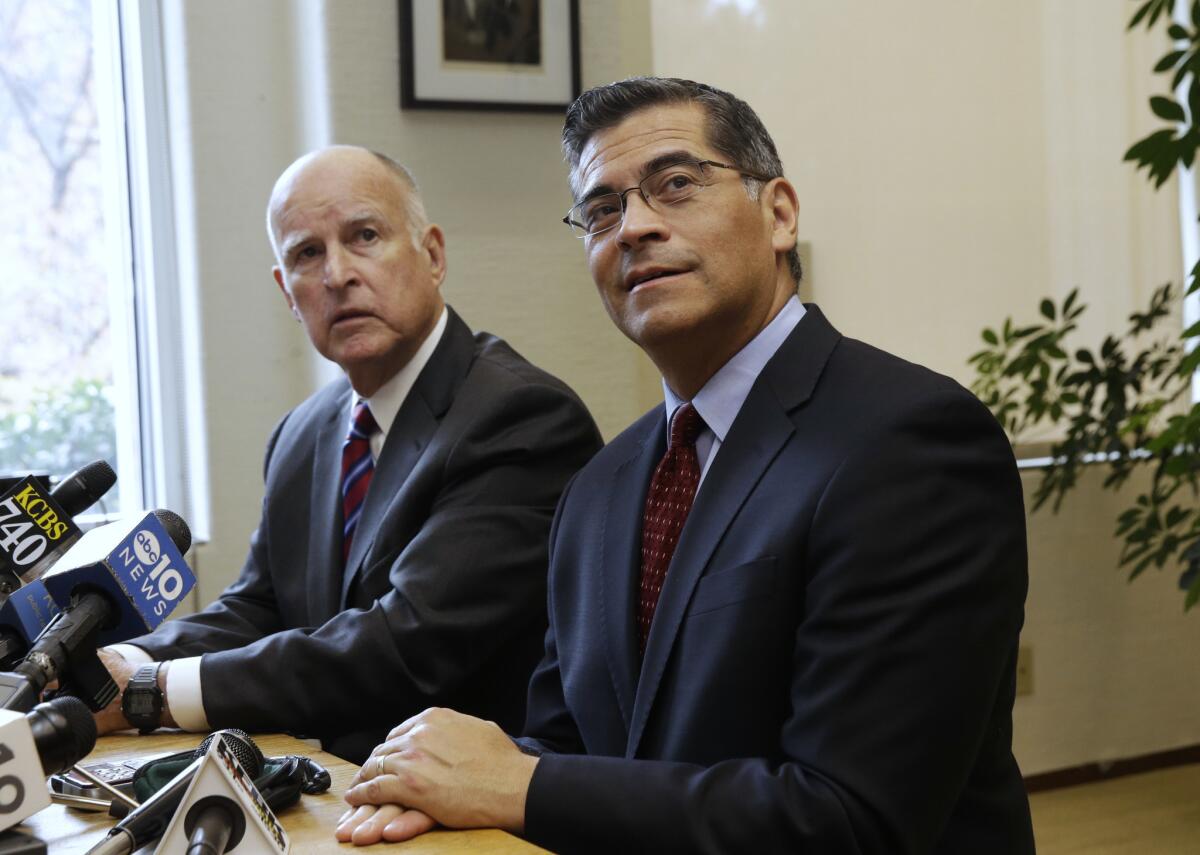
The state Senate on Monday voted 26-9 in favor of final confirmation of Rep. Xavier Becerra as California’s attorney general, putting on watch a veteran politician who has promised to block efforts by President Trump to roll back state policies on immigration, civil rights and the environment.
Becerra, a Los Angeles Democrat and 12-term congressman, is set to take the oath of office on Tuesday before Gov. Jerry Brown’s State of the State address.
“As Attorney General, Xavier will be a champion for all Californians,” Brown said in a statement after the party-line vote.
Brown appointed Becerra as the state’s first Latino attorney general to fill the vacancy left when former state Atty. Gen. Kamala Harris was elected to the U.S. Senate.
Senate President Pro Tem Kevin de León said Becerra will be an effective counter force to Trump, who has threatened mass deportations and the repeal of some environmental laws.
“Many of us know him personally and can attest to his character, to his integrity and to his qualifications,” De León said of Becerra. “He will be a strong partner for our state to help us work with the federal government when we can and to resist when we must.”
State Sen. Hannah-Beth Jackson (D-Santa Barbara) said Becerra understands the challenges ahead.
“He will indeed vigorously defend the values of our state by taking the fight to the federal government when necessary,” said Jackson, who chairs the state Senate Judiciary Committee.
Becerra, 58, said during two weeks of confirmation hearings that he would also fight any attempt to weaken environmental protections or adopt stop-and-frisk police policies that allow officers to search anyone on the street.
All Republican senators voted against Becerra or withheld their vote.
“I think when you are the top cop you have to enforce the law to the fullest extent,” said state Sen. Joel Anderson (R-San Diego) before he voted against Becerra.
Opponents cited Becerra’s support for sanctuary cities that refuse to have their officers help enforce immigration laws.
San Francisco prohibits local authorities from holding immigrants for immigration officials if they have no violent felonies on their records and do not currently face charges.
Trump has threatened to withhold federal funds from sanctuary cities.
Sen. John Moorlach (R-Costa Mesa) also opposed Becerra, saying he is worried that the antagonistic tone being set by Democratic lawmakers with Becerra could put at risk the $86 billion the state and its cities gets annually from the federal government.
“I don’t want to jeopardize those funds,” Moorlach said.
Becerra said he was humbled by the vote and ready to get working.He plans to meet soon with county sheriffs to discuss local law enforcement issues.
“As I embark on this new journey, my compass will be the experiences of hard-working families like the one I grew up in,” Becerra said. “As the son of immigrants, I know how important it is to protect the rights and dreams of every aspiring American. I will make sure no headwinds from outside our state can knock us down.”
Attorney general nominee Becerra questioned on guns, death penalty and pot during confirmation hearings
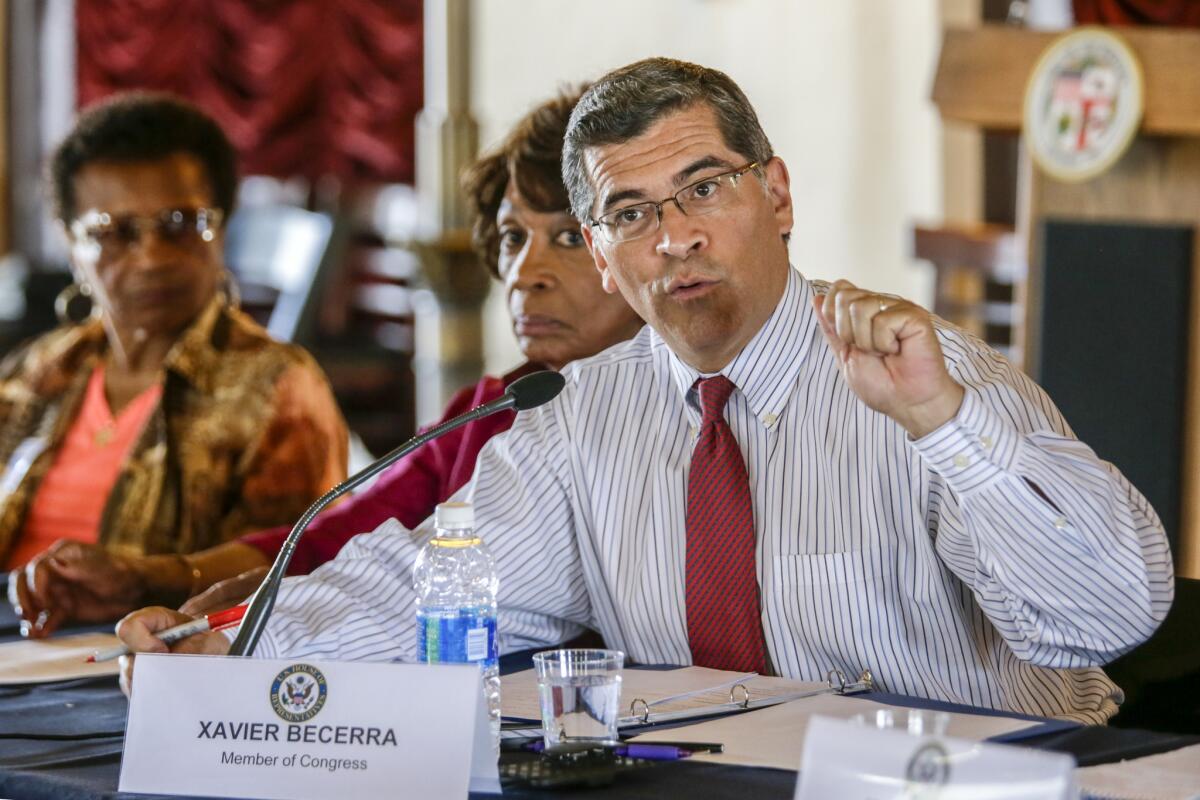
In two weeks of confirmation hearings, state attorney general nominee Xavier Becerra has been asked for his position on many issues, including new gun control laws, the state’s death penalty policy and the recent voter approval of an initiative that legalized recreational marijuana use.
The 12-term congressman is up for a possible final confirmation vote Monday in the state Senate.
California attorney general nominee Xavier Becerra is warned against suing Trump early and often
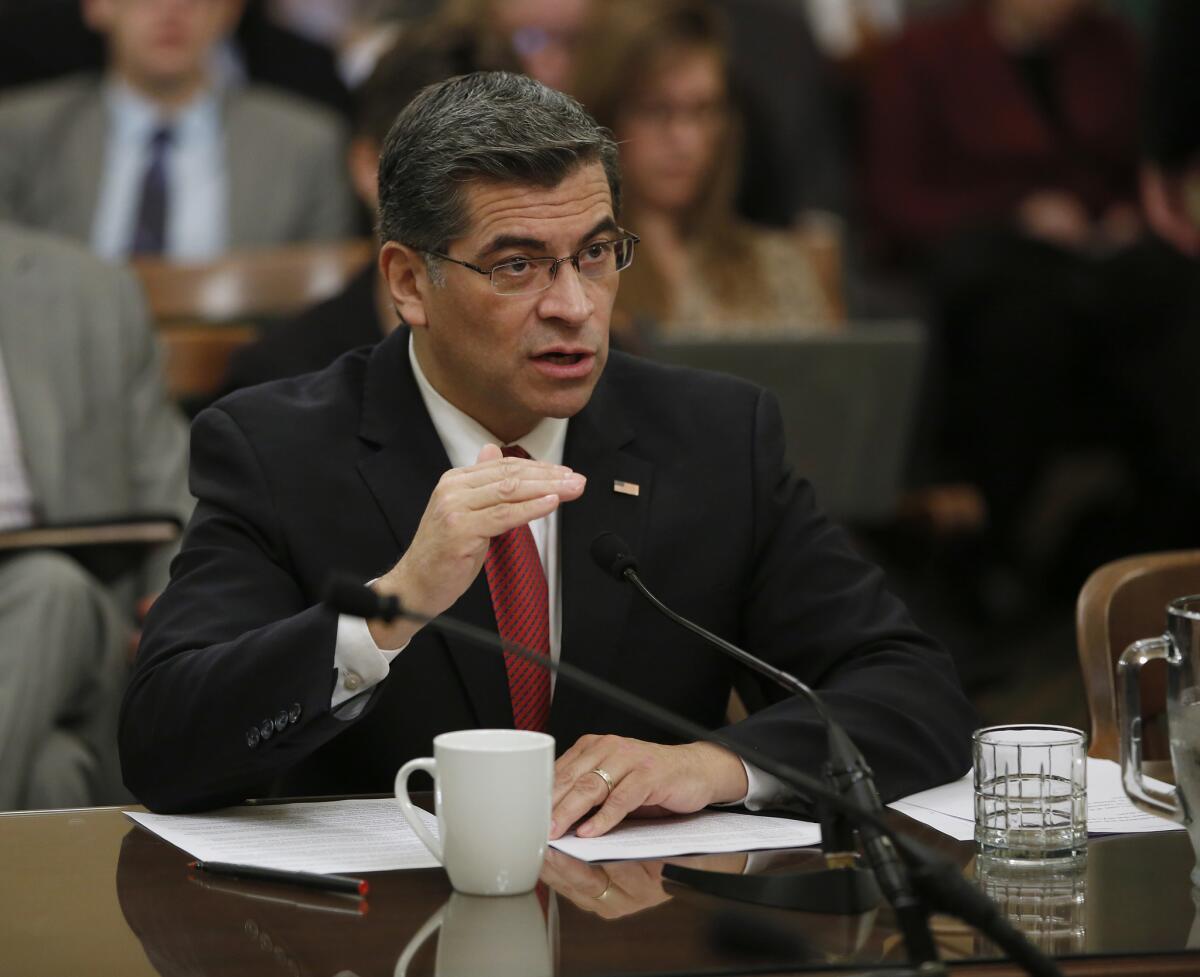
With Xavier Becerra facing a final confirmation vote Monday for state attorney general, two former high-level officials in the office are warning against drowning President Trump in lawsuits.
The pressure to sue Trump early and often is “a trap,” according to Michael Troncos, former chief counsel in the California attorney general’s office, and Debbie Mesloh, a former senior advisor to the California attorney general, writing in an op-ed piece published by the Los Angeles Times.
“In this right-wing political moment, a major legal case on our climate change laws or our policies benefiting (young immigrant) Dreamers may well lead to a Trump White House victory, establishing precedents that far outlast this presidency,” the two write. “In fact, the cases Becerra chooses not to bring may be among his most important achievements. Courts can’t rule on what’s not before them.”
Troncos and Mesloh said California will be up against a U.S. Supreme Court “remade in Trump’s image,” and that “[a]sking a federal court to overturn federal immigration policies could be a fool’s errand.”
California cities would have to make it easier to build houses under new legislation
California cities that are falling behind on housing production goals set by the state would be forced to remove some of their development restrictions under legislation from a Bay Area state senator.
State Sen. Scott Wiener (D-San Francisco) released new details in his bill, SB 35, Monday morning that would require cities to approve new housing in areas already zoned for high-density development provided developers set aside some units for low-income residents. The bill’s provisions would only apply in cities where growth isn’t keeping pace with housing production targets developed by the state every eight years that are designed to ensure California has enough homes for its growing population to live affordably.
Right now, that’s not happening. The state’s median home price of $485,800 is more than 2 1/2 times the national average, with the state’s poorest residents the hardest hit. And in the most recent eight-year housing cycle ending in 2014, production was less than half of the state target.
Wiener, a former San Francisco supervisor, said California’s affordability crisis requires the state to involve itself more in housing development, which is primarily controlled by local governments.
“Local control is about how a community achieves its housing goals, not whether it achieves those goals,” Wiener said in a statement. “SB 35 sets clear and reasonable standards to ensure that all communities are part of the solution by creating housing for our growing population.”
Wiener’s bill is a narrower measure than a failed effort proposed by Gov. Jerry Brown last year, which also took aim at local development rules. Unlike Brown’s proposal, Wiener’s would only apply to cities behind on their housing targets and on sites already planned at high densities. Wiener also would require developments that would qualify for speedier local review to pay construction workers at a rate often equivalent to labor union wages — a key point that caused the state’s construction worker union to oppose Brown’s plan.
When unveiling his budget this month, Brown said he would consider supporting legislation that would limit some local development restrictions. A spokesman for Wiener said SB 35 was the senator’s response to Brown’s position.
Immigrants would be shielded from deportation in low-level drug cases under new bill

A California lawmaker plans on Monday to reintroduce a proposal designed to shield immigrants charged with low-level drug offenses from deportation, as long as they seek rehabilitation and counseling.
The bill by Assemblywoman Susan Talamantes Eggman (D-Stockton) would allow defendants without any prior violent offenses or convictions within five years of their arrest to enroll in a drug treatment program for six months to a year before entering a guilty plea.
Courts would have to wipe defendants’ charges from their records should they successfully complete the pretrial diversion program. But judges would be required to terminate the treatment and reinstate the criminal proceedings for those offenders who do not perform well.
The proposal seeks to tackle a discrepancy between state and federal law: Drug diversion programs across the state require defendants to first plead guilty to drug charges before opting for treatment. But nearly all drug convictions still stand under federal law, triggering deportation, even if a person completes a program and has their state charges dismissed.
A similar bill made it through both houses of the Legilsature in 2015 but was vetoed that October by Gov. Jerry Brown, who said it eliminated “the most powerful incentive to stay in treatment — the knowledge that the judgment will be entered for failure to do so.”
Eggman said she believes that the idea was good then and is especially important now, when there is no indication how immigrants — legally or illegally in the country — will be treated under the administration of PresidentTrump.
“It might be a more complex discussion this year, and it’s a discussion we should have,” she said. “If our laws are meant to treat everyone the same, then why wouldn’t we want that opportunity for treatment available to anyone without risk for deportation?”
California Politics Podcast: For the state’s Democrats, the battle begins
California’s leading Democrats have been talking for two months about what the new president will mean for the state. But an equally important question may be: What will it mean for them?
On this week’s California Politics Podcast, we discuss not just the effect of President Trump on state policies but also on how the national debate might influence the early jockeying in the 2018 race for governor.
We also take a closer look at the most significant policy question for California under the Trump administration: The repeal of the Affordable Care Act.
I’m joined this week by Anthony York of the Grizzly Bear Project.
California’s newest senator takes the stage at Washington rally; congressional Democrats tweet support for march
For live updates throughout the day on the women’s marches in Washington, D.C., Los Angeles and others around the world, follow along with us here.
California Senate leader Kevin de León on the inauguration: ‘I can’t say that our country is united’

Kevin de León didn’t say much during Friday’s inauguration ceremony, and neither did most of the staff and supporters gathered to watch it in his Echo Park office Friday.
“A stunned silence,” De León said with a half-smile, as Donald Trump took the stage to be sworn in as the nation’s 45th president.
Just yesterday, De León, who has quickly placed himself at the front of California’s resistance to the Trump administration, had plenty to say. He accused Trump of trying to “seed confusion and chaos,” and said the new president’s plans for an immigration crackdown were sowing fears among his constituents of “raping and pillaging.”
But he was a bit more reserved, even wistful Friday morning.
“This was supposed to be my first inauguration,” he said of earlier plans to attend former Democratic presidential nominee Hillary Clinton’s inaugural if she was elected. “Was.”
De León offered little commentary during Trump’s speech. When Trump promised that “America will start winning again,” De León looked at the television and asked, “When were we losing?”
After the speech, the state Senate leader spent the rest of the morning touring a community center where homeless youth go to eat, rest and shower. He listened to young people in their 20s describe their struggle to find permanent housing and the long wait for Section 8 housing vouchers.
“On a day like this for our country, it’s important to see these challenges that we still have to face,” De León told Heather Carmichael, the center’s executive director.
After that came an appearance at a small rally in downtown Los Angeles, where protesters shielded themselves from the downpour with soggy umbrellas and ponchos.
Later, back at his office, De León reflected on the “consternation, fear, panic” he said many Californians and Americans were feeling as Trump took office.
“I can’t say that our country is united on this historic day,” he said.
Gov. Jerry Brown hopes to install the new attorney general during his State of the State speech
California regulators detail path toward hitting ambitious climate goal — and the state has a lot of work to do

If California wants to hit its goal for reducing greenhouse gas emissions, it has a lot of work to do. That’s the inescapable conclusion from a new report released by the Air Resources Board on Friday, which detailed a range of proposals for new regulations.
Legislation signed by Gov. Jerry Brown last year requires the state to slash emissions to 40% below 1990 levels by 2030, which is equivalent to 260 million metric tons.
As the graphic below shows, the law requires California to squeeze into a smaller carbon footprint at the same time its economy and population is expected to grow.
Friday’s report says current policies will only get the state down to 310 million metric tons, 20% too high, and even reaching that point will likely prove difficult. For example, state officials have already been struggling to get enough zero-emission vehicles on the roads.
However, California leaders say this is the pace of change that the entire world will need to match in order to avoid some of the most catastrophic effects of climate change.
For the state to hit its goals, the Air Resources Board is proposing two major policies. First, regulators want to slash emissions from refineries by 20%, which would be achieved by requiring facilities to become more efficient.
Second, they want to continue the cap-and-trade program after 2020, something Gov. Jerry Brown emphasized earlier this month. The program requires companies to buy permits to release emissions.
Regulators suggested some possible changes to cap-and-trade, such as reducing the use of offsets, a controversial practice that allows polluters to support climate-friendly projects in other areas of the country instead of cleaning up their own operations.
“Climate change is impacting California now, and we need to continue to take bold and effective action to address it head on to protect and improve the quality of life in California,” Air Resources Board Chairwoman Mary Nichols said.
The proposals released on Friday will likely be the subject of heated debate and possible revision before regulators consider them for approval in April.
Michael Wara, a Stanford law professor who focuses on energy and the environment, called California’s climate goals “unprecedented.”
“People outside of California who work on these issues see that target and say, ‘What? Are they joking? That is insane,’” he said.
Republican legislators are on the scene at Trump’s inauguration
Sen. Dianne Feinstein didn’t attend the inauguration of President Trump
California lawmakers prepare for a new president, many quietly watching while others speak out
After an election and transition season that was anything but quiet, California lawmakers largely planned to mark Friday’s inauguration of President-elect Donald Trump with little public activity.
Gov. Jerry Brown is in Sacramento with plans to privately observe the events in Washington, according to his office. Other prominent elected officials also planned low-key days while Trump and congressional Republicans celebrated in Washington.
Democrats in the state Assembly, meantime, penned what an open “letter to Californians,” listing priorities from the environment to welcoming “refugees and immigrants.” The letter was also distributed as a video featuring two dozen Assembly Democrats.
Five Assembly Democrats chose not to sign the joint letter of principles: Assemblyman Rudy Salas (D-Bakersfield), Assemblyman Adam Gray (D-Merced), Assemblyman Tom Daly (D-Anaheim), Assemblyman Jim Frazier (D-Oakley) and Assemblywoman Sharon Quirk Silva (D-Fullerton).
Most legislators chose to spend the day in their districts, with state Capitol sessions not scheduled for Friday. A few Republicans traveled to Washington for the Trump inaugural, including state Sen. Joel Anderson (R-San Diego), who posted a photo online on Friday morning as the crowd gathered outside the U.S. Capitol.
On Kevin McCarthy’s home turf, Democratic legislators warn against Obamacare repeal

Democratic legislators took their pro-Obamacare message on the road Thursday, convening a hearing in Bakersfield to examine the repercussions of repealing the Affordable Care Act.
The state Senate health committee pointedly held its hearing in the Central Valley — far afield form the state Capitol and the home districts of most members in attendance, but the home turf of key Republican members of California’s congressional delegation including House GOP leader Kevin McCarthy.
Lawmakers and witnesses took pains to emphasize the looming effects of repeal of the Affordable Care Act in the region.
“There are few regions in the country that have had more gaps in its healthcare system than [Madera, Fresno, Tulare, Kings and Kern counties] in the years before implementation of the Affordable Care Act,” said Sen. Ed Hernandez (D-West Covina), who chairs the health committee.
The area is particularly reliant on Medi-Cal, the subsidized healthcare program for the poor that relies on both state and federal dollars. In Tulare County, 55% of the population is enrolled in Medi-Cal, according to the California Budget and Policy Center; in Kern, home to Bakersfield, 45% of the population uses the program.
The UC Berkeley Labor Center estimates that more than 95,000 people in Kern County who were eligible for Medi-Cal under Obamacare would lose coverage in case of repeal, as well as nearly 55,000 people in Tulare County.
Health Access California, an advocacy group using the UC Berkeley data, estimated that nearly 70,000 people in McCarthy’s district alone would lose access to Medi-Cal.
McCarthy’s Bakersfield-based district has been a flashpoint in the debate over healthcare overhaul in recent days. In letters to the Republican leader, Gov. Jerry Brown, Insurance Commissioner Dave Jones and state Sens. Kevin de Leon and Hernandez all emphasized the harmful impact to Kern and Tulare counties, which McCarthy represents, should Obamacare be repealed.
McCarthy was slammed in a Sacramento Bee editorial for pursuing repeal at the detriment of his own constituents. The congressman responded by saying the Medi-Cal coverage numbers belie the insufficient healthcare the program provides. He also faulted critics for not anticipating a replacement plan that Republicans have promised to offer.
Attendees at Thursday’s hearing stopped short of explicit jabs at McCarthy, but the Central Valley-focused theme of the day was unmistakable.
Kern County Supervisor Leticia Perez warned that rolling back Medi-Cal coverage would drive more patients to emergency rooms, straining the local public hospital, Kern Medical Center.
“This would have a devastating impact on Kern Medical’s bottom line,” she said.
Tony Iton, senior vice president of healthy communities at the California Endowment, presented a study showing troubling high mortality rates among middle-aged working-class white men in the Central Valley, largely due to chronic stress that is pointing people to suicide or substance abuse.
“These causes of death scream out for greater investments” in mental healthcare and substance abuse treatment, Iton said, noting such services are expanded by the Affordable Care Act.
“It is the worst possible moment to be withdrawing access to healthcare in the Central Valley,” Iton said.
The newest candidate to replace Rep. Xavier Becerra is a model and says he’s a former mixed martial arts fighter
The race for the 34th Congressional District has its latest candidate: an L.A. neighborhood council member who has made a living as a model and a mixed martial arts fighter.
According to his campaign spokesman, Mid-City West Community Council member Keith Kirkwood is a former “full combat fight champion,” and was an MMA fighter in Europe and Asia.
He said he now primarily makes his living as an entrepreneur and investor in ventures such as minor league basketball teams and reality television shows, and also formerly owned a restaurant on the East Coast.
Kirkwood, 33, has modeled for clothing brands and as a walk-on for TV shows, according to an industry profile page. The Massachusetts native moved to California several years ago, according to a profile in his hometown newspaper.
He was elected to the Mid-City West Community Council, part of Los Angeles’ network of neighborhood councils, last year.
“You just see things that you think you could do better,” Kirkwood said in an interview posted on YouTube. “What I was seeing was just a lack of leadership that inspired, that made you want to get up and get involved in the community or in your neighborhood.”
Kirkwood joins at least 17 other candidates in the race for Rep. Xavier Becerra’s seat, which he is expected to give up in the very likely event he is confirmed as California’s next attorney general.
UPDATE:
Jan. 20, 5:49 p.m.: This post was updated to include additional information about Kirkwood’s current occupation.
This post was originally published on Jan. 19.
It’s time to talk 100% renewable energy, California Senate leader says

Two years ago, California Senate leader Kevin de León pushed through a law requiring the state to generate half of its electricity from renewable sources by 2030.
On Thursday, he said there was a mistake in the legislation, SB 350 — it didn’t go far enough.
“We probably should have shot for the stars,” De León (D-Los Angeles) told The Times.
California is moving faster than expected toward a clean energy future, he said, and officials should start thinking about policies requiring all electricity to come from renewable sources such as solar and wind.
“We should explore the idea,” he said, although he hasn’t decided whether to introduce legislation setting a new target.
Right now Hawaii is the only state with a 100% renewable energy goal, and it’s aiming to reach the target by 2045.
California Senate leader Kevin de León: Trump’s immigration plans sow fears of ‘raping and pillaging’
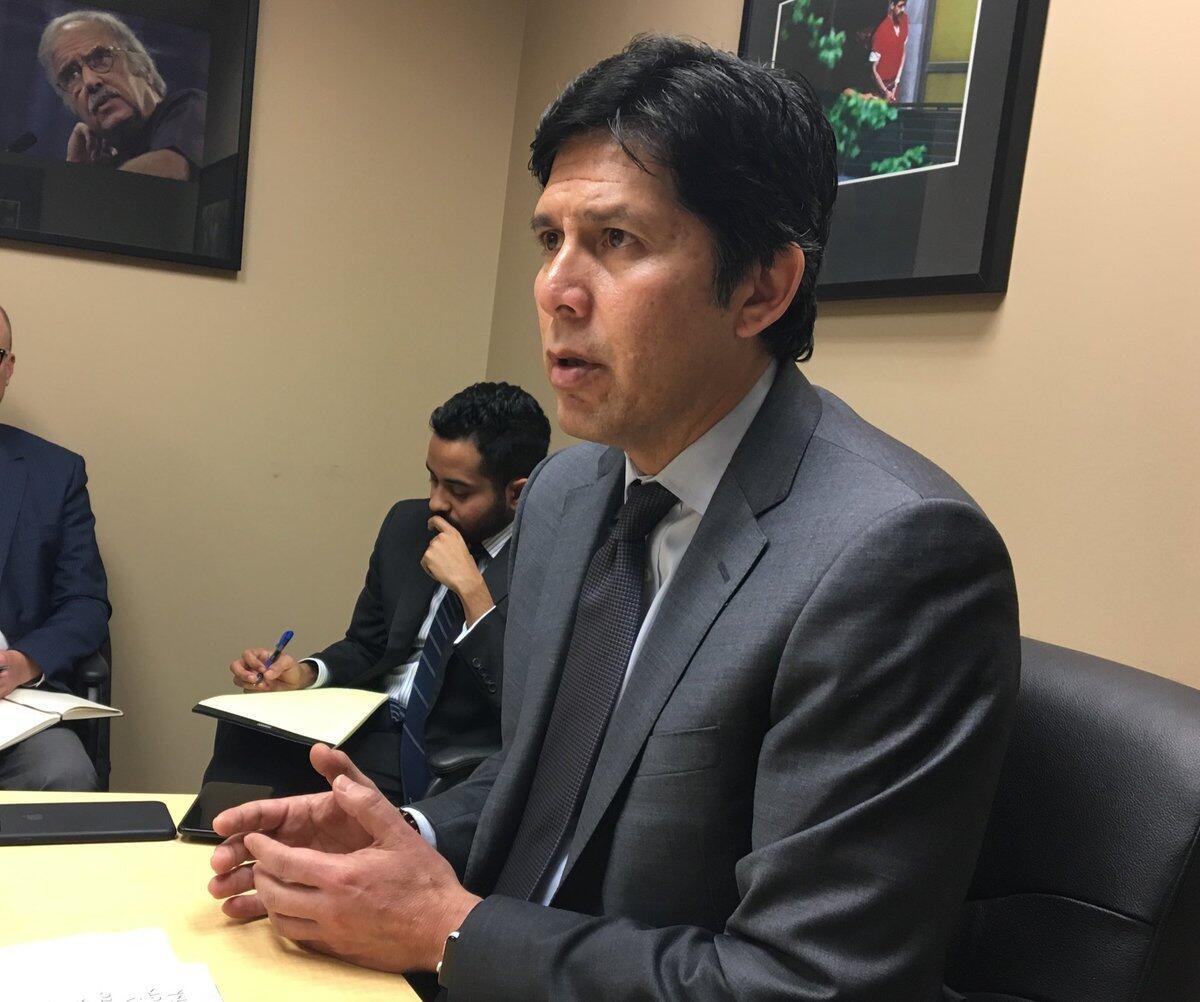
California Senate leader Kevin de León said Thursday that incoming President Donald Trump’s planned crackdown on immigrants in the U.S. illegally is sowing fear of “marauders coming into a village and raping and pillaging.”
The Los Angeles Democrat told Los Angeles Times Sacramento bureau reporters that the new administration threatened California’s fundamental values. He pledged to continue his role at the center of the state’s political resistance to Trump, especially on immigration, climate and healthcare policies.
Trump officials have indicated that the new president could move soon after he takes office Friday on plans to increase prosecutions of those suspected of violating the country’s immigration laws and make high-profile workplace raids. De León said Trump wanted to “seed confusion and chaos” with his proposals.

The Inauguration of Donald Trump
“It almost seems that they want to shock and awe and instill fear,” De León told Times reporters.
On healthcare, De León said Trump and the Republican-led Congress’ plans to repeal President Obama’s signature Affordable Care Act could lead to millions of Californians losing coverage if no replacement is passed. The state, he said, doesn’t have the $20 billion needed to backfill the losses in federal subsidies used to expand the state’s healthcare rolls under Obama.
Republicans, he said, will have to own the effects of those changes.
“The blood will be on their hands,” De León said. “Because there’s no hyperbole or exaggeration when I say people will die as a result.”
De León also shared the concerns of Rep. John Lewis (D-Ga.), who has said that Trump’s election was illegitimate due to alleged Russian involvement in hacking and disseminating information damaging to Trump’s opponent, Hillary Clinton.
“He may have secured the presidency through illegitimate means,” De León said of the president-elect.
One California lawmaker hopes the state will inspect marijuana candy to make sure it isn’t marketed to children
The coming sale of marijuana-infused candy and baked goods for recreational use in California has one lawmaker demanding close inspection of every wrapper by the state to make sure the products are not marketed to minors.
Assemblyman Ed Chau (D-Monterey Park) has introduced a bill that would require a state agency to inspect the labeling of any edible pot product to make sure it is not attracting children and inspect its packaging to make sure it is child-resistant. Labels with cartoon characters or child-friendly names could be vetoed by the state Bureau of Marijuana Control.
“As it pertains to marijuana legalization in California, children must come first,” Chau said Thursday.
California voters in November approved an initiative that requires the state to begin issuing licenses to businesses to sell marijuana products by Jan. 1, 2018. The measure broadly prohibits marketing to minors, but Chau’s measure requires inspections by the state.
“With edibles growing in popularity as an alternative form for consuming marijuana, it is important that we establish a packaging and labeling approval process to ensure that these products are child resistant, and not made in a way that is specifically attractive to children,” Chau said.
Sen. Kamala Harris to speak at Women’s March on Washington
Candidates in race for Rep. Xavier Becerra’s seat will join women’s marches in L.A. and Washington
As the nation looks toward the inauguration of Donald Trump on Friday, some candidates in the 34th Congressional District race are preparing to take action, taking part in marches in L.A. and Washington, D.C.
Wendy Carrillo, an activist who was brought to the country illegally as a child from El Salvador, is among the speakers scheduled to address the Women’s March on Washington.
Carrillo, who will share the stage with activist icons such as Gloria Steinem, Angela Davis and Planned Parenthood’s Cecile Richards, plans to speak about her experiences fleeing war in El Salvador and discovering at age 13 that she was living in the U.S. illegally. (Her father, who was a legal resident, later successfully petitioned the U.S. government to grant Carrillo and her mother residency.)
“I’ve never spoken to a crowd that big. I’m nervous, but I’m inspired for al the right reasons,” she said. “If my story can resonate and give people hope ... then I’m all for it.”
Carrillo said she doesn’t plan to mention her run for Congress during her speech.
Carrillo is one of many vying for the seat expected to be vacated by Rep. Xavier Becerra (D-Los Angeles) if he is confirmed as California’s next attorney general.
Also joining the march on Capitol Mall on Saturday are candidates Maria Cabildo, director of homeless initiatives for L.A. County, and Sara Hernandez, a former aide to L.A. City Councilman Jose Huizar who recently stepped down from her post at Coro Southern California.
“I’m not going to wait until I’m elected to take the fight to Washington,” Hernandez said in a statement. “Our rights are on the line right now.”
In downtown Los Angeles, candidate and former school board member Yolie Flores will help kick off the Women’s March Los Angeles on Saturday morning. Other scheduled speakers at the Pershing Square event include L.A. County Supervisor Hilda Solis, Assemblywoman Cristina Garcia (D-Bell Gardens) and Assembly Speaker Anthony Rendon.
UPDATE
4:43 p.m.: This post was updated to include Cabildo’s participation in the Washington march.
It’s time to tax candy in California, state lawmaker says

Californians might soon vote on whether to tax candy, potato chips and other snacks if lawmakers approve a new proposal from a Los Angeles legislator.
Assemblywoman Cristina Garcia (D-Bell Gardens) wants her colleagues to support a ballot measure that would repeal a 1992 initiative that barred the state from taxing snacks. Taxing such goods could have brought in $1 billion in revenue last year, according to a state Department of Finance estimate.
The new tax dollars would provide money state lawmakers could use to eliminate sales taxes on other items. Last year, Gov. Jerry Brown vetoed bills that would have exempted those taxes on tampons and diapers, saying they would cost the state too much. Garcia had authored the tampon proposal.
“As I took a closer look at our tax code, it became apparent that while California’s policy is to tax luxury items, the reality is that it’s inconsistent,” Garcia said in a press release. “We tax necessities like tampons but exempt chocolate bars.”
Because Garcia’s proposal is an amendment to the state Constitution, it requires a two-thirds vote of the Legislature to go on the statewide ballot.
Here’s one way Rep. Linda Sanchez thinks Democrats should fight Obamacare repeal

Rep. Linda Sanchez has a plan for how to approach Democrats’ upcoming fight with Republicans over healthcare: Keep talking about it.
As Republicans race to repeal the Affordable Care Act, Democrats and supporters of President Obama’s signature health care law need to emphasize to Republicans how many people rely on the act and have benefited from it, said Sanchez (D-Whittier).
“They need to hear from their constituents what a lifeline it really is,” Sanchez said. “There seems to be this lack of understanding or appreciation of what real families are living with in terms of their healthcare needs.”
Ahead of Friday’s inauguration of President-elect Donald Trump, Sanchez sat down with Times reporters and editors Tuesday afternoon to talk about Trump, and her plans as the newest member of House leadership.
Republicans are hustling to repeal the Affordable Care Act, also called the ACA or Obamacare, soon after Trump takes office, but it isn’t clear yet what will be proposed in its place, or when that replacement will presented.
“We’re gearing up for that fight. California stands to lose a lot if ACA is repealed,” she said. “We are going to be getting the message out, not just about the individuals who are impacted negatively if it goes away, but the job losses that could occur and the fact that the state of California itself is at risk for losing billions of dollars in funding.”
Last month, House Majority Leader Kevin McCarthy (R-Bakersfield) asked top political figures across the country for input on how to replace the Affordable Care Act. The response from California Gov. Jerry Brown and state leaders was abundant and grim.
A report released in December from the UC Berkeley Center for Labor Research and Education shows if the Affordable Care Act is repealed, 5 million Californians could lose health insurance, 200,000 healthcare related jobs could disappear, and Medicaid funding and individual subsidies losses could equal $20.5 billion.
She said as the public learns more about what was in the Affordable Care Act — like access to cancer screenings and no copays for checkups or birth control — the more frustrated they’ll become with the prospect of repeal without a replacement plan.
“Republicans are so good at messaging they’ve managed to convince everybody that Obamacare is bad, even if they are beneficiaries of it. But, you take it away from folks and suddenly they are going to understand exactly what Obamacare was and meant,” she said.
Sanchez also said that while she respects the dozens of members who have decided not to attend the inauguration Friday, including 16 Californians, she’s going to make a point.
“My goal is to be front and center,” she said. “I’m going to be the biggest pain in the neck that I can be.”
Sanchez said she wants to be the member Trump hates to see because she is constantly hounding him on immigration, healthcare and other priorities for her mostly southeast L.A. County district.
“My role in the next four years is to be as vocal an advocate as I can for what my constituents want and need and I will put myself in Donald Trump’s path at every turn to confront him about these issues,” Sanchez said.
Have climate policies helped San Joaquin Valley? New report says yes
As California lawmakers prepare for another round of debating the best way to combat climate change, a new study says the San Joaquin Valley is benefiting economically from the state’s policies on global warming.
The report comes from Next 10, a public policy think tank that partnered with researchers at UC Berkeley to crunch the numbers.
F. Noel Perry, a venture capitalist who founded Next 10, said they studied the valley because it has struggled with poor air quality and an economy that’s sluggish when compared to the state’s coast.
“We think the San Joaquin Valley is a bellwether for climate policy,” he said. “If climate policies work in the valley, they can work in other areas of California and many other areas around the nation.”
Politicians who represent the region in the Capitol have also been skeptical of state regulations, and it’s unclear whether they’ll be swayed by some of the report, which analyzed the cap-and-trade program, renewable energy standards and energy efficiency initiatives. According to the study, there has been $13.4 billion in economic benefits, primarily from the construction of solar generation facilities.
More jobs are being gained than lost, researchers said.
“In one of the most economically depressed parts of the state, if not the country, we’re seeing these policies create economic benefits,” said Ethan Elkind, director of the climate program at UC Berkeley’s Center for Law, Energy and the Environment.
A previous report from Next 10, released last summer, also found benefits from the state’s climate policies. The research said California was among the world’s leaders in generating renewable energy.
California withdraws request to let people in country illegally buy insurance on Obamacare exchange
Sen. Dianne Feinstein just gave an extremely heavy hint about her 2018 plans

Sen. Dianne Feinstein (D-Calif.) hasn’t announced yet whether she’ll run for reelection in 2018, but she gave a very strong indication that she wants to in an interview with Northern California’s KQED on Wednesday.
Feinstein, who at 83 is the oldest member of the Senate, has been coy on her plans, and news that she had a pacemaker installed last week reignited speculation about whether she will pursue another term.
Feinstein was asked by reporter Scott Shafer if she had made up her mind about seeking another term in the Senate, to which she replied, “No. I will, but I haven’t right at the moment.”
Her staff called that the “operative exchange” of the interview, but the rest is below so you can make up your mind:
“What I’ve said is, as long as I feel I can get things done, and I can, then I think I benefit the people of my state as opposed to someone new coming in. That, I realize is in anyone’s mind is different, but you asked me what I think. If I can produce, and I can produce, and I can continue to produce, then I will continue to produce. If I believe I can’t, either by health or any other way, I won’t, but as long as I believe I can, I will,” Feinstein said. “Is that pretty clear?”
“It’s clear and to me it sounds like you’re ready to run for reelection,” Shafer responded.
“Well, that’s sort of true,” she said. “I’ll make it formal at an appropriate time.”
Listen to the audio:
Rep. Xavier Becerra commits to staying with state attorney general job for foreseeable future
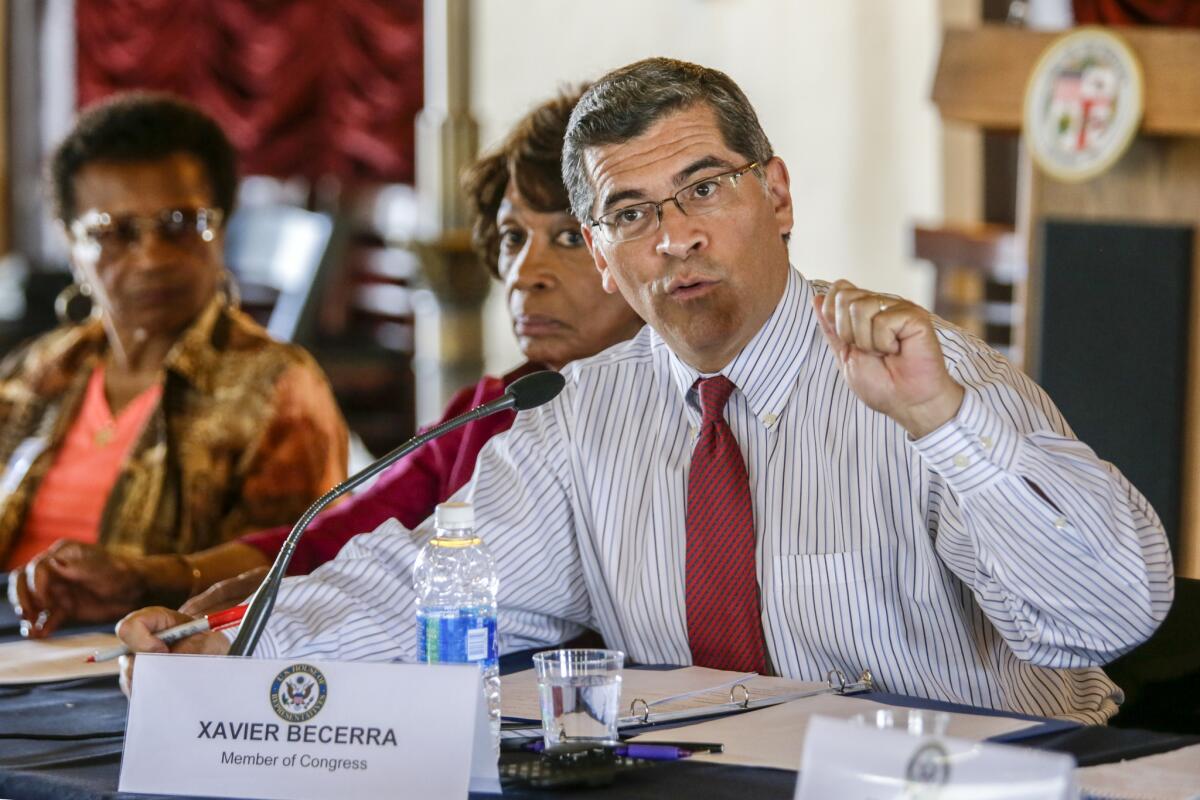
After answering questions on the death penalty, marijuana, guns and abortion, Rep. Xavier Becerra moved a step closer Wednesday to becoming California’s next attorney general when the Senate Rules Committee voted 3-1 to recommend his confirmation.
The Democratic congressman from Los Angeles is expected to be confirmed by the full Senate next week, filling a vacancy caused when Attorney Gen. Kamala Harris was elected to the U.S. Senate.
Becerra assured senators Wednesday that he intends to stay on the job as attorney general beyond the remaining two years of the current term, which would require running for reelection in 2018, a commitment sought by Senate President Pro Tem Kevin de León (D-Los Angeles), the committee’s chairman.
De León said a long-term commitment is required because the state is about to enter into a battle with the incoming administration of President-elect Donald Trump, who has threatened to roll back many California policies on issues including the environment and immigration.
“This committee and this body needs a very clear understanding with no ambiguity that you are committed to the position as attorney general of California because there will be multi-year projects that will have to be fulfilled,” De León said during the hearing.
De León said he is not looking for “someone who is just a caretaker for x amount of months.” He said he wants “someone who is dedicated to the position and dedicated the people of California.”
He then asked Becerra: “Are you committed to serve in this office for the foreseeable future?”
“Absolutely,” Becerra said.
De León returned to the question later, asking for an explicit “yes or no” as to whether Becerra would run for the office in 2018, but Becerra declined to answer, saying it would require speculation on things beyond his control.
After being pressed a third time, Becerra seemed to satisfy De León’s concerns with a more definitive statement.
“It is my full intent to serve in this position for as long as I am able to by statute, by force of law in the state of California, which would be far more than two years,” Becerra said, before De León joined the other Democrats on the panel in voting for his confirmation.
Becerra’s confirmation was opposed by state Sen. Tom Berryhill (R-Modesto), the lone Republican member of the committee present Wednesday. Berryhill worried that Becerra’s record indicates he will not adequately support gun owners’ rights.
“There is concern out there about your lack of criminal justice experience,” Berryhill added, noting that Becerra’s four years in the state Department of Justice were on the civil side.
The congressman said public safety is a priority.
Asked about the death penalty, Becerra said the state needs to put more reforms and resources into implementing it so that it is fairly applied.
“I support the death penalty, but I hate the way it’s being executed,” he said in response to a question.
Becerra indicated he agreed with voters who in November legalized the recreational use of marijuana in California.
“It was wise for us to regulate versus criminalize marijuana, but we do face some challenges,” he said. Becerra said he will play a role as the state works to establish standards for determining when drugged drivers are impaired and a system for licensing and tracking pot sellers.
He promised to whittle away a backlog of those who have guns even though they are disqualified from possessing them because of criminal convictions.
Asked about abortion rights, Becerra noted he is a Catholic who wants to make sure every single being can succeed. “But I will fight as hard as I can for a woman to be able to decide what’s best for her reproductive rights,” he said.
He also said he would vigorously defend California’s law allowing physicians to prescribe lethal doses of drugs to terminally ill patients who want to hasten their deaths.
Becerra promised to defend the state’s policies against any threat of rollback by the incoming Trump administration.
“We are a very forward-leaning state,” Becerra, a 12-term congressman, told the panel. “We are not looking to go back in time.”
L.A. Mayor Eric Garcetti calls for ‘Dreamers’ to be protected at mayors meeting in Washington
Los Angeles Mayor Eric Garcetti announced Wednesday that a bipartisan group of the nation’s mayors is calling for Congress and the incoming Trump administration to continue a program that delays deportation of people brought to the U.S. illegally as children.
Garcetti and 59 other California mayors are in Washington this week to attend the U.S. Conference of Mayors’ annual meeting.
The mayors group has long called for Congress to pass comprehensive immigration reform. But the resolution passed by the group Wednesday also specifically asks the new administration and Congress to protect thousands of so-called Dreamers from deportation.
“This resolution says to the American people that regardless of party or of ideology, America’s mayors are united in the belief that we must and we can fix our broken immigration system,” Garcetti told reporters.
California is home to an estimated one-third of the 750,000 young people who were given deportation relief through a program created by the Obama administration called Deferred Action for Childhood Arrivals, or DACA. California’s members of Congress have pleaded with the Obama administration to keep detailed personal information provided by the participants from being used to deport them.
“These are people we can point to in our communities as aiding our economies, as starting our businesses, as making our streets safer. My main point is, let’s not go backwards,” Garcetti said.
President-elect Donald Trump pledged during the campaign to deport millions of people who are in the country illegally, though he’s hinted that the Dreamers may not be targeted. Two Republican senators have joined Democrats in proposing legislation to keep the program operating for a few more years.
Garcetti said the mayors are hopeful for immigration reform, but are also preparing to defend their residents from deportation if needed. Last month, Los Angeles city and county leaders announced a $10-million fund to provide legal assistance for some residents facing deportation. But Garcetti said reform would be better than lengthy court cases.
“Given how slow moving the immigration courts are right now, as long as this isn’t done in some illegal way, if there is an attempt at mass deportations and people get their day in court, this is something that could take decades,” Garcetti said. “Let’s solve the problem instead of fighting it out one case at a time.”
Gov. Jerry Brown touts partnerships with China amid warnings about the future

President-elect Donald Trump may seem eager to rattle nerves in China, whether it’s a phone conversation with Taiwan’s leader or complaints about foreign trade, but California Gov. Jerry Brown doesn’t want anything to do with that.
In another example of how the state plans to stand apart from the incoming administration in Washington, Brown went to the Chinese consulate in San Francisco on Tuesday to speak at a Lunar New Year celebration to reaffirm what he called the state’s “great interest” in working with China.
“There will be a few side arguments in Washington,” Brown said. “Don’t worry. When it comes to California and China, we’re on the right track, and we’re going to stay there.”
California has collaborated closely on climate change with Chinese officials, who have studied the state’s programs as they formulate their own. Brown said the state also has benefited from China’s production of solar panels, helping to drive down the cost of renewable energy.
“We are working together with China,” he said. “Whatever little differences we have, or whatever big differences, the fact is, we have one world. We have one space we’re all connected by.”
Brown’s brief comments at the consulate weren’t all rosy. Often preoccupied with existential threats, he told the audience that he wanted to make sure they “walk out of here with at least three things to worry about.”
First, he said, “you will suffer” if climate change isn’t addressed. Second, nuclear bombs could “get used by somebody,” which would be “very bad.” Third, the global financial system “might collapse again.”
“That’s a lot to worry about,” Brown said.
Rep. Alan Lowenthal is skipping inauguration over Trump’s comments about Rep. John Lewis
Rep. Alan Lowenthal (D-Long Beach) initially said he would attend Donald Trump’s inauguration Friday out of respect for the office, but said Wednesday he changed his mind after seeing Trump’s comments on Twitter over the weekend about civil rights icon Rep. John Lewis (D-Ga.).
“President-elect Trump’s recent attacks on Rep. John Lewis were beyond the pale and served as a tipping point which made me re-evaluate my original intention to attend,” Lowenthal said in a statement. “On inauguration day, our nation invests the president-elect with executive power. We do not anoint the president with respect. Respect must be earned. Donald Trump, in his attacks on Rep. Lewis, and minorities, and women, and the disabled, has yet done little to earn my respect.”
The incoming president’s comment that Lewis, who is called the “conscience of the House” and was beaten repeatedly while protesting for civil rights, is “all talk … no action” drew the ire of dozens of Democrats who now say they will skip Friday’s festivities. Lowenthal is the 16th Californian to announce he will not attend.
Police officers could face more restrictions at schools under two new bills
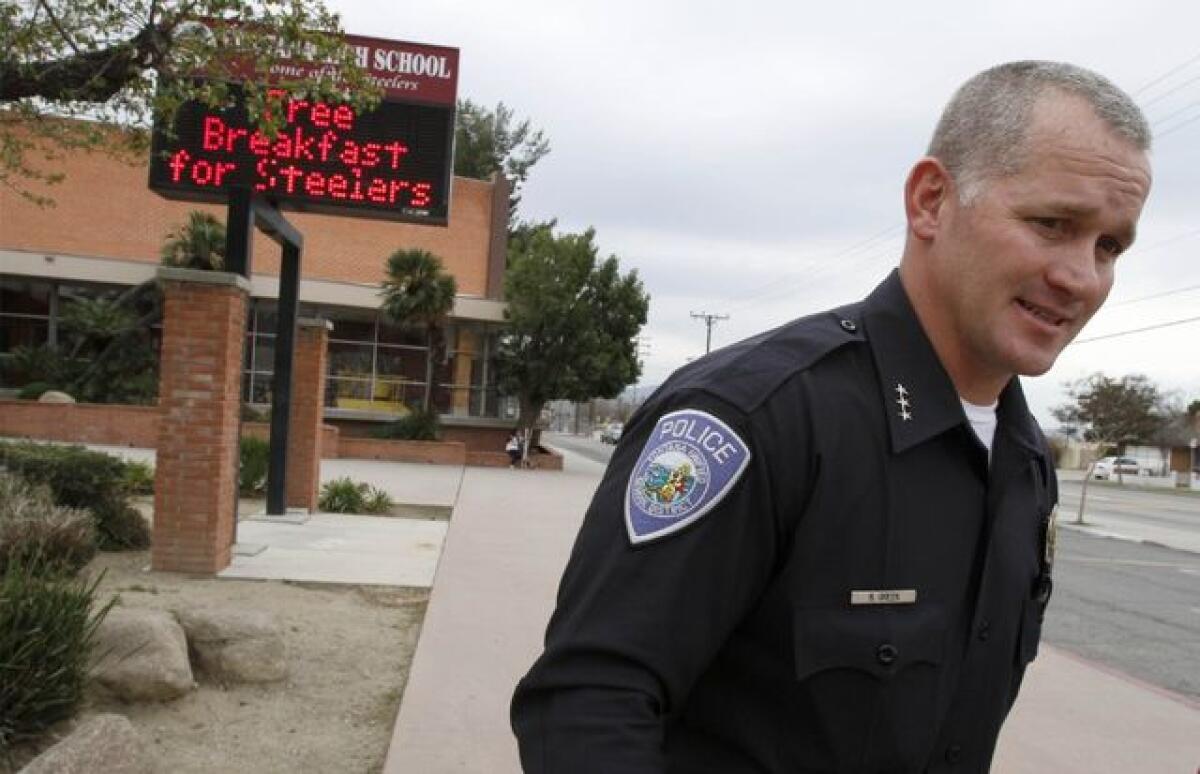
Two state lawmakers want to tackle how schools discipline their students and have introduced bills that would tighten rules for how police officers can operate on school sites.
Assembly Bill 163 from Assemblywoman Shirley Weber (D-San Diego) would prohibit school officials from calling law enforcement to handle violations of school rules or low-level misconduct and require the consent of a principal and parent before interviewing students. The bill was prompted by recent research by the American Civil Liberties Union of California that showed police officers increasingly involved in disciplinary issues at schools and disproportionate arrest rates for low-income students of color, Weber’s office said.
The report found, for instance, that black students were three times more likely than white students to have a school-related arrest.
Assembly Bill 173 from Assemblyman Reggie Jones-Sawyer (D-Los Angeles) would prohibit school officials from calling local police or sheriff’s departments to arrest students during the day for a variety of low-level offenses, including trespassing, vandalism and alcohol possession.
Assemblyman Jimmy Gomez scores endorsement of powerful public employee union in race to replace Becerra
Assemblyman Jimmy Gomez (D-Los Angeles) got a major boost in his bid to replace Rep. Xavier Becerra (D-Los Angeles) on Wednesday, receiving an endorsement from the American Federation of State, County and Municipal Employees, the largest public employee union in the nation.
Gomez, 42, is regarded by political consultants and observers as a front-runner in the race to succeed Becerra, who is expected to be confirmed as state attorney general in the coming days.
“Jimmy has proven time and again that he understands the hopes and dreams of these working families because he’s spent his entire career listening to their voices and fighting for their interests,” Brian A. Allison, political and legislative director for AFSCME California, said in a statement. The union represents 1.3 million public sector employees and retirees nationwide, including 179,000 in California.
At the time he was elected, Gomez was political director for the United Nurses Assns. of California. Other candidates vying for the seat also have backgrounds in organized labor: Wendy Carrillo is a former journalist and local labor activist and Raymond Meza is an organizer for the Service Employees International Union Local 721, which was central in the “Fight for $15” campaign to increase the minimum wage.
Rep. Xavier Becerra addresses Obamacare, pot at state atttorney general confirmation hearing
Early poll in race to replace Becerra suggests voters care most about healthcare, immigration and opposing Trump
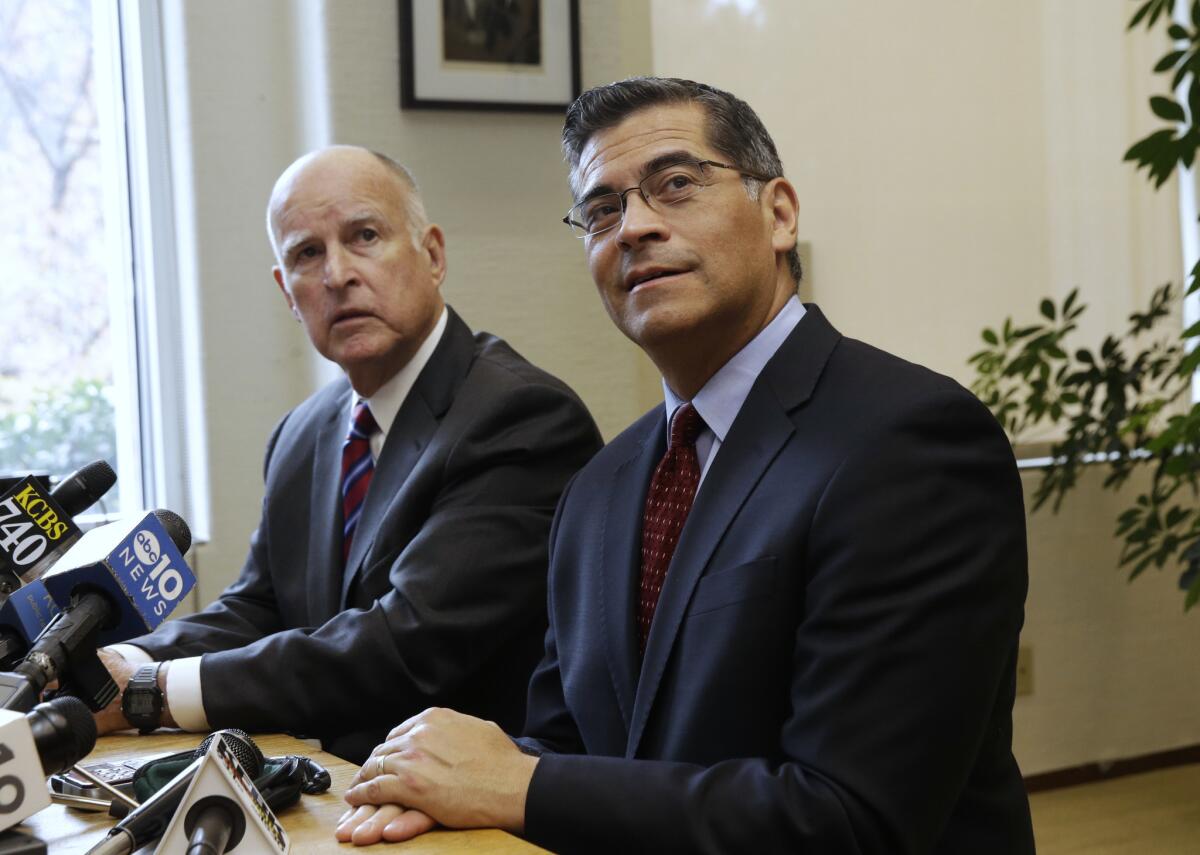
Healthcare, immigration and opposing President-elect Donald Trump: These are the issues voters in the 34th Congressional District care most about, according to a new poll.
Gov. Jerry Brown is expected to call a special election to replace Rep. Xavier Becerra (D-Los Angeles), who is all but certain to be confirmed as California’s new attorney general. At least 16 candidates, most of them Democrats, have already said they intend to run for Becerra’s seat.
According to the poll, conducted by research firm Latino Decisions, 21% of those surveyed said healthcare is the single most important issue they want their member of Congress to address. Immigration, opposing Trump, and standing up for constituents each were listed by 17% of respondents as most important.
The poll also suggests the electorate’s anti-establishment mood last year might extend to this election, which has yet to be scheduled but will likely happen this spring.
About half of surveyed voters said they would prefer an outsider candidate who has worked as a community organizer, while 70% said they would rather elect someone who raised most of their money in small donations. An endorsement from Vermont Sen. Bernie Sanders, who carried the district in the Democratic presidential primary last year, would carry weight with more than 70% of the district’s voters, according to the poll.
More than half of those surveyed believe Sanders would have beaten Trump if he had been the Democratic nominee, and 47% believe that the Democratic Party has been “taken over by corporate interests.”
Although it’s still early in the campaign season, all these signs could indicate a tougher-than-expected road ahead for Assemblyman Jimmy Gomez, who has won several endorsements from establishment Democrats and elected officials, and has been widely regarded as the early favorite in the race.
The poll, which surveyed 400 likely voters in English and Spanish on cellphones and landlines, was conducted Jan. 10 to 14. The poll emphasized primary voters, who are generally more motivated in low-turnout elections, and weighted results according to the gender, age and ethnicity demographics in the district, which is heavily Latino and Democratic.
State lawmaker wants students taught about ‘Russian interference’ in last year’s presidential election
California schools would be required to teach how the Russian government “conspired to influence” last year’s presidential election under a bill written by a Bay Area legislator.
Assemblyman Marc Levine (D-San Rafael) said his proposal would require the California Board of Education to develop a curriculum plan that addresses the allegations made in the wake of President-elect Donald Trump’s victory on Nov. 8.
“California is the largest textbook market in the nation,” Levine said in a statement Tuesday. “Through this legislation, we can make sure students in California and across the United States receive accurate information about the 2016 presidential election.”
Levine’s proposal, introduced three days before Trump takes office, hinges on the Jan. 5 congressional testimony of U.S. intelligence officials that senior Russian officials approved an operation designed to interfere with the presidential race between Trump and Democratic nominee Hillary Clinton.
In lawmakers’ first hearing on state budget, Gov. Jerry Brown’s staff gets grilled on a $1.5-billion mistake
Gov. Jerry Brown’s budget team offered a seemingly simple explanation on Tuesday for an almost $1.5-billion accounting error in California’s healthcare program for the poor.
“The math was wrong,” said Amy Costa, the chief deputy director of Brown’s state Department of Finance, in a Senate committee hearing.
The mistake drew sharp criticism from some state senators, who suggested it should be viewed it in the context of Brown’s projected $1.6-billion deficit and the $3.2 billion in spending cuts he has proposed to help balance the books.
The error was reportedly discovered last fall, but was not reported to the Joint Legislative Budget Committee until Jan. 13. And while testimony on Tuesday pegged the mistake at $1.4 billion, the total is actually closer to $1.5 billion.
Budget staffers said there were, in fact, two mistakes:
- A double counting of state savings from a program that coordinates health, behavioral and long-term care services with local government. That error understated expenses by $913 million.
- A forgotten state government cost from two counties — San Mateo and Orange — enrolling in the coordinated program, which meant missed expenses of $573 million.
Neither of those specific numbers appears in the budget unveiled last week. And the governor’s budget spokesman said after Tuesday’s hearing that the issue was unrelated to Brown’s controversial budget plan to end the coordinated care program in which the mistake was made.
In an exchange with Brown’s budget team, Sen. Richard Pan (D-Sacramento) pointed out that two ballot measures boosting healthcare dollars — a hospital fee under Proposition 52 and a tobacco tax increase under Proposition 56 — are projected to add revenue of around $1.4 billion, a number similar to the budget mistake.
“We’re bringing in some additional revenue,” Pan said. “Are we using the $1.4 billion to fill in the calculation error?”
Costa told the senator that there’s no relationship between the two numbers, but Pan seemed unconvinced.
“We’ll let the attorneys figure it out,” Pan said.
Democrats and celebrities defend Planned Parenthood at Capitol ‘Pink Out’ rally
Seeking to mobilize California’s abortion-rights tilt to influence a brewing fight in the nation’s capital, Democrats and celebrities including Lena Dunham and Wilson Cruz rallied a crowd of a several hundred Tuesday against the effort to strip Planned Parenthood of federal funds.
The throng of Democratic lawmakers, dressed in pink, illustrated the healthcare provider’s far-reaching popularity in California politics. The friendly reception stands in stark relief to the organization’s standing in more conservative states, or in the Republican-dominated Congress.
“We are not immune in California,” Nancy McFadden, a top aide to Gov. Jerry Brown, told rally-goers. “We don’t have to convince our representatives... but we have to help people across the country convince senators and representatives in Congress that they should not roll back the clock on women.”
Left unmentioned was the potential effects of a national defunding effort on the state budget. Leaders of Planned Parenthood estimate the organization could lose $260 million in federal funds in California alone. But so far advocates have refrained from publicly pressing for the state to step into the gap, focusing first on blunting the defunding push on the federal level.
House Speaker Paul Ryan (R-Wis.) has said prohibiting federal money from going to the controversial organization will be part of the congressional efforts to roll back the Affordable Care Act.
Political figures, including billionaire activist Tom Steyer and leaders of both legislative houses, clamored in the overcast chill to tout their bona fides as allies of the group.
“Defunding Planned Parenthood isn’t just a women’s issue. It’s a women’s rights issue,” said Senate leader Kevin de León (D-Los Angeles). “Men need to stand up.”
Resolutions in favor of Planned Parenthood were also set to be taken up in both houses on Tuesday afternoon.
Grocery store worker Megan Traynor, wearing a home-made T-shirt emblazoned with a drawing of a uterus, said she came to the rally because her parents had benefited from Planned Parenthood’s family planning services, including directing them to resources to care for one of their children, who is on the autism spectrum.
“I feel that revoking funding for Planned Parenthood is an attack on low-income families,” said Traynor, an 18-year-old from Sacramento.
L.A. planning commissioner is latest to join 34th Congressional District race
Los Angeles Mayor Eric Garcetti endorses Tom Perez for DNC chair

Los Angeles Mayor Eric Garcetti said Tuesday he’s supporting Tom Perez, President Obama’s Labor secretary, to become the next chair of the Democratic National Committee.
Garcetti cited Perez’s support for a $15-per-hour minimum wage and his work to end a standoff between union leaders and management officials at Southern California ports.
“All sides knew they were getting an honest broker and proven leader, and he was an excellent partner in our ultimately successful negotiations,” Garcetti said in a statement. “We need him as DNC chair because he knows how to lead, how to organize and how to communicate.”
Perez is one of several people running for the chair in the first competitive race the party has seen in more than a decade.
As the candidates tout their liberal credentials, Garcetti vouched for Perez’s track record.
“I have seen Tom deliver progressive results for working families in my city and across the nation,” he said.
Perez welcomed the endorsement in a statement.
“From Los Angeles to Las Cruces [N.M.], we need to get the party back to basics by investing in local parties and organizing in every ZIP code,” he said.
Lawmakers want to make it easier for pot shops that have to pay their taxes in cash
Worried about the safety of newly legal marijuana businesses carrying a lot of cash, two state lawmakers have introduced a bill that would make it easier and less risky for them to pay state taxes.
With licenses for marijuana shops expected to be issued by the end of the year, Democratic state Sens. Scott Wiener of San Francisco and Toni Atkins of San Diego have proposed that pot taxes be collected at many more locations. Current law allows marijuana businesses to pay their taxes only at one of the 22 offices of the state Board of Equalization.
The proposed new law would expand collection points to include many county offices, so business people will not have to carry large amounts of cash long distances.
“We need to make it as easy and safe as possible for cannabis business owners to pay their taxes and fees, and we should not force them to drive hundreds of miles with a trunk full of cash just to comply with the law,” Wiener said, adding the bill was requested by Board of Equalization Chairwoman Fiona Ma.
Despite voter approval of an initiative in November legalizing the recreational use of marijuana, the drug remains an illegal substance under federal law. Federally regulated banks have refused to handle the revenue, making cash payments necessary.
The measure, was welcomed by Nate Bradley, executive director, California Cannabis Industry Assn.
“The lack of these basic financial services is stunting the growth of the cannabis industry and causing the state of California to lose tax revenue and forego additional job creation,” Bradley said. “This bill will not solve all of these problems, but allowing the BOE to accept cash payments on behalf of other state agencies will help to reduce to the risks and ensure that the state is paid the money it is owed.”
Updated at 3:40 pm to include statement from Nate Bradley.
Three more California members of Congress planning to skip Trump’s inauguration, bringing total to 15
Reps. Tony Cárdenas (D-Los Angeles) Juan Vargas (D-San Diego) and Karen Bass (D-Los Angeles) are joining at least a dozen other California colleagues who are skipping the inauguration of President-elect Donald Trump.
In addition to the 15 California members, dozens of other Democratic members of Congress have announced they won’t attend the inauguration. That amounts to more than a quarter of the full delegation.
“My humble and loving parents taught me to live by this saying, ‘Dime con quién andas y te diré quién eres.’ It means, ‘Tell me who you hang out with, and I’ll tell you who you are,’” Cárdenas said in a statement Tuesday. “This week I’ve been thinking a lot about what my parents, family, and constituents would say about the situation I’m facing. After serious consideration, I have decided that I will not stand with Donald Trump during his ceremonial inauguration.”
Two of California’s Democratic members of Congress remain undecided about whether they’ll attend Friday’s ceremony, neither for political reasons.
Cárdenas said last week he was struggling to give Trump the deference he would normally extend a president regardless of party, and hadn’t made up his mind.
“I think about all the people that he has offended, over and over, past and present, and it’s painful to think that I would bring myself to actually go out there and sit there and subject myself to him just 50 feet away,” Cárdenas said.
The Los Angeles congressman will instead attend Saturday’s Women’s March on Washington with his wife and daughter to protest the new administration.
Bass was leaning toward not going last week, and asked her constituents to weigh in on the decision in a Twitter poll.
“I just don’t know that I want to be there,” Bass said. “For us to fly all the way back here, I just don’t know that I’m ready for that.”
Vargas, a former Jesuit missionary, said he will stay home and pray instead.
10:16 a.m.: Updated with additional members of Congress who have announced they will not attend the inauguration.
This post was originally published at 9:30 a.m.
Painting depicting police as pigs comes down from Capitol wall
Is your California member of Congress going to Trump’s inauguration?
Thirty-nine members in California’s 55-member delegation to Congress have told The Times they plan to attend the inauguration, where members of Congress have some of the best seats to view the peaceful transfer of power.
That includes all 14 of the delegation’s Republicans. But at least 12 California House Democrats are skipping it. Another five say they are still trying to decide.
California Politics Podcast: What’s next for Gov. Jerry Brown’s budget?
Like most years since his return to Sacramento in 2011, Gov. Jerry Brown is urging caution when it comes to the state budget.
But this time, even Democrats who have advocated for more spending seem to agree. They, like Brown, are keeping a close eye on Republican priorities in Washington.
On this week’s podcast, we take an in-depth look at the budget unveiled by Brown earlier this week. And aside from national concerns, a key question is whether some of the most ambitious efforts can muster enough support among majority Democrats.
I’m joined by Times reporter Melanie Mason, along with Marisa Lagos of KQED News and Anthony York of the Grizzly Bear Project.
About that painting California Congress members have been pulling off a U.S. Capitol wall ...
The painting, which depicts police with pig heads, has been the subject of a tug of war between House Republicans and some Democrats. Republican representatives, including Californians Duncan Hunter and Dana Rohrabacher, have been pulling it off the wall of a Capitol hallway in protest of its presence there.
More candidates say they’re running for Xavier Becerra’s congressional seat, bringing field to 16
Two other candidates said Friday morning they will join the race to replace Rep. Xavier Becerra (D-Los Angeles) in the 34th Congressional District.
William Rodriguez Morrison, a Republican, and Tenaya Wallace, a Democrat, have not yet filed papers with the Federal Election Commission, but say they will run for the seat, which Becerra is expected to vacate if confirmed as state attorney general.
Morrison, an apartment building manager, is a perennial candidate. He has run for L.A. city council, state Senate and, most recently, L.A. mayor. He dropped out of that race in December, he said.
Wallace is a public relations strategist and lives with her husband and two children in Silver Lake, which is outside the district.
Neither have raised any money so far, and Wallace has pledged not to raise more than $5,000 for her campaign.
“To me, there is so much more to do right now ... versus fundraising,” Wallace said. “I’m looking at building a coalition who feel activated and enraged and inspired, and I want to find a way to engage them.”
Later Friday, two more candidates joined the race, filing papers with the Federal Election Commission.
At least 16 candidates are now vying for Becerra’s seat, including Assemblyman Jimmy Gomez (D-Los Angeles), labor organizer Raymond Meza and activist and former journalist Wendy Carrillo.
Gov. Jerry Brown warns of major ripple effects in California if Obamacare is repealed
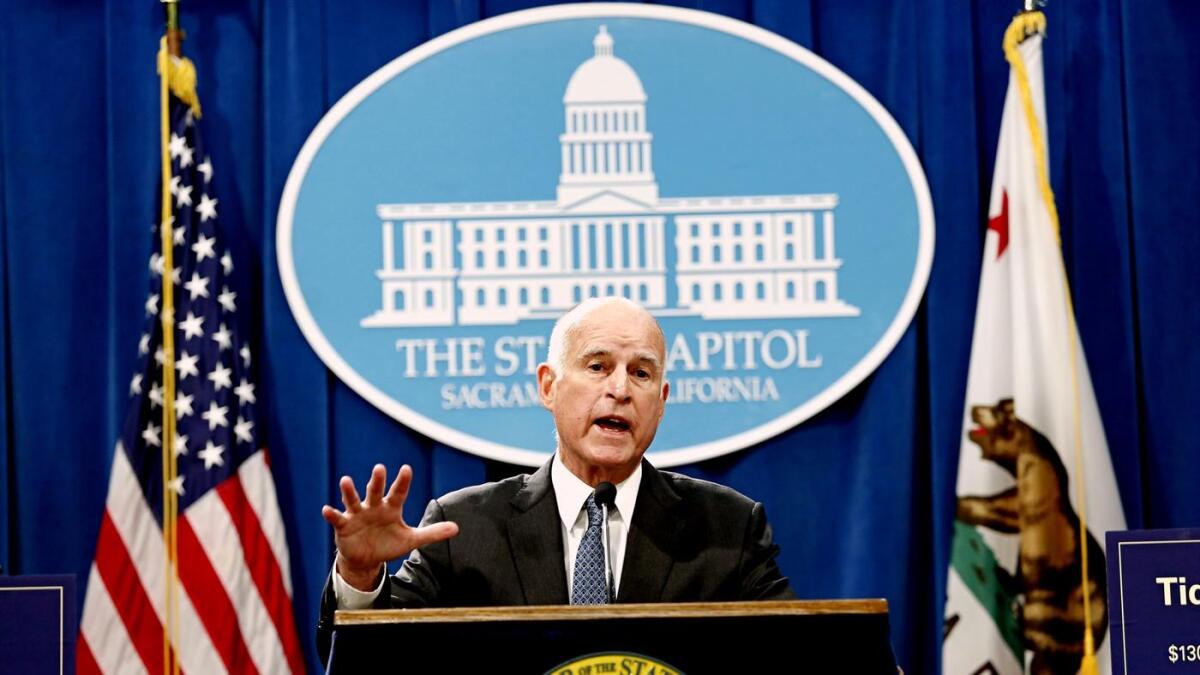
Gov. Jerry Brown issued a terse but pointed response Friday to House Majority Leader Kevin McCarthy’s request for input on repealing the Affordable Care Act, warning of spiraling damage to healthcare coverage, premium costs and the state budget.
Brown’s letter to McCarthy argued that repealing Obamacare without an alternative plan would lead to instability in the commercial insurance market. He also warned of returning to an era where emergency room care is a fallback for many.
“California stands ready to work with you and your colleagues to find decent and real solutions,” he wrote. “But I implore you: don’t just shift billions of dollars of costs to the state. That would be a very cynical way to prop up the federal budget - and devastating to millions of Americans.”
Brown’s clipped response contrasted with that of another California official’s response, state Insurance Commissioner Dave Jones.
In an 18-page missive (complete with five additional pages of footnotes) sent on Thursday, Jones argued that repealing the landmark 2010 law would “return to a time when the shadow of financial catastrophe loomed over every family.”
Jones took particular aim at insurance-related changes that some conservatives have proposed: allowing insurance to be sold across state lines and high-risk pools to insure the sickest individuals.
Of the former, Jones said such a proposal -- in which insurers could offer policies without needing to conform to the laws in the states where they’re sold -- would hurt California’s ability to enforce its own insurance regulations.
And Jones said high-risk pools are “doomed to failure” as a substitute for Obamacare, because of the high costs associated with treating the sickest patients.
Senate President Pro Tem Kevin de León (D-Los Angeles) and Senate Health Committee Chairman Ed Hernández of West Covina chimed in earlier this week with their own letter to McCarthy, touting California’s embrace of the Affordable Care Act.
McCarthy’s letter, sent last month, was addressed to governors and insurance commissioners in each state, setting Friday as the deadline for a response.
What’s in a name? This bill would allow accent marks on California birth certificates
The smiling, little boy in the photo is Nicolas — not Nicolás, as his father, Pablo Espinoza, wanted to name him when he was born in May at a Los Angeles hospital.
“We thought it was an issue of the keyboard,” said Espinoza, special projects media consultant for Assembly Speaker Anthony Rendon. Instead, it was a result of state law.
Due to Proposition 63, which voters approved in 1986, English became the official language of California. Since then, legislative analysts say, the Department of Public Health has interpreted the rule to mean that diacritical marks, such accents (è or á), umlauts (ö or ü) and tildes (ñ or ã), on vital records are unacceptable.
This legislative session, a bill filed by Assemblyman Jose Medina (D-Riverside), with urging from Espinoza, aims to overturn the ban. The proposal would allow diacritical marks on marriage licenses and certificates of birth, fetal death or death.
Supporters say a name is intimately tied to history and family, tradition and identity. And they say the law is currently not equally applied: Hospitals allow names such as “O’Doyle” to be annotated properly on vital records but not those such as “Chloë” or “José.” Other agencies, meanwhile, allow diacritical marks on state road and event signs.
But similar legislation has failed in the past. A bill introduced in 2014 by Assemblywoman Nancy Skinner (D-Berkeley) did not make it out of the appropriations committee after state agencies estimated it would cost $10 million to reprogram and upgrade their IT systems and searchable indexes.
Espinoza said he remains optimistic that the law will change in one of the most ethnically and culturally diverse states in the country.
“Right now, we are all talking about California being a place where your values can be respected, whether you are an immigrant or of a different ethnicity, or whether you come from another country, and it all starts with the name,” he said.
Former state Sen. Isadore Hall appointed to California Agricultural Labor Relations Board

After losing a race for Congress in November, former state Sen. Isadore Hall was appointed by Gov. Jerry Brown on Friday to the California Agricultural Labor Relations Board. He will earn an annual salary of $142,095.
Hall, 45, was appointed the same day that board Chairman William B. Gould IV announced his resignation, accusing the state bureaucracy of stalling a proposal to allow the board to demand access to farms to educate workers about their rights. Board member Genevieve Shiroma took over as chair Friday.
Since his election loss, Hall, a Democrat from Compton, has served as interim executive director of the Mervyn Dymally African American Political and Economic Institute, a public policy center at Cal State Dominguez Hills.
Hall was defeated in the Nov. 8 election by former Hermosa Beach City Councilwoman Nanette Barragán, a fellow Democrat, in the race to replace Rep. Janice Hahn.
Hall served in the state Senate from 2014 to 2016, the Assembly from 2008 to 2014 and was a member of the Compton City Council from 2003 to 2008.
The appointment requires Senate confirmation.
Legislature’s analysts think Gov. Jerry Brown’s tax revenue predictions are too low
The accuracy of revenue predictions promises to be a key part of this year’s budget debate at the state Capitol, as the Legislature’s independent analyst said Friday that there could be “considerably more” in total tax collections than estimated by Gov. Jerry Brown.
The early review of the governor’s budget plan by the Legislative Analyst’s Office was that personal income tax revenues could grow by more than the $2.7 billion estimated by Brown.
“The weak growth that the governor envisions” for income tax revenues, said the new report, “seems inconsistent with parts of the administration’s own economic outlook.”
On Tuesday, the governor proposed a $179.5-billion budget that seeks to erase a projected $1.6-billion deficit — the first deficit in four years.
But the analysts sound a note of caution to legislators about plans to spend any of what might be additional revenues. Instead, the report suggests the Legislature might want to create contingency plans for any economic changes and the impact of policies pursued by Republicans in Congress and President-elect Donald Trump.
“The Legislature may want to set its target for state reserves at — or preferably above — the level the governor now proposes,” the report said.
Gov. Brown’s state budget projects an $8-billion pension payment next year
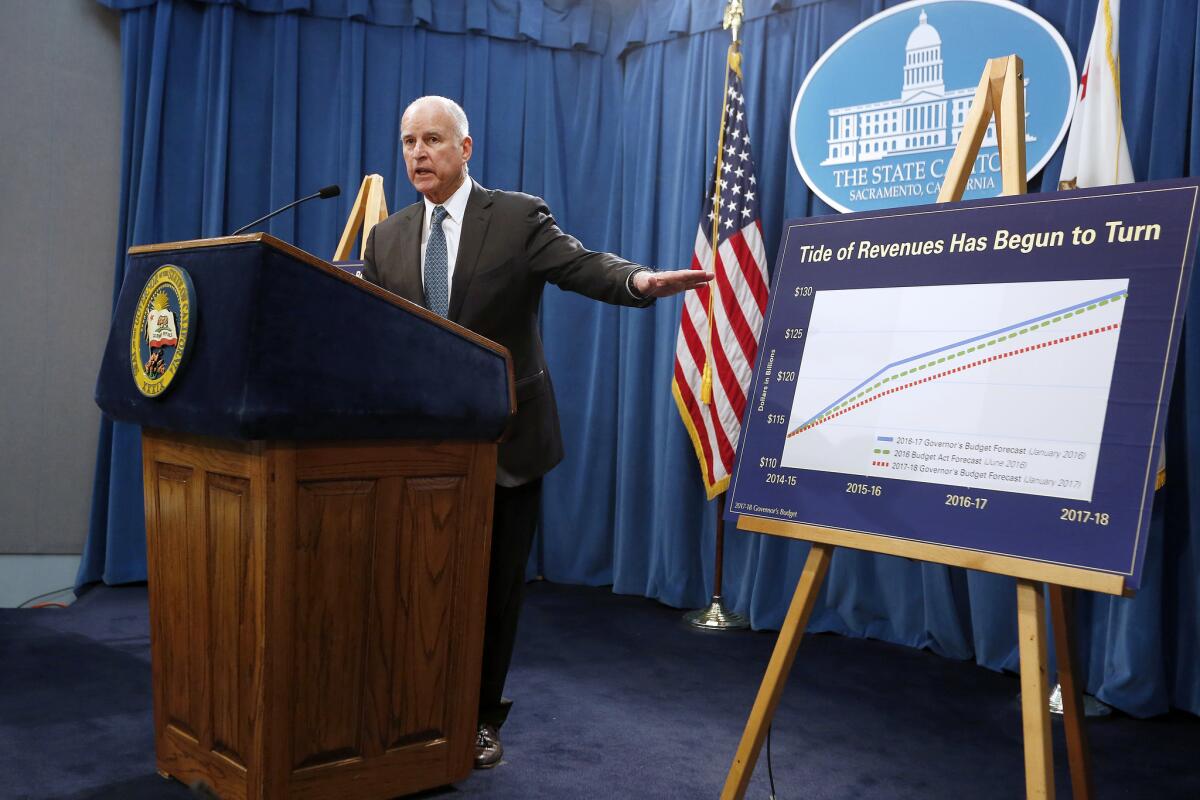
California taxpayers will soon fund the steepest rise in public employee pension contributions since 2014, and Gov. Jerry Brown suggested this week that the long-term costs will continue to be an important — but controversial — topic.
Brown’s proposed budget includes a combined $8.1 billion for payments to the California Public Employees’ Retirement System (CalPERS) and the California State Teachers’ Retirement System (CalSTRS). Public-sector pensions are financed through a combination of employee contributions, taxpayer dollars and profits earned by pension fund investments.
That figure includes a $524-million increase in annual CalPERS payments, the largest single-year boost in four years. Last month, the agency’s directors voted to lower their official investment assumptions, thus triggering a higher mandated payment from state and local governments.
The governor acknowledged on Tuesday the challenge in paying for retirement promises, as critics insist that investment returns will be lower than expected and public employee unions insist that the criticism is aimed at eliminating benefits promised to hundreds of thousands of workers.
“I would say that this will be a lively topic, but I think we’ve taken some solid steps,” Brown said on efforts to handle rising pension costs. “But in something so delicate, and so political, I would say we’re doing about what could be expected and will continue to take advantage of opportunities as they come up.”
The Times, in partnership with the nonprofit journalism organization CalMatters and Sacramento’s Capital Public Radio, has been taking an in-depth look at the state’s pension crisis and efforts to resolve it.
Kamala Harris picks former Hillary Clinton staffer as press secretary
Assembly votes to confirm Rep. Xavier Becerra as state attorney general ahead of Senate hearing next week
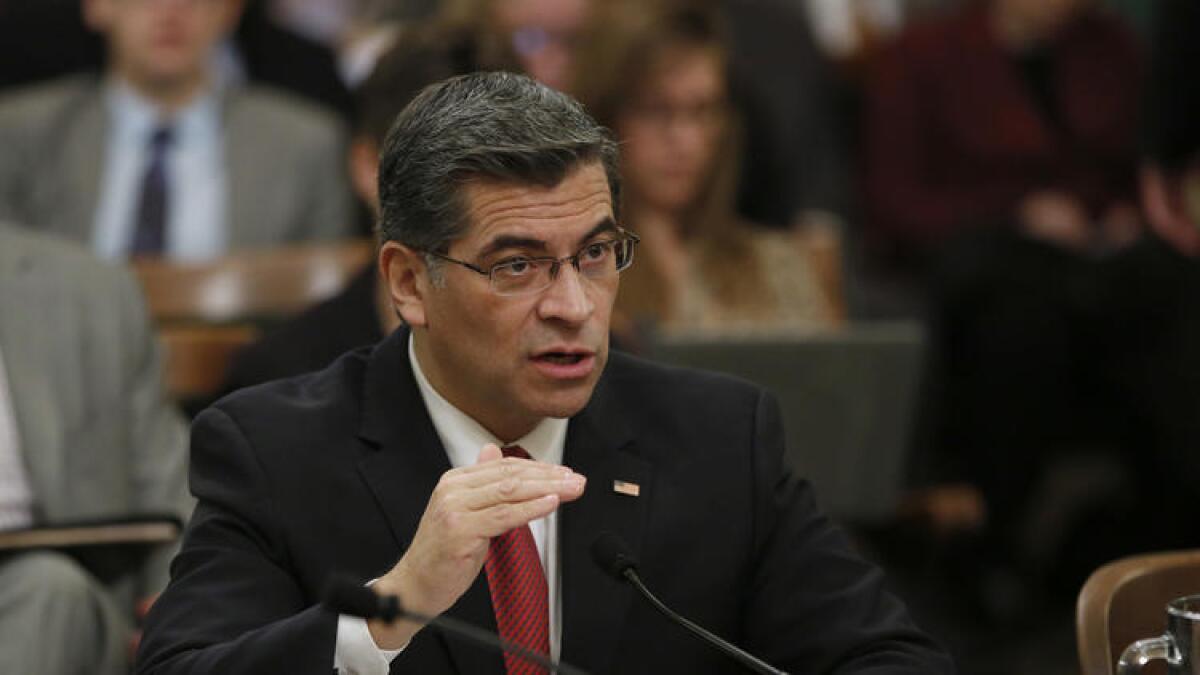
Rep. Xavier Becerra (D-Los Angeles) took a major step toward becoming California’s next attorney general on Friday when the state Assembly voted to confirm his appointment.
The vote was 56-23, with Republicans voting en masse against confirmation. Assemblyman Rocky Chavez of Oceanside was the only Republican to vote in favor of confirmation.
The state Senate is expected to give final approval next week to Becerra’s nomination by Gov. Jerry Brown to succeed Kamala Harris, who was elected to the U.S. Senate in November.
Becerra, a 12-term congressman who previously served in the state Assembly and as a deputy attorney general, would become the first Latino state attorney general in California.
The 58-year-old veteran politician has vowed to protect state policies on the environment, civil rights and immigrants in the country illegally against any attack from President-elect Donald Trump.
“He will be the tip of the spear for us in California,” Assemblyman Reggie Jones-Sawyer (D-Los Angeles) said.
Assemblywoman Eloise Gomez Reyes (D-San Bernardino) said she felt good that Becerra would be there to challenge proposals by Trump to conduct mass deportations.
“He is the fighter we need to defend our legal rights and make sure our communities feel safe,” Reyes said.
Mark Stone (D-Scotts Valley), the co-chairman of a committee that vetted Becerra, urged support for for the nominee, calling him thoughtful and approachable
“He will help us stand up for the laws that we passed, from pressures outside the state and pressures inside the state,” Stone told his colleagues. “He has promised to be a stalwart defender of our climate change laws, our education laws.”
Becerra was also supported by the Legislative Black Caucus, the Legislative Women’s Caucus and and the Latino caucus.
But Republican lawmakers said they are concerned that Becerra would not stand up for constitutional rights of gun owners, as well as for non-profit, religious medical clinics that are being forced by the state to tell clients about the availability of abortion services.
Assemblyman Jim Patterson (R-Fresno) complained that Becerra does not extend the same opposition he has for immigrant registries based on religion to registries of gun owners.
Republican Assemblyman Travis Allen of Huntington Beach objected that Becerra is planning to fight Trump and the federal government when it exercises its powers.
“Congressman Becerra seems more committed to fighting for the political priorities of the liberal elite than for ordinary Californians,” Allen said.
California Assembly votes to confirm Xavier Becerra as attorney general, 56-23
Rep. Xavier Becerra is up for his first confirmation vote to become California’s attorney general today
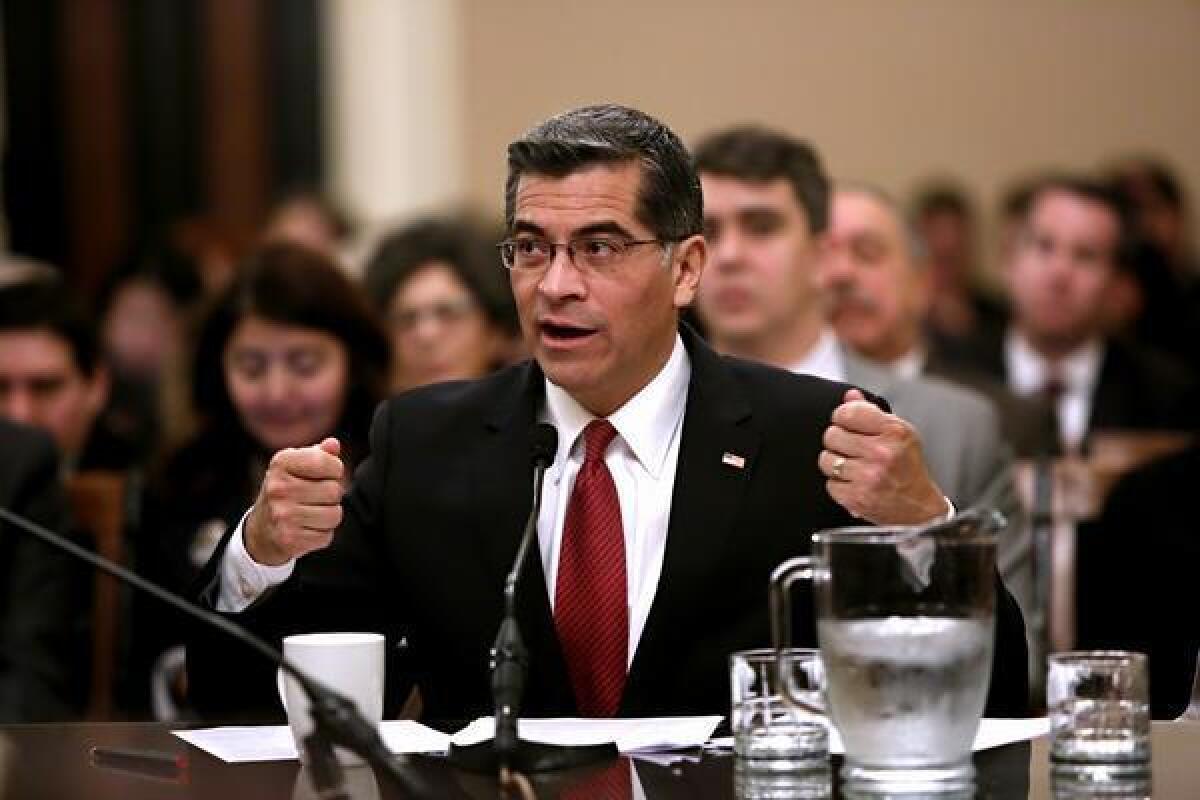
Rep. Xavier Becerra (D-Los Angeles) on Friday is up for a confirmation vote in the state Assembly, which is expected to approve his appointment to become California’s attorney general.
Becerra would still face a similar vote in the state Senate as early as next week before he can take office.
An Assembly panel on Tuesday recommended his confirmation after the nominee pledged to aggressively defend state policies on immigration and healthcare against potential negative actions by President-elect Donald Trump’s incoming administration.
Obama expands the California Coastal National Monument, fulfilling multiple California lawmakers’ wishes
After years of advocating from California lawmakers, President Obama on Thursday expanded the California Coastal National Monument.
The California Coastal National Monument, which runs along the entire California coast, was expanded by 6,230 acres and includes protection of six new sites: Piedras Blancas Outstanding Natural Area in San Luis Obispo County; Cotoni-Coast Dairies in Santa Cruz County; Lost Coast Headlands, Lighthouse Ranch and Trinidad Head in Humboldt County; and Orange County Rocks off the coast of Southern California.
Retired Sen. Barbara Boxer (D-Calif.), Sen. Dianne Feinstein (D-Calif.), retired Rep. Lois Capps (D-Santa Barbara), Reps. Anna Eshoo (D-Menlo Park), Jared Huffman (D-San Rafael) and other members of the California congressional delegation have pushed for years to protect the sites.
Originally designated by President Clinton in 2000, the site has already been expanded by Obama once, when he added Point Arena-Stornetta in Mendocino County in 2014.
California lawmakers offer a plan to extend the state’s cap-and-trade program

A group of lawmakers, including some who have been skeptical of global warming regulations, introduced legislation on Thursday to ensure that California’s cap-and-trade emissions control program remains a permanent part of the state’s climate policy.
The measure, AB 151, is only one paragraph long right now, but it represents an opening bid in the brewing battle over the future of the state’s program for requiring companies to buy pollution permits in order to release greenhouse gases into the atmosphere.
Gov. Jerry Brown wants a supermajority vote in both houses of the Legislature to safeguard cap-and-trade from legal uncertainty, stemming in part from a lawsuit over whether the program represents an unconstitutional tax. There also remain questions about whether current law requires the program to expire in 2020.
“This was a good time to start having the conversation,” said Assemblywoman Autumn Burke (D-Inglewood), who introduced the legislation with Assemblyman Jim Cooper (D-Elk Grove).
Cooper is a leader of Democrats’ so-called moderate caucus, a loose group of business-aligned Democrats who have pushed back on attempts to regulate greenhouse gas emissions in recent years.
Various advocacy groups who are normally at odds over climate change policies are now preparing to line up behind a cap-and-trade extension, although they could wind up on different sides as the debate continues.
The Environmental Defense Fund and the Natural Resources Defense Council see the issue as an opportunity to solidify California’s leadership in the battle against global warming.
The Western States Petroleum Assn., which issued a statement on Tuesday supporting cap-and-trade, appears wary that state regulators could pursue even more stringent policies if the program falls apart.
Burke said negotiations this year will require everyone to have their say.
“It’s super important that everybody is at the table,” she said. “It’s how we will make it a sustainable program.”
Gov. Jerry Brown laments the ‘political language’ of the times in celebrating Martin Luther King Jr.
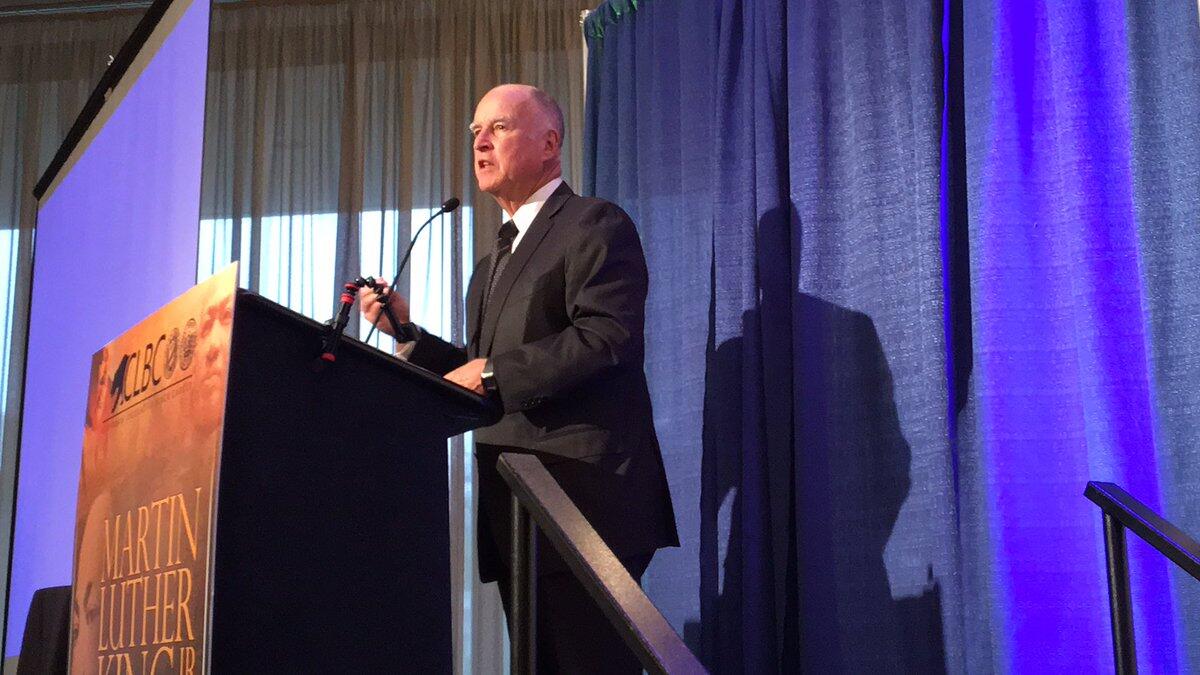
Gov. Jerry Brown carefully dipped his toes into the national political debate on Thursday, sounding a note of disappointment about the language of politics while praising the legacy of Martin Luther King Jr.
In brief remarks at a Sacramento event honoring the slain civil rights leader, Brown noted the contrast between King’s “elegance” and the acrimony in the wake of last year’s presidential election.
“Honoring Martin Luther King should be particularly appropriate today in a political world where words don’t seem to mean what we always thought they meant and the political language is such that it doesn’t engender a lot of confidence,” Brown said.
The governor invoked King’s peaceful quest for justice in offering a lesson for elected leaders in 2017.
“That authenticity is exactly what’s needed today,” he said in chronicling King’s life. “If we’re going to move mountains, and the stagnant political process in Washington, we’re going to have to make sure to get it together in California.”
Fake News 101? Lawmakers want California schools to teach students how to evaluate what they read on the web
Politicians and members of the media are increasingly bemoaning the rise of “fake news,” though rarely is there agreement on how to define it. But can this new phenomenon be legislated away?
Two separate bills introduced by Democratic lawmakers Wednesday aim to do just that by offering proposals that would help teach Californians to think more critically about the news they read online.
Assemblyman Jimmy Gomez (D-Los Angeles) has introduced a measure that would require the state to develop curriculum standards that incorporate “civic online reasoning” to teach students how to evaluate news they read on the Internet.
“Recently, we have seen the corrupting effects of a deliberate propaganda campaign driven by fake news,” Gomez said in a statement. “When fake news is repeated, it becomes difficult for the public to discern what’s real. These attempts to mislead readers pose a direct threat to our democracy.”
Gomez said his bill, AB 155, would prepare California students to differentiate “between news intended to inform and fake news intended to mislead.”
In a similar measure, SB 135 by state Sen. Bill Dodd (D-Napa), the state education board would be tasked with creating a framework for a “media literacy” curriculum.
“The rise of fake and misleading news is deeply concerning. Even more concerning is the lack of education provided to ensure people can distinguish what is fact and what’s not,” Dodd said in a statement.
The fake news phenomenon burst into public consciousness at the close of the 2016 election, when analysts found that factually inaccurate news stories found surprisingly large audiences online.
But defining “fake news” has increasingly become a thorny exercise, as partisans have used the phrase to disparage news stories they dislike.
Both President Obama and President-elect Donald Trump have referenced the fake news phenomenon. Obama, in remarks after the election, forcefully lamented the “age of misinformation [that is] packaged very well, and it looks the same when you see it on a Facebook page or you turn on your television.”
On Wednesday, Trump dismissed news coverage of a report detailing unverified allegations of his supposed ties to Russia as “fake news,” and singled out the outlets BuzzFeed and CNN as purveyors of false information.
Gov. Jerry Brown sets the date for his State of the State speech
State senators urge House Majority Leader Kevin McCarthy to ‘abandon the political rhetoric’ on Obamacare
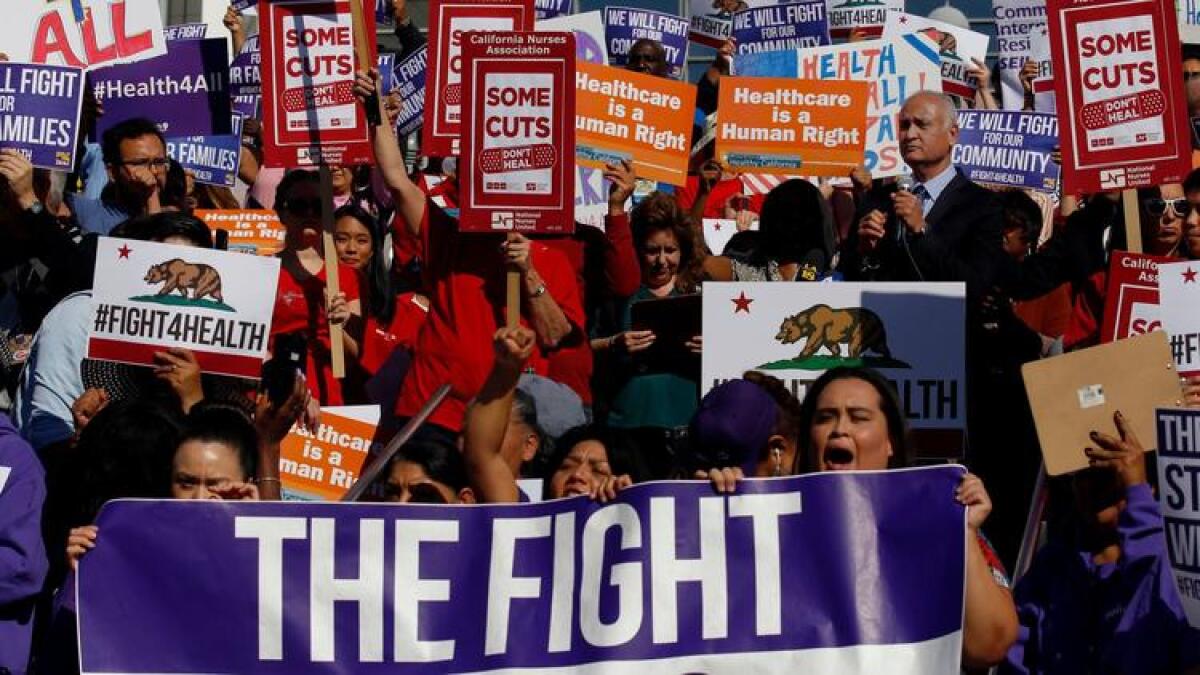
When House GOP Leader Kevin McCarthy asked top political figures across the country for input on how to replace the Affordable Care Act, it seemed unlikely that officials in California, a state that has enthusiastically adopted the healthcare law, would eagerly brainstorm on a potential repeal.
Sure enough, top Democrats in the state Senate — President Pro Tem Kevin de León of Los Angeles and Health Committee Chairman Ed Hernández of West Covina — responded this week with a grim take on congressional Republicans’ efforts to unwind Obamacare.
“Moving forward with a plan to repeal the Affordable Care Act (ACA) before developing a substantive replacement would be counterproductive and result in harming the people we all represent,” the two Democrats wrote in a letter to McCarthy dated Jan. 9.
The letter warned that repealing Obamacare would lead to increased financial burdens to hospitals that would be the primary source of emergency medical treatment for the uninsured. It also raised the possibility of job losses in the healthcare sector, singling out thousands of potential losses in Kern and Tulare counties, which McCarthy represents.
“We urge you to abandon the political rhetoric about repealing the ACA, and contemplate and assess the real impact such an action would have on the real lives of our most vulnerable constituents,” the senators wrote.
While urging that Obamacare be kept in place, the senators did endorse the notion of some tweaks. They noted that any changes to existing law should ensure that people continue to receive benefits that are as comprehensive as those they currently receive, lower premiums and cost-sharing, and avoid increasing costs to the state.
Sen. Dianne Feinstein recovering at home after pacemaker surgery
Sen. Dianne Feinstein had a pacemaker installed Tuesday, just hours after questioning President-elect Donald Trump’s attorney general nominee.
Feinstein, 83, is the oldest member of the Senate and the ranking Democrat on the Senate Judiciary Committee, which held its first day of confirmation hearings on Trump’s nominee, Sen. Jeff Sessions (R-Ala.), on Tuesday. Those hearings continue today.
Feinstein’s spokesman, Tom Mentzer, said the senator will watch Wednesday’s hearing from home and plans to submit additional questions afterward. He could not say when she can return to Capitol Hill, but said it would be soon.
A pacemaker is a small device normally implanted under the collarbone and connected to the heart by tiny wires to help the heart beat more regularly, according to the American Heart Assn.
In a statement, Feinstein’s office said the 90-minute, non-emergency procedure at George Washington University Hospital “went smoothly and she will return to a full schedule very soon.”
The California Democrat made the decision to have the pacemaker installed out of an abundance of caution, the statement says. Mentzer wouldn’t provide additional reasons for the procedure or details on the condition it was intended to fix.
There has been broad speculation about whether Feinstein will seek another six-year term when she is up for reelection in 2018, and the senator has been coy about her plans.
Feinstein signaled on Tuesday that she and her Democratic colleagues are not going to go easy on their fellow senator as he seeks to be the next attorney general and will closely scrutinize his record.
Sen. Dianne Feinstein had surgery Tuesday to install a pacemaker
We’ll have more details soon.
California counties will get stuck with a $622-million bill as the governor cancels a healthcare pilot program
County officials across the state on Tuesday criticized Gov. Jerry Brown’s move to cancel a program that attempted to streamline health services for seniors and low-income families, a decision that will hit locals with a $622.6-million price tag beginning this summer.
The plan, unveiled as part of Brown’s state budget, seeks to cancel a 2012 program called the Coordinated Care Initiative. The effort allowed Medi-Cal, Medicare and the state’s in-home support services to be offered through a single delivery system in hopes of reducing costs.
But the program required a finding by the governor’s finance officials that it was cost-effective, which Brown’s new budget said did not turn out to be the case.
A key part of the program was that the state, not locals, bargained with labor unions over wages for in-home care workers. The budget proposal cancels the state’s role in those wage negotiations and also shifts other costs back to counties.
“This would be devastating to counties all over the state,” said Alameda County Supervisor Keith Carson, president of the California State Assn. of Counties executive committee. “We undoubtedly would have to make cuts in other vital social services to cover these costs.”
Gov. Jerry Brown has a bigger plan to fund transportation, though a political deal remains elusive
With negotiations stuck in a traffic jam of competing priorities, Gov. Jerry Brown’s new state budget offers another effort to boost California’s transportation funding by raising the gas tax paid by the state’s drivers.
Brown’s plan unveiled on Tuesday would add $4.3 billion a year over the next decade on everything from repairs to additional public transit. The governor convened a special session of the Legislature to deal with transportation funding in the summer of 2015, but it finally fizzled out last fall.
The governor’s proposal would set the state’s gasoline excise tax at 21.5 cents per gallon, up from his proposal last year for 18 cents per gallon.
Democrats legislators have suggested a larger package, while all efforts to raise the gas tax — requiring a supermajority vote in both houses — have failed.
“It is challenging, but I’m very committed to finding the revenues to fix California’s roads,” Brown said in Tuesday’s news conference about the budget.
Transportation advocates say the state has a backlog of $59 billion in needed state highway repairs, and needed fixes of $71.3 billion for local streets and roads.
Brown’s plan continues to include a new $65 annual fee on all vehicles, as well as a $500-million infusion of cash from the state auctions of greenhouse gas pollution credits.
“Now the question is, how do we get the votes?” Brown said. “And that involves Republicans, it involves Democrats, it involves interest groups. And we work to forge a consensus.”
Times staff writer Melanie Mason contributed to this report.
Gov. Brown’s budget includes $52.2 million for marijuana regulation under new system

As California prepares for issuing licenses to sell marijuana for recreational use later this year, Gov. Jerry Brown’s budget includes $52.2 million for regulation of cannabis.
Voters approved the recreational use and sale of pot to non-medical customers in November, and Brown’s budget proposes merging that regulatory system with one approved by the Legislature in 2015 for medical marijuana.
“Implementing the current medical and recreational cannabis statutes separately will result in duplicative costs of an additional $25 million for a second track and trace system,” Brown’s budget says. “Additionally, a separate regulatory framework for each would lead to confusion among licensees and regulatory agencies, undermining consumer protection and public safety.”
Because cannabis sales licenses may not be issued until just before the end of this year, the 15% tax on retail sales is not going to be imposed until then, so the state has had to lend some money to the agency drafting regulations. That loan is expected to be paid back next year, Brown said.
One marijuana industry leader said the governor’s budget does not provide enough money.
“While it’s positive to see the governor’s budget allocate $52 million towards marijuana regulation, there is a lot of work to be done if the state truly intends to transform a multibillion-dollar black market into a highly regulated industry,” said Aaron Herzberg, a partner and general counsel for the firm CalCann Holdings. “It’s going to take a lot more than $52 million to tame California’s highly unregulated free-for-all.”
California’s budget rainy-day fund is expected to grow to almost $8 billion
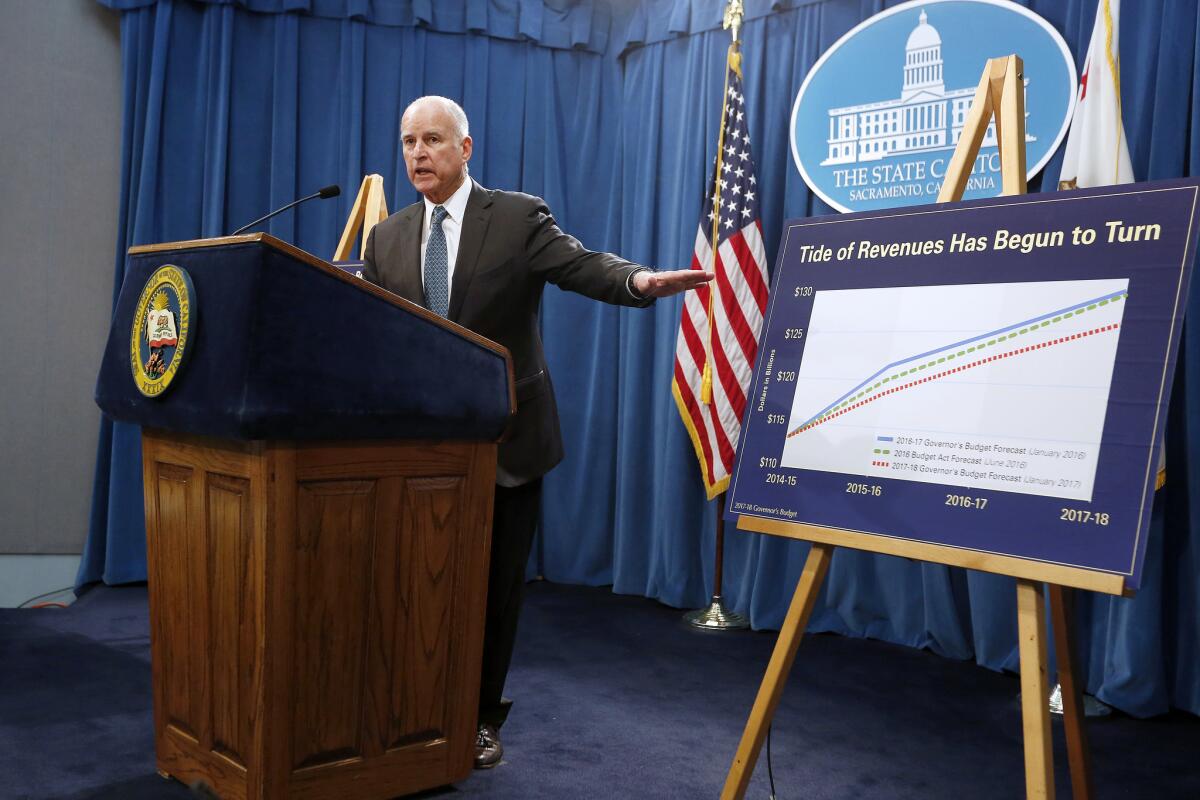
Even as his state budget plan detailed the reemergence of a potential deficit in the near future, Gov. Jerry Brown on Tuesday presented lawmakers with a fiscal blueprint that projects the state’s cash reserve will grow to $7.9 billion.
The passage of Proposition 2 in 2014 strengthened the state’s existing rainy-day budget reserve, a savings account first created by voters in 2004. In essence, the new law requires both a larger amount to be set aside each year and the paying of a portion of the state’s long-term debts.
Proposition 2 set the goal of a cash reserve fund that’s 10% of the amount of tax revenues collected that year. The proposed budget would set aside $1.2 billion, bringing the fund to 63% of its mandated target. That’s larger than it was required to grow after Brown and lawmakers agreed to make an extra $2-billion payment last summer.
Even at that level, the reserve fund wouldn’t begin to fill the holes that emerged during the worst fiscal crises — an almost $40-billion shortfall set the state record in 2009-10 — but it would soften the blow of a mild recession.
California’s Rep. Dana Rohrabacher is latest lawmaker to pull down painting in Capitol depicting police as pigs
Hours after members of the Congressional Black Caucus rehung the controversial painting depicting police officers as pigs that Rep. Duncan Hunter (R-Alpine) pulled down Friday, it’s been pulled down twice more by Republican House members.
The painting depicts a clash between police and protesters on a street. In it, gun-wielding officers have heads that resemble boars, while one protester appears to be a panther or wolf, and people on the street hold signs that read “History,” “Justice Now” and “Racism Kills.” It was the local winner of a national high school art competition and came from the district of Rep. Lacy Clay (D-Mo.).
Most recently, Reps. Dana Rohrabacher (R-Costa Mesa) and Rep. Brian Babin (R-Texas) pulled it off the wall. (The audio isn’t working on the accompanying clip.)
“We support freedom of speech, but you don’t put something attacking policemen, treating them like pigs, here in the Capitol,” Rohrabacher told Roll Call.
Clay had rehung the painting around midday after Rep. Doug Lamborn (R-Colo.) removed it. Shortly after Rohrabacher and Babin removed the painting and took it to Clay’s office, it was back on the wall in the tunnel.
Republican members are asking the Architect of the Capitol to permanently remove the piece, which has hung for six months in a block-long tunnel used by visitors, staff and members of Congress to pass from the House office buildings to the Capitol.
House Speaker Paul D. Ryan (R-Wis.) told Republicans in a closed-door meeting Tuesday that he and Republican leaders would overrule the architect and pull down the painting if the architect chooses not to remove it, according to a staff member in the room who asked not to be named because the person is not permitted to release information about the meeting. Hunter also confirmed Ryan’s position to Politico.
Sen. Kamala Harris praises closure of Backpage.com adult section
Sen. Kamala Harris (D-Calif.) praised the closure of the adult section of longtime legal foe Backpage.com Tuesday, saying she’s looking forward to seeing the site shut down completely.
The adult section was shuttered Monday night, hours after an explosive report into the company was released by the Senate Committee on Homeland Security and Governmental Affairs’ Investigations Subcommittee. Backpage’s founders, Michael Lacey and James Larkin, and the site’s CEO, Carl Ferrer, testified before the committee Tuesday.
As attorney general, Harris repeatedly sued Backpage over the adult section, saying it was used to pimp adult women and children.
“The timing was not a coincidence,” Harris said. “They are in the hot seat, and they know it and I think they are finally coming to terms with the fact that they are being held accountable.”
The Senate committee’s review of more than 1.1 million pages of company documents found evidence Backpage knowingly facilitated prostitution and child sex trafficking, according to the report. The business was highly profitable and experienced explosive growth, from $5.3 million in gross revenue in 2008 to $135 million in 2014.
The company has successfully fended off civil lawsuits and government inquiries, often citing the Communications Decency Act, which frees online publishers from liability over user postings. Harris last brought pimping and money laundering charges against the company in late December after a judge tossed a general initial suit she filed along with other attorneys.
“It’s an ongoing effort, obviously, to hold them accountable,” Harris said. “They have been, I think, both arrogant and cowardly in the way they have conducted themselves and the way they have designed their business model, and I look forward to them shutting down completely.”
The classified advertising giant has given no indication it plans to close.
Sen. Dianne Feinstein (D-Calif.) said in a statement that the committee’s report shows it is necessary for federal officials to use a provision that she and former Sen. Mark Kirk (R-Ill.) proposed in 2015. The provision, which became law as part of a larger bill, makes it a federal crime to knowingly advertise to minors for commercial sex.
“While the website shut down its adult services section last night, to my great relief, other websites will undoubtedly seek to profit off the exploitation of minor trafficking victims,” Feinstein said. “Federal law criminalizing this conduct must be used to go after them and stop this heinous crime.”
For the record: A previous version of this post identified Kirk as a Democrat.
California governor: We’re not spending more on low-income housing because it’s too expensive to build

Gov. Jerry Brown delivered the same message on housing in his new state budget that he did last year: California’s primary problem is that it’s too expensive to build here.
“We’ve got to bring down the cost structure of housing and not just find ways to subsidize it,” Brown said in a news conference Tuesday where he unveiled the budget.
Brown proposed no new funding for low-income housing subsidies in the budget and said he wouldn’t support any housing legislation that would increase budgetary spending. Citing lower state revenues and uncertainty surrounding federal dollars, Brown also axed the $400 million he had agreed to spend on low-income housing subsidies last year if lawmakers signed off on the governor’s plan to streamline some local development regulations.
Instead, Brown made clear he would again support new laws that would make it easier to build new homes, lower costs to develop low-income housing and provide financial incentives for cities that meet housing production goals.
“What we can do is cut the red tape, cut the delays, cut whatever expenses we can afford to do without to make housing more affordable and therefore increase the stock and therefore hopefully bring down the costs,” he said.
The state is building at least 100,000 fewer units a year than it needs to to keep pace with population growth, according to a Brown-administration report released last week, and the lowest-income residents are the most squeezed. One-third of the California renters spend more than half their income on housing, and the state’s homeless population is dramatically higher than the rest of the country.
Exactly what new housing legislation looks like remains to be seen. Brown was criticized last year for unrolling his housing-streamlining plan without input from lawmakers.
“The last time we pushed it pretty hard, and some people said we didn’t collaborate enough,” Brown said. “So we’re setting principles out so we can collaborate.”
Assembly Speaker Anthony Rendon says he’ll oppose rolling back higher-education aid for middle-class students
With budget negotiations entailing, in Gov. Jerry Brown’s words, “pushing... and some shoving,” Assembly Speaker Anthony Rendon telegraphed one tussle that’s sure to happen over the next several months: the future of the Middle Class Scholarship program.
The aid program, championed by former Assembly Speaker John A. Pérez, offers assistance to UC and CSU students from families that make $80,000 to $150,000 annually.
The program has faced political threats before. Senate leader Kevin de León proposed axing the program in 2014 as part of a proposal to fend off UC tuition increases.
Now, Brown is proposing phasing out the scholarship entirely. Under his plan, only the students who have already received awards would be eligible for new money. Brown estimates that by the 2020 budget year, the phase-out would reduce costs to the state’s general fund by nearly $116 million.
During Rendon’s response Tuesday afternoon to Brown’s budget proposal, the Democrat from Paramount singled out the Middle Class Scholarship as a program he wants to protect. Rendon is a close political ally to Pérez; the former speaker even officiated at his wedding.
On housing, Brown opposes new state general fund spending on low-income subsidies
Assembly panel recommends confirmation of Rep. Xavier Becerra for California attorney general
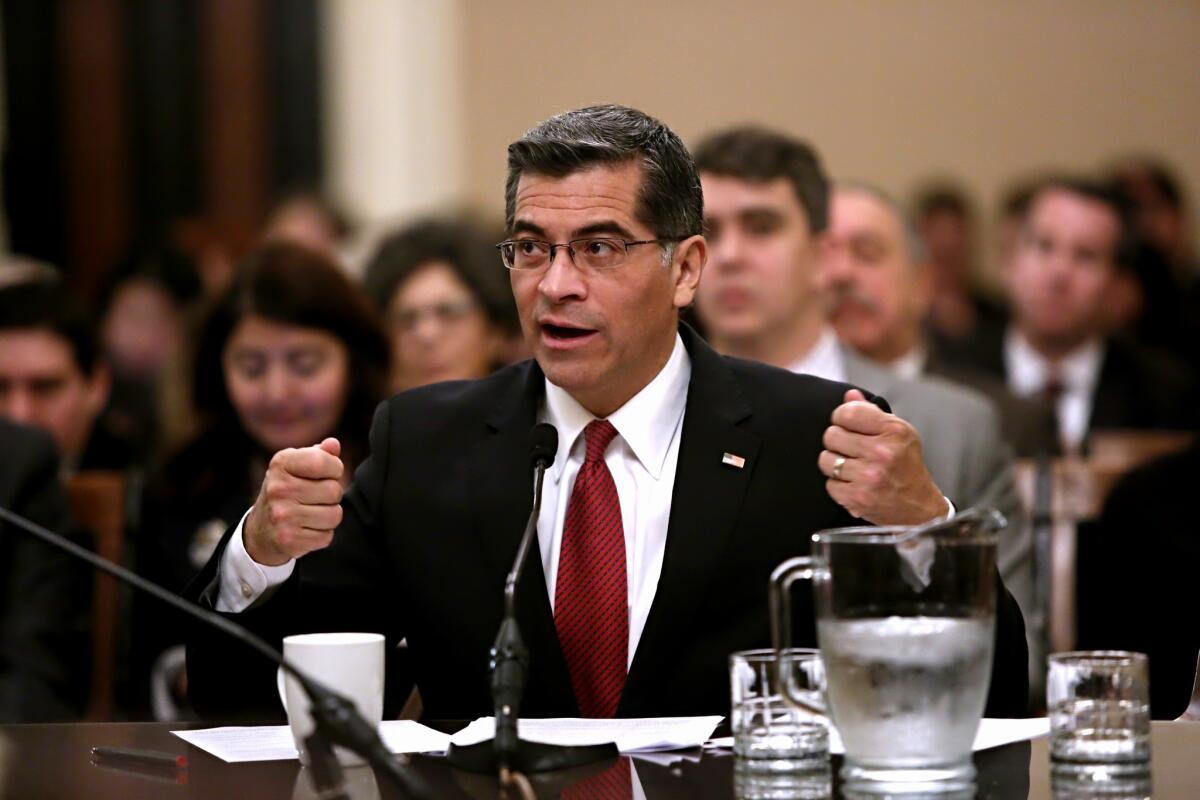
An Assembly panel on Tuesday recommended the confirmation of Rep. Xavier Becerra as state attorney general after the nominee pledged to aggressively defend state policies on immigration and healthcare against potential negative actions by President-elect Donald Trump’s incoming administration.
The Los Angeles Democrat was questioned for more than an hour by members of the Assembly Special Committee on the Office of the Attorney General before the panel voted 6 to 3 to support the nomination by Gov. Jerry Brown. All Republicans voted in opposition.
The nomination still must be acted on by the full Assembly, which is scheduled to vote Friday, as well as the Senate.
Assemblyman Reggie Jones-Sawyer (D-Los Angeles), a co-chairman of the panel, told Becerra that he expects a “long, legal war” with the federal government.
“The reason? Trump and his incoming administration are dead-set on building up legal barriers and walls that we have torn down in recent years,” Jones-Sawyer said.
Gov. Jerry Brown introduced Becerra at the two-hour hearing, warning that “there are big battles ahead,” and calling his nominee an “outstanding candidate that can certainly champion the causes we believe in.”
Becerra told the panel that as the son of hard-working immigrants, he is committed to fighting any federal policy that takes away the rights of Californians who are playing by the rules.
“As California’s chief law enforcement officer and legal advocate, I am going to be ready to deploy those values and life lessons to advance and defend the rights — big and small — of all Californians,” Becerra told the panel. “Everyone who plays by California’s rules deserves to know, ‘We’ve got your back.’”
The 12-term congressman said he supports the state’s policies protecting the environment and civil rights. He said he opposes racial profiling by police and the stop-and-frisk policies of other cities.
With Trump proposing mass deportations and registration of immigrants from predominantly Muslim countries, Becerra said, “the headwinds from outside California could threaten basic rights of so many families like the one I grew up in.”
Republican members called on Becerra to make fighting crime his top priority and said they had concerns about the attorney general failing to defend the rights of gun owners.
Some 50 people testified, with support coming from groups such as the Sierra Club, Los Angeles Police Protective League, Equality California and several labor unions. Only two people objected to the nomination, including an American Independent Party representative who questioned whether Becerra has enough years serving as an attorney to be qualified.
Craig DeLuz of the Firearms Policy Coalition, said his group wants a state attorney general who can protect the constitutional rights of gun owners.
“Unfortunately, based on the record, we simply do not believe that this nominee is capable of doing that,” DeLuz told the panel.
The National Rifle Assn. opposed Becerra in a letter.
When it comes to federal immigration policy, Brown says state can’t budget for ‘something that hasn’t happened yet’
Brown weighs in on first confirmation vote for Xavier Becerra as California attorney general
Gov. Jerry Brown pushes to extend cap-and-trade program with new budget proposal
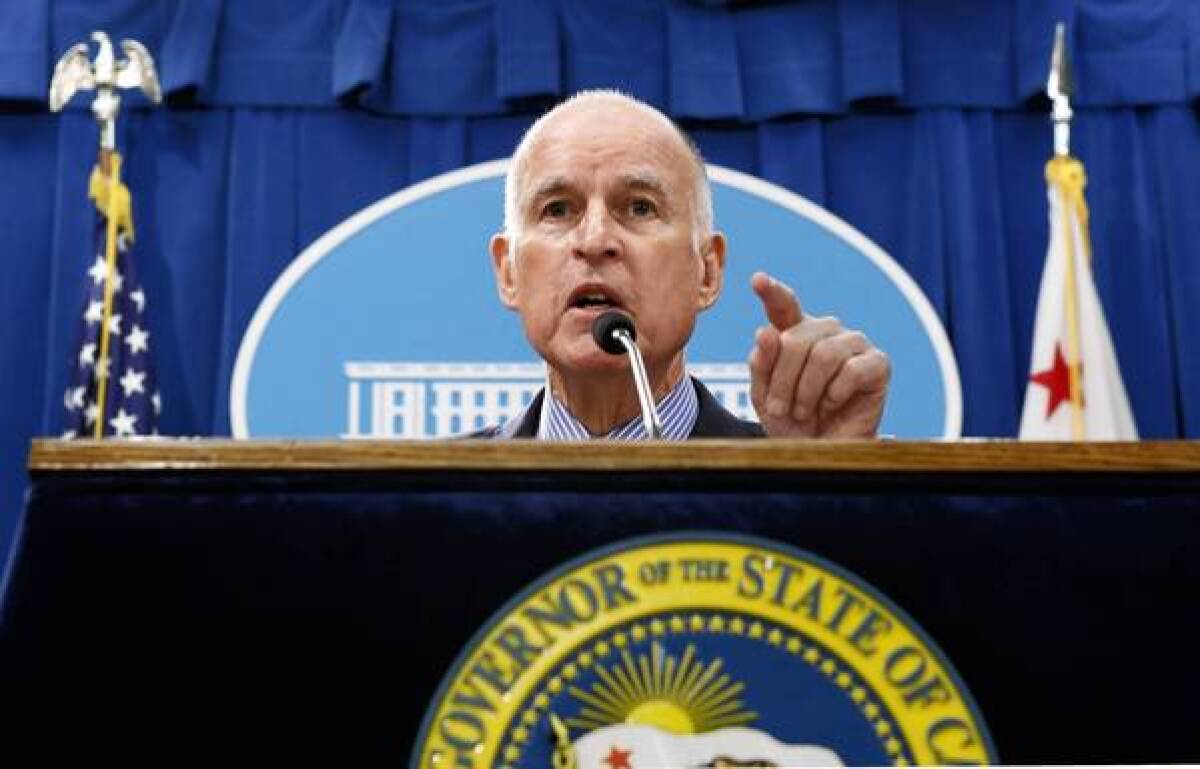
Gov. Jerry Brown announced Tuesday his plan to prod lawmakers to solidify California’s emissions cap-and-trade program, the centerpiece of the state’s climate change agenda.
Pushing forward in California has only become more important with federal action on global warming less likely under President-elect Donald Trump’s incoming administration, the governor said.
“Given the fact that the federal government is going in the opposite direction, I would think that Californians wants to strengthen their own commitment,” he said during a Capitol news conference where he unveiled his budget plans. “We ought to continue and not fall back on our efforts.”
Cap-and-trade works by requiring companies to purchase permits in order to emit greenhouse gases into the atmosphere, creating a financial incentive to reduce pollution. The program is currently mired in a legal battle over whether it’s an unconstitutional tax, and a court date is scheduled for later this month.
Brown wants to eliminate the uncertainty stemming from the lawsuit and other legal questions about whether the program can continue past 2020. His plan requires a two-thirds vote in both houses of the Legislature, the legal standard for approving taxes.
Brown’s fellow Democrats have the necessary supermajorities to approve cap-and-trade without Republican votes. But it’s unlikely to be an easy lift, given divisions among Democrats about how closely to regulate industry and the best way to approach climate change.
As an inducement for lawmakers to act, the governor said he doesn’t want to spend an estimated $2.2 billion in revenue projected from the cap-and-trade program until it is extended.
Brown counts on some of that money to fund construction of the bullet train, and lawmakers have allocated other dollars to their own priorities, such as affordable housing and local transit.
“it is an important program, and it generates important funds,” Brown said.
Brown responds to Trump comments, pledges ‘to protect the rights of all people in California’
We are not going to get hysterical, but we are going to get prepared to protect the rights of all people in California in a thoughtful, creative way.
— Gov. Jerry Brown on comments by President-elect Donald Trump regarding deportation of immigrants and the creation of a Muslim registry
Gov. Jerry Brown predicts a $1.6-billion deficit as he unveils state budget
Less than four years after declaring California’s budget was balanced for the foreseeable future, Gov. Jerry Brown on Tuesday said the state is now projected to run a $1.6-billion deficit by next summer.
“The trajectory of revenue growth is declining,” Brown told reporters at the state Capitol on Tuesday as he unveiled the state’s budget.
The $179.5-billion plan seeks to resolve the budget shortfall by slower-than-expected growth in public school funding and through rolling back a series of one-time expenses discussed during last year’s budget negotiations.
Brown’s budget does not take into account a repeal of the Affordable Care Act, which would be unlikely to happen during the fiscal year at hand. But the governor made clear such a rollback could have a significant impact on California, where federal subsidies to Medi-Cal now top $16 billion.
“That’s very bold,” said Brown of efforts by Republicans and President-elect Donald Trump, “and, I think, a move that isn’t very consistent with decency or even being a very smart political leader.”
Brown says budget proposal is ‘the most difficult that we have faced since 2012’
Brown makes case for large ‘rainy-day’ fund
If you want to have a progressive tax system, you have to have a very large reserve and rainy-day fund.
— Gov. Jerry Brown, during a hearing unveiling the state budget
Assembly panel votes 6 to 3 in favor of confirming Xavier Becerra as California attorney general
Gov. Jerry Brown’s budget projects a $1.6-billion deficit
The first look at California’s new budget shows a projected deficit
Becerra calls the idea of a Muslim registry ‘abhorrent’
When we talk about a Muslim registry, you are doing nothing more than saying this guy is Muslim, therefore he is going to be on the registry. This kid is black and young, therefore I am going to stop and frisk him. Those are the kinds of things that are not based on a sensible understanding of what protections our people need.
— Rep. Xavier Becerra, during his opening statement at his confirmation hearing to become California’s attorney general
Painting depicting police as animals rehung in U.S. Capitol; Rep. Duncan Hunter says he won’t pull it down again
The controversial painting depicting police officers as animals that California Rep. Duncan Hunter removed from a Capitol hallway Friday was rehung Tuesday by members of the Congressional Black Caucus.
House Republicans are working through official channels to have it removed permanently and Hunter (R-Alpine) will not personally pull it down again, Hunter’s chief of staff, Joe Kasper, said.
“Sometimes you have to do things like that to draw attention of people and get it taken down,” Kasper said. “Mission accomplished.”
The painting, which was the winner of an annual art competition for high school students, depicts a clash between police and protesters on a street. In it, gun-wielding officers have heads that resemble boars, while one protester appears to be a panther or wolf, and people on the street hold signs that read “History,” “Justice Now” and “Racism Kills.”
The painting is among hundreds that line a block-long tunnel used by visitors and members of Congress to travel between the House office buildings and the Capitol. It has been hanging for six months. A conservative site raised recently raised it as a problem.
“The U.S. Capitol, especially in this corridor ... is not a modern art museum,” Kasper said. “It’s not the right place to have anything that calls attention to police officers as swine.”
Rep. William Lacy Clay (D-Mo.) gathered with members of the Congressional Black Caucus and a handful of other members to hang the painting back up Tuesday morning.
“I do not agree or disagree with the painting, but I will fight to protect this young man’s right to express himself,” Clay, whose district includes Ferguson, Mo., told reporters afterward.
Clay said he tried to seek theft charges against Hunter for removing the painting, but the Capitol Police weren’t sure about proceeding. He said he’s asked for an apology.
Kasper dismissed threats of theft charges as “grandstanding.”
“That’s a punk move,” he said. Hunter brought the painting to Clay’s office after removing it.
For the second time in a handful of days, House Republicans spent time in their closed-door caucus meeting Tuesday discussing how to remove the painting. Leaders are now looking at whether the painting violates the rules of the competition.
Rep. Dave Reichert (R-Wash.), a former sheriff, is writing the Architect of the Capitol to ask him to have the piece removed, saying it violates the competition’s rules, which state that “exhibits depicting subjects of contemporary political controversy or a sensationalistic or gruesome nature are not allowed.”
Becerra emphasizes need to end racial profiling, says police must build trust in communities
Becerra promises to defend California’s progress with early nods to protecting immigrant rights
Xavier Becerra on California’s power: ‘You don’t become the sixth-most-powerful economy in the world by sitting back’
You don’t become the sixth-most-powerful economy in the world by sitting back.
— Rep. Xavier Becerra, in answer to a question during his confirmation hearing to become California’s attorney general
See the very small room hosting Xavier Becerra’s California attorney general hearings
Xavier Becerra on California’s future: ‘California must continue to be a forward-leaning state’
California must continue to be a forward-leaning state.
— Rep. Xavier Becerra, during his opening statement at his confirmation hearing to become California’s attorney general
Rep. Xavier Becerra’s confirmation hearing for state attorney general kicks off with scathing remarks about Trump
Assemblyman contends it’s against the law for the Legislature to hire its own outside counsel

Holder, leading a team of attorneys from the firm Covington & Burling, will cover potential conflicts between California and the federal government.
Legislative leaders brought in the legal big guns to fend off President-elect Donald Trump when they announced last week they selected former U.S. Atty. Gen. Eric Holder Jr. to help craft policy and courtroom strategy against the incoming president.
But Republican Assemblyman Kevin Kiley says the new hire is against the law.
Kiley, a freshman lawmaker representing the Sacramento suburbs, asserted late last week that by retaining Holder’s firm, Covington & Burling, the Legislature violated the state Constitution.
In a letter to the state attorney general’s office, Kiley cites Article VII of the California Constitution, which forbids the state from privately contracting for services that could be rendered “adequately and competently” by existing civil employees.
Kiley notes that the state attorney general’s office consists of more than 1,500 attorneys and professional staff, including a division that coordinates the attorney general’s communications with the Legislature.
“In light of these facts, I respectfully ask your legal opinion as to whether the 1,592 attorneys and legal staff at the State Attorney General’s Office can perform ‘adequately and competently’ the legal services for which Covington & Burling has been retained by the Legislature,” Kiley wrote.
He requested the attorney general’s office respond with a legal opinion to his query — a process that could take months.
Aides to Sen. Kevin de León (D-Los Angeles) and Anthony Rendon (D-Paramount) dismissed Kiley’s charge, noting the Legislature has retained outside counsel for legal advice in the past.
“The Legislature has inherent power to obtain the services of the best resources available to it to understand the implications of public policy in its law-making function, including the interaction between state and federal law,” said Anthony Reyes, a spokesman for De León. “The provisions of law requiring a state agency to obtain the consent of the Attorney General before employing outside counsel expressly exclude the Legislature.”
It’s state budget day in Sacramento, as Gov. Brown rolls out a new spending plan
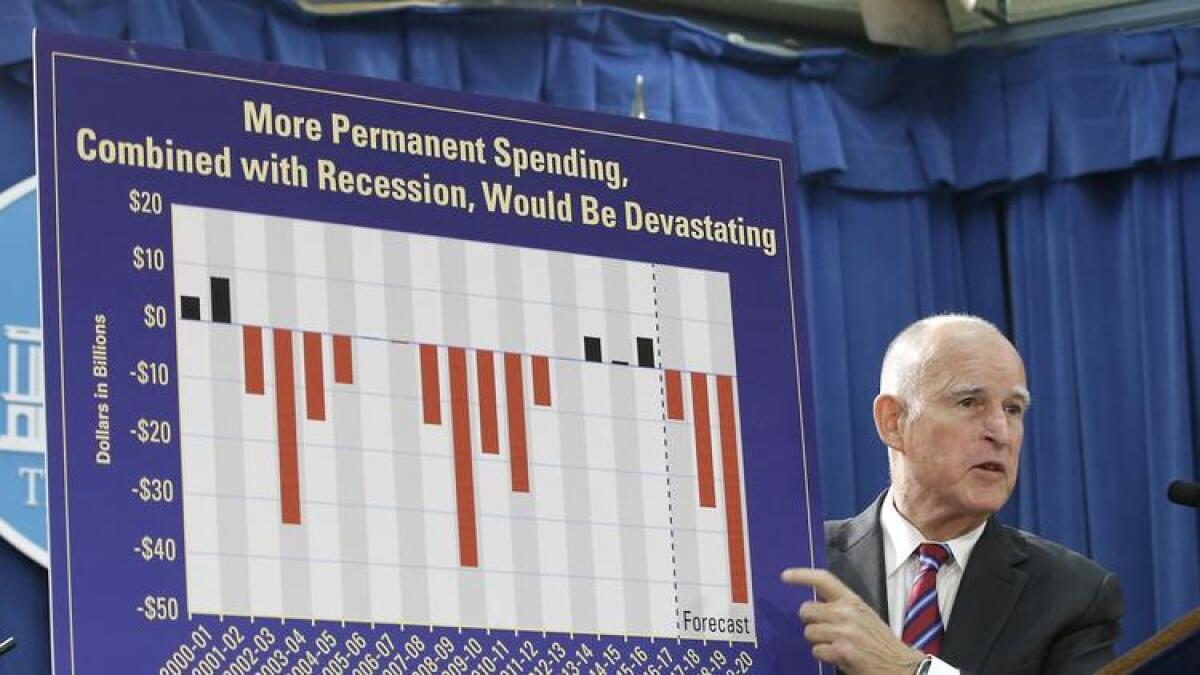
For all of the things to watch for in Gov. Jerry Brown’s new budget, it may be the one thing he’s not expected to include that may overshadow everything else.
The proposal, to be unveiled this morning at the state Capitol, is not expected to address how California might solve billions of dollars in potential cuts from the incoming administration of President-elect Donald Trump.
And the biggest question mark surrounds the $16 billion the state currently receives for Medi-Cal, providing healthcare for low-income citizens, through the Affordable Care Act.
Brown may also take a decidedly cautious view of the California economy in the fiscal year that begins this summer, given that recent tax collections have come in below official forecasts.
The governor unveils his proposal for the 2017-18 budget year at 11:00 a.m.
California lawmakers to weigh harsher penalties for sex offenders who remove their GPS trackers
California lawmakers will once again consider whether to increase penalties for sex offenders who willfully remove or disable their GPS trackers.
A bill reintroduced by state Sen. Patricia Bates (R-Laguna Nigel) would make it a felony for a person to tamper with any monitoring device affixed as a condition of parole, community supervision or probation. The crime would be punishable by 16 months or two or three years in state prison.
The measure comes more than a year after Gov. Jerry Brown vetoed similar legislation in 2015, citing it among proposals that he said found novel ways to criminalize conduct, increasing the jail population and creating complexity in sentencing laws “without commensurate benefit.”
Bates said she first introduced the legislation due to the cases of accused Orange County serial killers Franc Cano and Steven Gordon, who were said to have fled the state after cutting off their GPS bracelets.
Gordon was found guilty in December in the killing of four women in Los Angeles. He was said to have carried out at least three of the murders while wearing the monitoring device.
Four former attorneys general and 38 members of Congress write to support Rep. Xavier Becerra for state AG
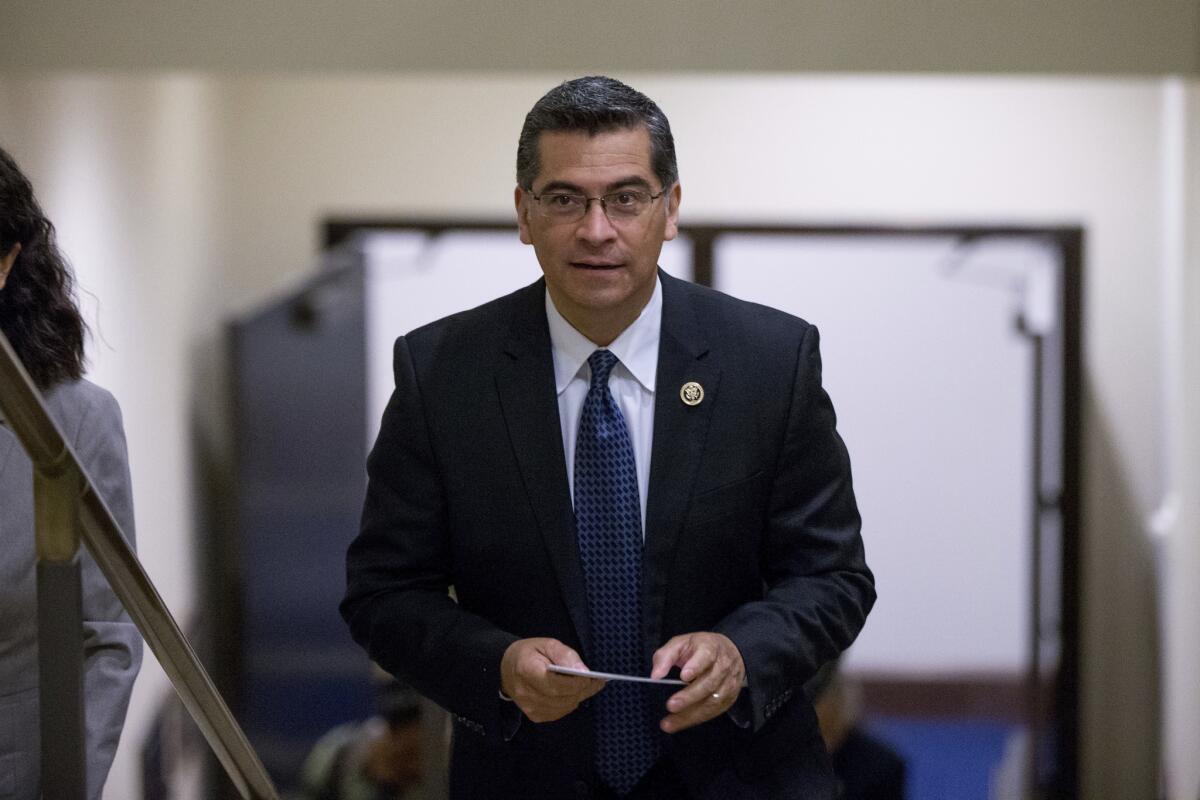
Four former state attorneys general, several labor groups and 38 Democratic members of Congress from California have submitted letters urging confirmation of Rep. Xavier Becerra (D-Los Angeles) as the state’s next top law enforcer.
With Becerra’s first confirmation hearing for state attorney general set for Tuesday, 27 letters of support have been sent to the special Assembly committee holding the hearing, including from former state attorneys general Kamala Harris, John Van De Kamp, Dan Lungren and William Lockyer.
“He’s hardworking, principled, thoughtful, a man of real civility who has the potential of getting the office behind him and, in so doing, serving very effectively at a time when California needs a strong and effective Attorney General,” wrote Van De Kamp, who served when Becerra was a deputy attorney general in his office.
Another letter, signed by 38 Democratic members of Congress, including Democratic Leader Nancy Pelosi, says Becerra is needed to counter soon-to-be-President Donald Trump.
“As we prepare for the swearing in of President Donald Trump, California must have an attorney general who is prepared on day one to protect our environment, stand up for immigrants and protect the Affordable Care Act,” the congressional letter says. “Congressman Becerra has a proven track record of fighting for Californians during his 12 terms in Congress.”
The one prominent group sending a letter of opposition is the National Rifle Assn., whose Daniel Reid wrote that “Congressman Becerra has consistently voted against hunting and Second Amendment-related issues. Given this record we are concerned that this clear disfavor for our rights could carry over into policies, regulations and legal interpretations.”
In addition, several citizens in favor of gun-owner rights sent emails to the legislative committee opposing Becerra.
Updated at 8:23 am, Tuesday to include Kamala Harris’ support.
California can stop the border wall with environmental lawsuits, Lt. Gov. Gavin Newsom says

President-elect Donald Trump’s plan to build a wall along the border will run into resistance in California, Lt. Gov. Gavin Newsom said in an interview with The Golden State podcast.
The state could sue under the California Environmental Quality Act or its federal equivalent, said Newsom, utilizing a common tactic to delay or kill all sorts of development projects around the state.
“There’s something called CEQA in California — NEPA at the federal level,” Newsom said. “There’s indigenous lands and autonomies relating to governance on those lands. There are all kinds of obstructions as it relates to just getting zoning approval and getting building permits. All those things could be made very, very challenging for the administration.”
The 1970 law has been credited with help protecting the state’s environment, but also is a frequent source of criticism for its unintended consequences, such as blocking the installation of bike lanes. Gov. Jerry Brown’s plan to spur housing development last year collapsed in part because environmentalists and labor unions believed the plan was an end-run around CEQA.
Tobacco tax initiative campaign faces fines for failing to report, in a video, that Tom Steyer was top financial backer

Backers of a recent tobacco tax initiative ballot have agreed to pay a $2,500 fine for failing to identify that billionaire Tom Steyer was a major funder of the campaign in a YouTube video that urged voters to support the measure, according to documents released Monday.
Proposition 56, approved by California voters in November, raises California’s tobacco tax by $2 per pack. The largest donor was liberal hedge fund billionaire Steyer, who has been considering a run for governor in 2018. Steyer gave $11.5 million of the more than $30 million raised to support the measure.
That was reported by the campaign in filings with the state. But, state campaign finance rules also require campaign videos to disclose the top two donors to the campaign paying for the ads.
The Aug. 9, 2016, video titled “Why Yes?” was not edited to disclose that Steyer became the top contributor to the campaign a month after it was posted, according to the investigative report by the staff of the state ethics watchdog agency, the Fair Political Practices Commission.
By not including the information in the video as required, the Yes on Proposition 56 campaign committee “denied viewers the opportunity to immediately know that Steyer was making large contributions to this proposition,” the report said.
The commission meets Jan. 19 to consider its staff recommendation to approve the fine agreed to by the committee.
California Rep. Jeff Denham is hoping a Trump campaign comment could spur immigration change
Rep. Jeff Denham (R-Turlock) is hoping a comment from President-elect Donald Trump during the campaign is a sign that the lawmaker’s idea -- letting people brought to the U.S. illegally as children earn citizenship through military service -- might have a chance.
Trump made deporting millions of people in the country illegally a central part of his campaign, but during NBC’s “Commander in Chief Forum” in September, Trump indicated that immigrants who serve in the U.S. military could possibly be allowed to become legal residents.
Denham said Trump’s comment has renewed interest in the idea among his House peers.
Meet the man behind one of California’s must-read Twitter feeds on campaign finance

A couple of years ago, Rob Pyers was unemployed and living off severance after being laid off from a job at Walgreens. Today, from his one-bedroom apartment in West Hollywood, Pyers helms the California Target Book, one of the most trusted almanacs of state politics.
Pyers, 41, originally came to Los Angeles with dreams of becoming a screenwriter. But he has quickly become an ultimate insider in the often-opaque world of campaign finance. His passion for organizing massive amounts of data has transformed the Target Book and made his Twitter feed a go-to resource for some of Sacramento’s top operatives.
Everything he knows about data science and computer coding he’s taught himself over the last two years, through hours of online tutorials and trial and error.
It’s a transformation even he can hardly believe.
“If you would have put everything I’ve done in the past 18 months in front of me back then,” he said, “I would have thought you were on crack or something.”
Biden makes one more trip to Los Angeles, raising campaign cash for Mayor Eric Garcetti
Assemblyman pushes to rename L.A. freeway after Vin Scully

Longtime Dodgers baseball announcer Vin Scully already has a Presidential Medal of Freedom and an avenue named in his honor.
But if one legislator has his way, Scully’s name could soon grace an L.A. freeway that passes by Dodger Stadium, where the veteran broadcaster announced games for more than five decades before retiring in October.
Assemblyman Jimmy Gomez (D-Los Angeles) introduced a resolution Thursday to rename a portion of the 110 Freeway the “Vin Scully Highway.”
The resolution also asks Caltrans to determine the cost of installing signs with the proposed name for the two-mile stretch, which runs between the 5 and 101 freeways and abuts the ballpark. The signs could be installed using funds raised by outside donations.
Gomez introduced a similar measure last session, but it died without receiving a committee hearing. Another effort by former assemblyman Mike Gatto to rename a portion of Interstate 5 also failed.
Scully is not the only name being considered to grace L.A. freeways in the new year: Newly elected state Sen. Anthony Portantino (D-La Cañada Flintridge) hopes to name a stretch of the 134 Freeway for President Obama.
Nonbinding guidelines set forth by the Assembly Transportation Committee say proposed honorees should typically be deceased or, in the case of a public official, be out of office.
California attorney general nominee Xavier Becerra jabs Trump for proposing mass deportations, Muslim registry

Ahead of his first confirmation hearing Tuesday, state attorney general nominee Rep. Xavier Becerra has assured legislators that he will be a strong force to counter the policies of President-elect Donald Trump, including opposing proposals for mass deportations and a registry of Muslim immigrants.
In a letter released Saturday, Becerra defended California’s many programs to help immigrants in the country illegally get driver’s licenses, college financial aid and legal assistance in fighting deportation orders.
“All of these policies and programs are representative of California’s values as a welcoming state,” Becerra wrote to members of an Assembly committee set to take up his nomination Tuesday.
Becerra, who is the son of immigrants, said his job will be “to protect and enforce the rights of the people of California, including those rights which were established to help weave California’s immigrants into its fabric.”
Becerra, a 12-term member of Congress, also took a swipe at Trump for campaign comments that included a proposal to create a registry of Muslim immigrants.
“Disturbing statements uttered during the recent Presidential campaign have given rise to legitimate fears that the new federal administration might seek to adopt policies that would discriminate against people based on factors such as their religious belief,” Becerra wrote. “Any such policies would be antithetical to the deepest constitutional values and traditions of this nation — a nation founded in part by men and women fleeing religious persecution.”
He noted that a previous registry was shelved because it was not seen to have value.
Becerra also pledged to fight for a woman’s right to choose abortion, widespread voter participation in elections and policies to combat greenhouse gas emissions.
The congressman, who was appointed this month by Gov. Jerry Brown to fill a vacancy when Kamala Harris resigned as attorney general to join the U.S. Senate, also promised to address the problems of hate crimes and racial profiling by police.
He noted Trump has spoken positively about New York City’s past policy of stopping people on the street to frisk them for weapons.
“Policies that target specific populations for pre-emptive searches based on general suspicion have been shown in New York and elsewhere to, not unexpectedly, disproportionately target minority communities, specifically young men in specific neighborhoods where those policies have been implemented,” Becerra said.
He said it could add to the community’s mistrust of law enforcement.
“I have no intention of allowing this policy through the doors of California,” he wrote.
He said providing police officers with body cameras to record their actions is “a helpful tool” that requires more attention. He also promised to enforce gun laws and seek bail reform.
Citing a recent state audit, Becerra also called for reform of the state Cal-Gang database, which stores the names of suspected gang members.
“I do not believe that we currently have a system that ensures the utility and quality of information for law enforcement purposes,” Becerra wrote.
The wide-ranging letter, drafted in response to written questions posed by the Democratic co-chairs of the confirmation committee, also pledges to protect the privacy of Californians and work to battle mortgage fraud.
Democratic Assemblyman Mark Stone, co-chairman of the committee, said: “I appreciate the congressman’s responses. They provide us with a good starting point for Tuesday’s hearing.”
California Politics Podcast: Legislature hires Holder, notable changes for women in politics
In many ways, it was a decision that said more about what could be on the horizon than what’s happening now: The former U.S. attorney general in the legal and political corner of Democrats in the California Legislature.
On this week’s California Politics Podcast, we take a closer look at the decision to hire the law firm of Eric Holder and how Democrats may view their expected battles with the incoming administration of President-elect Donald Trump.
We also preview the 2017 legislative session, where a mix of new and familiar fights are in store. And we discuss the state of play for women in California politics and government, with a show of force in one major city but setbacks in Sacramento.
I’m joined this week by Times political writer Melanie Mason and Marisa Lagos of KQED News.
Rep. Adam Schiff, briefed on evidence of Russian interference in election, hits back at Trump’s response
Rep. Adam Schiff (D-Burbank), the ranking member of the House Intelligence Committee, was among the members of Congress briefed today on the full classified intelligence report on Russian meddling in the presidential campaign. Schiff responded to Trump’s statement after the president-elect’s own intelligence briefing. Here’s Schiff’s full statement, and a lot more about today’s intelligence report, classified briefings and Trump’s response.
San Diego’s Rep. Duncan Hunter pulled down a controversial student painting from a U.S. Capitol wall

Rep. Duncan Hunter (R-Alpine) pulled down a controversial painting that portrayed a police officer as a wild boar from a wall in the U.S. Capitol.
The artwork, painted by a Missouri high school senior, was on display as part of the national Congressional Art Competition. In the painting, the officer is pointing a gun at a protester, who is also depicted as an animal.
Hunter, a retired Marine, told Fox News that the painting made him angry and he decided to pull it off the wall. On Friday, he brought the painting to the office of Rep. William Lacy Clay (D-Mo.), who sponsored the national Congressional Art Competition in his state.
The Assn. for Los Angeles County Deputy Sheriffs on Friday called the artwork “repulsive” and said that it depicted officers as “pigs,” a somewhat-dated derogatory term used to describe members of law enforcement.
“At a time of our country facing rising crime and a shortage of those willing to work the streets as police officers and deputy sheriffs, we need to make it clear that depictions of law enforcement officers as pigs in our Nation’s Capital are not acceptable,” the association’s board of directors said in a statement.
Republican lawmakers to pepper Rep. Xavier Becerra with questions about crime, pot and guns

With a confirmation hearing scheduled Tuesday, Republican lawmakers on the Assembly Special Committee on the Office of the Attorney General say they want to know what Rep. Xavier Becerra will do in the office on issues including crime prevention, guns and marijuana.
The law-and order issues are in contrast to Democratic lawmakers’ expected questions to Becerra on how he will stand up to President-elect Donald Trump’s threat of mass deportations of immigrants in the country illegally.
All three Republicans on the nine-member Assembly committee say they are going into the session with an open mind and are not ruling out a vote for confirmation.
“The primary objective will be to focus in on how he can help keep people safe,” said Assemblyman James Gallagher (R-Yuba City).
“He’s proposed to be the top law enforcement official in the state. We have a rising crime rate in California, so I am definitely interested to see what his plans are to help ensure that our communities, our families are kept safe.”
Included in that is how Becerra will improve the state Department of Justice’s effort to reduce a backlog of seizing guns from people who still have them even though they are not eligible to do so because of criminal convictions.
Assemblyman Tom Lackey (R-Palmdale), a retired California Highway Patrol officer, wants to know how Becerra will deal with the public safety threat posed by the recent legalization of recreational marijuana use in California.
“Given my background, my main focus during the hearing will be on getting a sense of the congressman’s stance on drugged driving,” Lackey said. “I believe that is a huge threat to our society right now.”
He wants Becerra to lead the state in finding a way to get marijuana-impaired drivers off the road.
Assemblyman Jordan Cunningham (R-Templeton) said he would give Becerra a fair shake.
“I may not agree with all his priorities on all the political aspects of the job, but I just want to make sure he is prioritizing the law enforcement and public safety aspects of the job.”
State senator says Gov. Brown’s budget is likely to propose another increase in transportation funding
Gov. Jerry Brown’s aides are assuring lawmakers that his new budget will include a plan for boosting repair of the state’s crumbling roads and bridges similar to the one he floated last year that would have increased transportation funding by $3.6 billion annually.
That plan and others did not advance because they called for increased taxes, which requires a two-thirds vote.
“Just as he did last year, the governor will include in his budget the proposal he had last year or something similar,” predicted state Sen. James Beall Jr. (D-San Jose), who has talked to the governor’s staff. “Hopefully, it’s a little higher in the dollar amount.”
Beall is urging an increase of $6 billion annually to expedite work.
He and Assembly members have introduced bills to begin dealing with the state’s more than $130-billion backlog in state and local road repairs, and they hope to see action by the time the budget is approved June 15.
“The governor has been very encouraging and supportive,” Beall said. “We hope this is the year.”
Former L.A. Rams star Rosey Grier says he plans to run for governor of California

California’s 2018 race for governor just might get a little more fearsome.
Former Los Angeles Rams football player Rosey Grier, who was a member of the famous “Fearsome Foursome” defensive line in the 1960s, says he plans to run for governor.
Grier, a Republican who lives in west Los Angeles and endorsed Donald Trump in the presidential election, said he expects to jump into the race in the near future though he hasn’t launched a campaign.
“Yeah, I’m going to run for governor. I think we can do a lot of good,” Grier, 84, said in a recent phone interview. “I’ve spent my life serving my fellow man. I thought I would continue doing that.”
Grier would face extremely long odds in the race, which already has attracted a list of top Democratic candidates, including Lt. Gov. Gavin Newsom, former Los Angeles Mayor Antonio Villaraigosa and state Treasurer John Chiang.
Grier, who became a minister and social activist after leaving professional football, said he has worked with the elderly and with gang members. He said California needs leaders who have real life experience turning people away “from the darkness” of despair.
Though he has never held public office, the former football star has an eclectic political history: He supported the presidential bids of both Democrat Jimmy Carter and Republican Ronald Reagan.
Grier served as an aide to the presidential hopeful Robert F. Kennedy when Kennedy was gunned down by Sirhan Bishara Sirhan outside the ballroom of the Ambassador Hotel in Los Angeles in 1968. Grier grabbed Sirhan’s leg and gun hand after the shots were fired.
“I really believe had I been closer to him that night, I would have been able to save him,” Grier said. “But it was not my choice. It was God’s choice.”
Earlier this year, Grier endorsed Trump for president, saying he was impressed by Trump’s business experience and support for Israel.
“I felt that we needed a businessman in the White House,” Grier said.”Our country is turning away from Israel. And you don’t turn away from Israel. Those are God’s chosen people.”
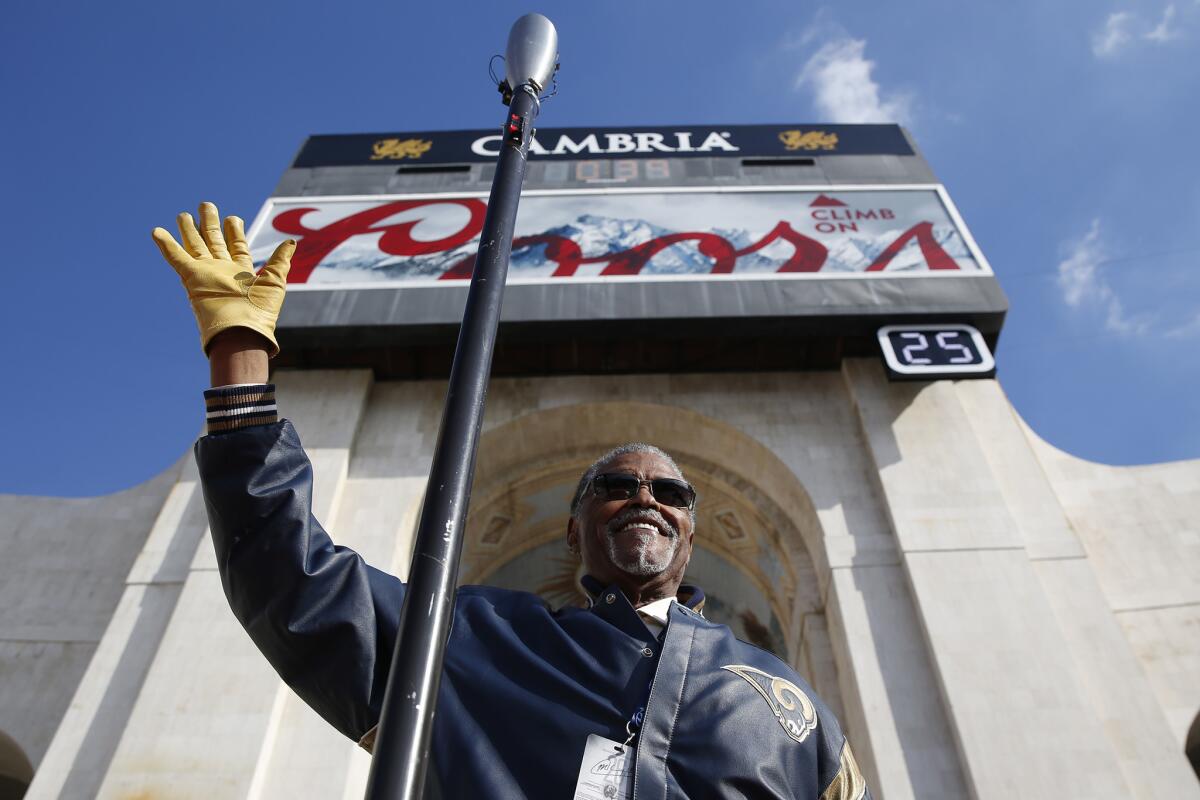
The former football star doesn’t seem to be worried an electorate in a state that overwhelmingly chose Hillary Clinton might be turned off by his support for Trump.
“If I’m not successful, it won’t be because I haven’t tried,” Grier said.
Roosevelt “Rosey” Grier was born in Georgia, and played for the New York Giants and Rams during his 12-year professional career in the 1950s and 1960s.
In the 1960s and 1970s, Grier also had a pretty good run as an actor. He starred in popular TV shows “Daniel Boone,” “Kojak,” “The Man from U.N.C.L.E.” and “I Dream of Jeannie.” He also starred in the 1972 movie “The Thing with Two Heads.”
A couple of years ago, Grier was involved in a legal dispute with his neighbor.
Grier’s neighbor Jana Young filed a lawsuit against him in 2014, accusing him of sexual assault, as well as failing to pay her for managing his finances and overseeing a home improvement project at his condo, according to court records.
Grier filed a counter-complaint accusing Young of inflating the cost of the construction work and failing to secure proper permits. Grier also alleged that Young “threatened to make false accusations” against him unless he paid, court records show.
The two reached a settlement in 2015, court records show.
Farm groups pitch Trump on picking former California Lt. Gov. Abel Maldonado as Agriculture secretary
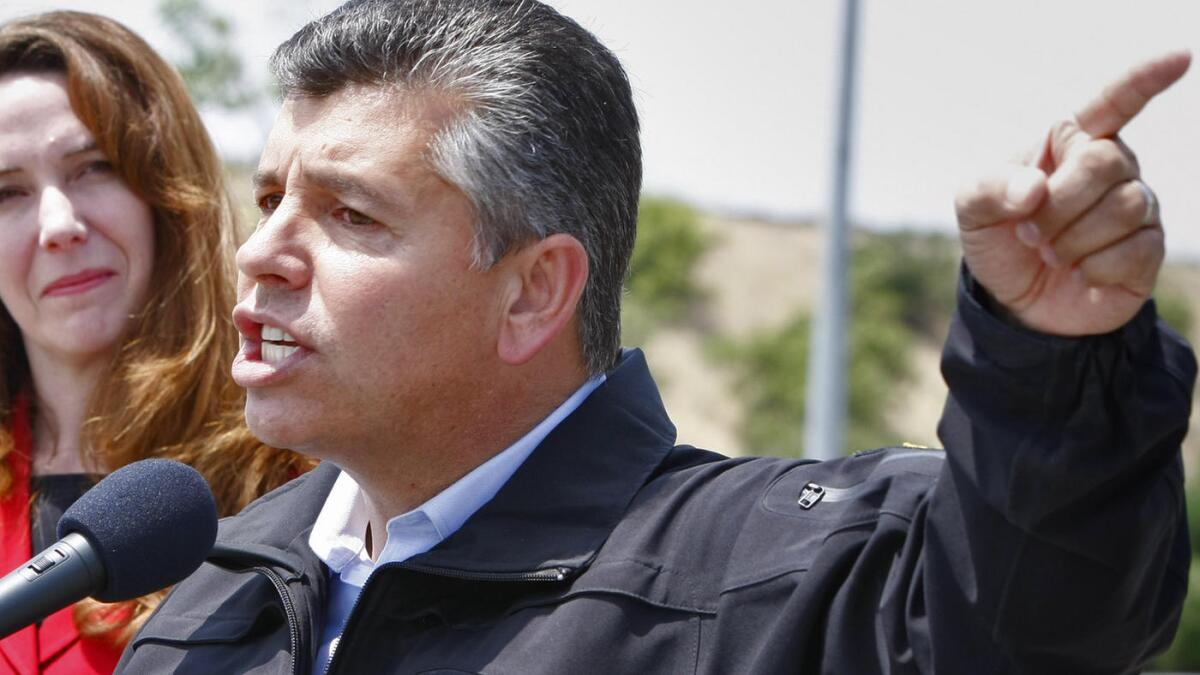
On the heels of Abel Maldonado’s visit with President-elect Donald Trump last week, major farm groups in California are urging the incoming president to pick the former lieutenant governor to lead the federal Agriculture Department.
Eight trade groups representing some of the state’s most prominent agriculture interests, including strawberry growers, dairies and pistachio farmers, sent a letter Thursday to the Trump transition team, touting Maldonado’s bona fides.
“California is the number one agriculture state in the nation producing over 400 commodities with worldwide distribution,” the letter reads. “Abel is one of the 78,000 California farmers that makes this happen every day.”
Maldonado, 49, owns Runway Vineyards in the Santa Maria Valley. The letter’s signatories praised Maldonado as looking out for the needs of agriculture during his stints in the Legislature and as lieutenant governor.
The note also explicitly refers to the California farm industry’s reliance on immigrant labor, which could be at odds with Trump’s pledges for strict immigration enforcement.
Maldonado “knows firsthand that it takes a team to succeed in agriculture and that includes those who till the soil and pick the crops, many of whom originate from Mexico and Central America,” the note says.
“They, like the farmer, are indispensable to the production of food and numerous other agricultural commodities produced in California and in the nation.”
Richard Matoian, executive director of the American Pistachio Growers, said Maldonado was attuned to the high labor demands that come with specialty crops like pistachios or wine.
“He’s got a special knowledge and background about the needs of California and specialty crops and the immigrant labor to harvest our crops,” he said.
In response to Uber, lawmaker introduces bill to penalize companies that test self-driving cars without permits

Three weeks after ride-hailing company Uber illegally debuted self-driving cars on San Francisco’s streets, a state lawmaker has introduced legislation to boost penalties on companies that defy the law.
The bill from Assemblyman Phil Ting (D-San Francisco) would fine any company that illegally operates such cars up to $25,000 per vehicle per day and prohibit the company from applying for a Department of Motor Vehicles permit to test the technology for two years.
“I applaud our innovation economy and all the companies developing autonomous vehicle technology, but no community should face what we did in San Francisco,” Ting said in a release. “The pursuit of innovation does not include a license to put innocent lives at risk.”
In mid-December, Uber unveiled 16 self-driving cars in San Francisco without getting a required permit from the DMV. The company argued that the rules didn’t apply to its fleet because the cars had a human behind the wheel who could take control. While the cars were on the road, local officials and residents registered numerous safety complaints, and a video of a self-driving Uber Volvo running a red light in San Francisco went viral. After a nine-day standoff with regulators, the DMV revoked the fleet’s registration and the company moved its testing to Arizona.
Ting had taken a test drive in one of the self-driving cars a few weeks before Uber put them on the streets. A spokesman for Ting said the assemblyman was supportive of the technology and was unaware that the company hadn’t received a permit to operate them.
Former L.A. planning commissioner becomes 12th to enter race to succeed Rep. Xavier Becerra
Former L.A. city planning commissioner and longtime Boyle Heights leader Maria Cabildo has announced she’s running for Rep. Xavier Becerra’s congressional seat.
Cabildo is the 12th person to officially announce a run to succeed Becerra, who is expected to give up the 34th Congressional District seat if confirmed as state attorney general.
“There are definitely a lot of candidates in the field, and I feel the district is really tired of career politicians and candidates that have really carefully crafted their careers around eventually running,” Cabildo said. “That hasn’t been me; my focus has been on doing work in the community.”
Once called the Patron Saint of Boyle Heights by L.A. Weekly, Cabildo was appointed by Mayor Eric Garcetti to the city’s Planning Commission in 2013 and served until 2015. She works for L.A. County, helping oversee implementation of the homeless initiative it adopted last year.
She also formerly served as president of the East Los Angeles Community Corporation and was chief of staff to L.A. County Supervisor Hilda Solis.
In challenge to Trump, California lawmaker seeks expansion of in-state tuition for immigrants in the U.S. illegally
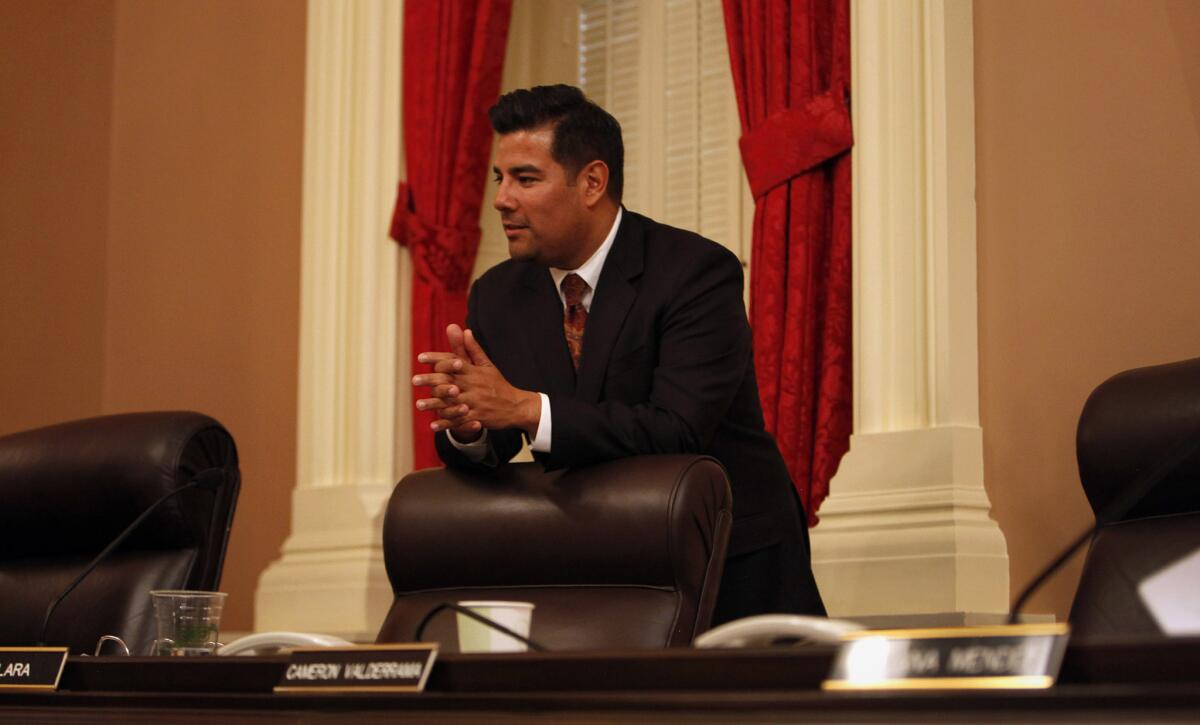
In another challenge to the immigration crackdown proposed by President-elect Donald Trump, a California lawmaker proposed Thursday to greatly expand the number of students in the country illegally who can get discounted, in-state resident tuition at state universities.
“Despite national rhetoric, California remains resolute in integrating the most vulnerable into our society,” said state Sen. Ricardo Lara (D-Bell Gardens), the bill’s author.
A 2001 law provides in-state tuition if immigrants in the country illegally attend three years of school and get a high school diploma. Otherwise, they face more costly tuition charged to students from out of the country.
With a recent spike in unaccompanied minors coming into the country, the new bill would help the young person who arrives at age 16 and can only attend high school for two years, including those who do not graduate.
Lara’s SB 68 would allow two years of community college to count toward the requirement of three years of schooling in California, and will allow completion of an associate degree or completion of a transfer agreement to UC and CSU, instead of high school graduation.
Lara, whose parents were immigrants from Mexico, has emerged as a leading advocate for young immigrants. He believes his bill will help thousands of immigrants in the U.S. illegally to get in-state tuition for their university studies.
“This is another way California will fight Trump and support undocumented students in California as they seek higher education,” said a statement issued by his office.
Oversight failings cited in delayed state computer project as price tag heads toward $1 billion
State officials have failed to remedy problems that have contributed to a two-year delay for a new computer system and cost increases that are pushing its cost toward $1 billion, State Auditor Elaine Howle warned Thursday.
The system is being built to improve the state’s handling of its finances. The completion date has been pushed back from July 2017 to July 2019 and the total estimated cost has increased $237 million to $910 million, Howle said in a letter to Gov. Jerry Brown.
Howle wrote that the project team “has not remedied the project’s significant scheduling slippage,” and the project is “failing to promptly respond to its oversight entities’ concerns and recommendations, many of which have been outstanding for more than a year.”
The Financial Information System for California (Fi$Cal) project is supposed to centralize all state budgeting, accounting, procurement and cash management functions in one computer system.
Miriam Ingenito, director of the Department of FI$Cal, welcomed the auditor’s input.
“The more rigor and scrutiny brought to FI$Cal, the stronger the project will be,” she said in a statement. “FI$Cal has hit all major milestones so far and is on track to meet those that remain. We’re also working closely with all of our oversight entities to ensure a high quality system.”
In 2012, state officials estimated the project would cost $617 million and be completed in July 2016, but the budget and schedule were previously increased.
It is one of a handful of state computer projects facing problems.
Updated at 3:48 pm: to include comments by Miriam Ingenito.
Obama administration comes to the aid of California’s delta tunnels water project
The outgoing Obama administration on Wednesday tried to nudge forward Gov. Jerry Brown’s proposal to build two giant north-south water tunnels for California.
In an executive order, U.S. Interior Secretary Sally Jewell directed federal wildlife officials on Wednesday to release by Jan. 17 a preliminary environmental opinion that directs the U.S. Fish and Wildlife Service and U.S. Bureau of Reclamation to assist as the $15.7-billion project seeks state and federal permits and other approvals.
Brown welcomed Jewell’s move, saying in a statement that “it commits the federal government to a timely review” of the proposed tunnels.
Brown wants a handful of California water districts to build the twin, 35-mile-long water tunnels to pipe Northern California’s water to Central and Southern California. The Obama administration also has supported the project.
Brown says the tunnels would ensure a more reliable water supply for Central and Southern California farms and cities. Environmental groups disagree with Brown over whether the giant tunnels would hurt endangered state species.
Senior attorney Doug Obegi at the Natural Resources Defense Council described Wednesday’s order as no more than a work plan for remaining action on the project, and not binding on the Trump administration. “It’s certainly not a green light for the tunnels,” Obegi said.
Final decisions on the tunnels will be made under the incoming administration of President-elect Donald Trump, who has called for more water for California farmers but has not specifically addressed the Democratic governor’s tunnels project.
Make California (politically) great again, says lawmaker who wants to move the presidential primary to Super Tuesday
California’s presidential primary could find itself squarely in the middle of the Super Tuesday political sweepstakes in 2020 under a proposal being introduced this week at the state Capitol.
And while earlier efforts have failed to either influence the outcome of the Democratic or Republican contests or draw high voter turnout, the plan’s author thinks times have changed.
“I think there’s a yearning and a hunger for actual engagement,” said Assemblyman Kevin Mullin (D-South San Francisco), the bill’s author. “There’s not enough discussion of substantive issues that are crucial to Californians.”
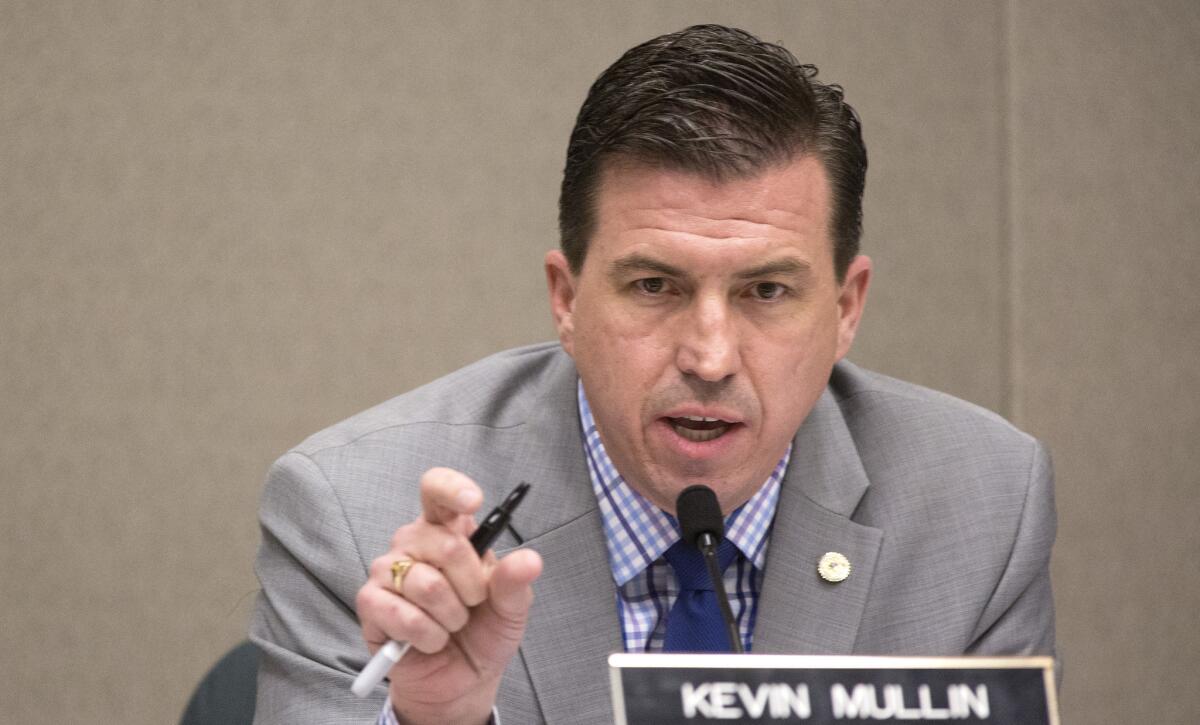
If ultimately signed into law, the bill would be the sixth time in two decades that California’s presidential primary was revamped in order to inject the state’s voters into the bloodstream of presidential politics.
Lawmakers first moved the presidential primary from June to March in 1996. Frustrated when additional states then pushed their contests even earlier, California held a presidential-only election on Feb. 5, 2008. Turnout in that election, won by Democrat Hillary Clinton and Republican John McCain, was higher than it had been in almost three decades. But elections officials, then tasked with congressional and legislative primaries in June, complained about the cost of holding three statewide elections in a single year.
Mullin’s plan, which will be formally introduced on Thursday, would return California to a consolidated state and federal primary in early March of each presidential year. In non-presidential years such as 2018, the state would continue to hold its primary in June.
A dozen states participated in the Super Tuesday presidential primary in 2016 — collectively awarding enough party delegates to surpass California, though not by much.
In an interview, the lawmaker said he disagrees with critics who said the early primary for state races simply meant more campaign fundraising.
“The fundraising is already a year-round obligation,” Mullin said.
Mullin also suggested that a factor working in California’s favor for political relevance would be voting by mail. More than half of all voters are now permanently receiving absentee ballots, and more are expected to vote early under a law signed last fall by Gov. Jerry Brown. That shift in the state’s electorate could entice presidential candidates to travel to California in hopes of attracting early support soon after the first contests in Iowa and New Hampshire.
“Lots of votes in California would be cast in February,” Mullin said.
In the crowded race for the 34th Congressional District, this candidate will be barred from campaigning this month
The race to replace Rep. Xavier Becerra is well underway, with a crowded field still forming and candidates scrambling to campaign and fundraise.
But one candidate vying for the seat won’t be campaigning for the rest of the month.
Steven Mac, who entered the race two weeks ago, is leaving Thursday for military training at Fort Benning in Georgia. Mac, an L.A. County prosecutor and Army reservist, has been ordered to attend Airborne School there through Jan. 27.
Defense Department rules preclude active duty military members from campaigning or political fundraising.
Mac isn’t the only candidate to be called away for military duty in the middle of a campaign. Last year, state Senate candidate Johnathon Ervin was deployed to South Korea during his general election campaign against Scott Wilk.
No date for the special election has been set because Becerra has not resigned the seat, which he is expected to give up if he is confirmed as California’s next attorney general.
California House Democrats are taking a wait-and-see approach on Trump’s plan for Dreamers

President Obama told congressional Democrats during a closed-door meeting Wednesday that he’s told President-elect Donald Trump about the importance of the program that defers deportation of people brought to the U.S. illegally as children.
The Democrats who persuaded Obama to create the Deferred Action for Childhood Arrivals program, and pleaded with him over the last month to find a way to protect the hundreds of thousands of young people in the program from being threatened with deportation, say they’re concerned and waiting anxiously to see what the new president will do.
“I still wish that there was an executive order that could guarantee that the private information of the DACA student remains private,” said Rep. Judy Chu (D-Monterey Park). “Just expressing your opinion to Donald Trump doesn’t convince me that he would not do something punitive to the Dreamers, especially because he made deporting the mainstay of his election campaign.”
Nearly 750,000 young people known as Dreamers have been granted deportation deferrals under the program, after giving the Department of Homeland Security their fingerprints, home addresses and other personal information.
Trump has pledged to deport millions of people who are in the country illegally, and California congressional members are worried his administration will use Dreamers’ information to target the young people, many of whom have lived most of their lives in the U.S.
“Once you understand who the Dreamers are and hear their stories, it’s very hard to say, ‘Well, you’re going back to this country you don’t even know.’ By all purposes they are Americans,” said Rep. Lucille Roybal-Allard (D-Downey). “So I’m hopeful that perhaps [Obama] had an impact, but until we actually see something concrete I’m very, very concerned.”
Trump told Time magazine in December that “we’re going to work something out that’s going to make people happy and proud,” but he has provided no details on how he’d accommodate the Dreamers.
“Donald Trump is all over the map with this stuff, so we’ll just have to wait and see,” said Rep. Zoe Lofgren (D-San Jose).
Former leader of antipoverty group joins race to replace Xavier Becerra in Congress
Vanessa Aramayo, a former executive director for the California Partnership, a statewide group focused on economic justice, will run for Congress to replace Rep. Xavier Becerra (D-Los Angeles) in the 34th Congressional District.
Becerra, who was formally nominated for the post of state attorney general Tuesday, is awaiting confirmation hearings in the state Legislature. They are scheduled to begin next week.
Aramayo, 39, also previously worked for the Council of Mexican Federations, a nonprofit focused on Latino immigrants, and as a staffer in the Assembly and U.S. Congress. She was born and raised in Glendale and lives in Eagle Rock with her husband and twin daughters.
Like many of the 11 candidates in the race, and like Becerra himself, Aramayo’s parents are immigrants.
“I know both how to fight and how to work with people to be effective,” Aramayo said. “It’s going to be a lot of work, but I think this is what life has been preparing me for.”
Darrell Issa takes another shot at changing the rules for the skilled worker visa program
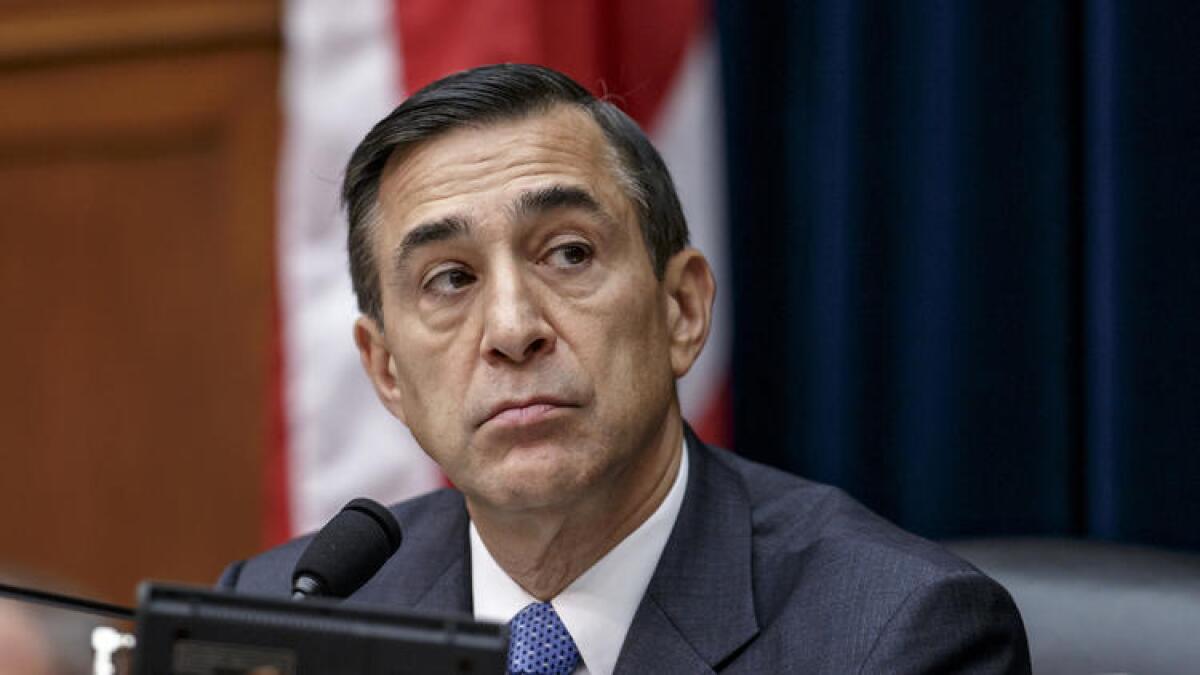
U.S. Rep. Darrell Issa (R-Vista) wants companies that recruit highly skilled foreign workers to follow new standards aimed at making it more difficult to exploit the visa program that allows them to work in the U.S.
Issa on Wednesday introduced legislation backed by multiple Democrats and Republicans that changes the requirements for the visa program known as H-1B, which was designed so foreign workers with specialty skills can fill jobs in the U.S. when qualified Americans aren’t available.
The program is heavily used by technology companies, particularly in Silicon Valley, but Issa said the spirit of the program has been ignored by companies that replace Americans with workers from other countries whom they can pay less.
“As soon as you have examples of Americans losing jobs, it makes a good program look bad,” Issa said. “You have great success stories, but you don’t get judged based on your success stories. You get judged on your failures.”
He pointed to Southern California Edison, which has been criticized in recent years for laying off Americans and hiring foreign workers through a consulting company.
“It’s specifically required that there be a shortage,” Issa said. “When Southern California Edison asked their employees being laid off to train their replacements, by definition there was not a shortage.”
Edison said at the time of the layoffs that it was “not hiring H-1B workers to replace displaced employees. Any H-1B visa workers SCE does hire for its own workforce are paid a wage comparable to SCE’s domestic workforce.”
Disney and a handful of other California companies have been criticized in recent years for similar moves.
Only 85,000 H-1B visas are granted each year. Critics complain that U.S. employers exploit loopholes in the system to hire cheaper labor from abroad at the expense of American workers.
Companies with more than 50 employees who have 15% or more employees with the visas must show on H-1B applications that the job was advertised to American workers. But employers can be exempted from that paperwork if the potential employee holds a master’s degree or will be paid at least $60,000 annually.
Issa’s bill would remove the exemption for workers with a master’s degree; he says it’s too easy to get one from an uncredentialed foreign university. The bill would also increase the minimum salary needed for an exemption to $100,000 annually.
Issa pitched a similar bill late in the last Congress, when few new bills were considered, and it died in committee without a hearing. But with a new Republican president this year, things could be different.
Reforming the program was among the topics discussed at a December meeting between Trump and tech leaders. Issa said conversations with tech leaders after that meeting, coupled with bipartisan support for the legislation, makes him think the bill has a better chance in this Congress.
“I expect it to move, and move quickly,” Issa said. “This is a piece of legislation which logically should get an overwhelming majority in the House on a bipartisan basis. It’s designed to be an ... easy win.”
Issa said he’s hoping the H-1B program changes can be considered outside of broader immigration reform “so we just fix a problem.”
“If we can’t solve this one on a bipartisan basis, we’re not going to get to the harder ones,” he said.
California lawmakers hire former U.S. Atty. Gen. Eric Holder to craft anti-Trump legal strategy
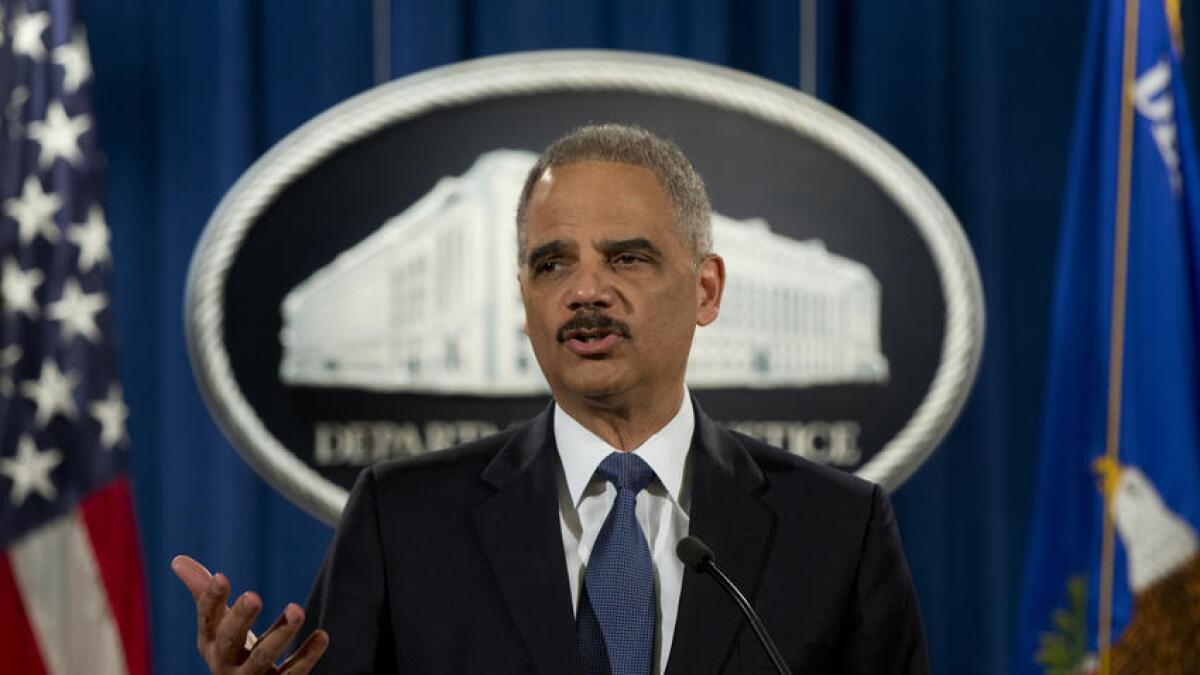
Bracing for an adversarial relationship with President-elect Donald Trump, the California Legislature has selected former U.S. Atty. Gen. Eric H. Holder Jr. to serve as outside counsel to advise the state’s legal strategy against the incoming administration.
The unusual arrangement will give Holder, leading a team of attorneys from the firm Covington & Burling, a broad portfolio covering potential conflicts between California and the federal government. Former Los Angeles Rep. Howard Berman, a Democrat who is now a senior advisor to the firm, will also be part of the effort.
The initial three-month contract will cost $25,000 per month, shared by the state Senate and Assembly, according to the a copy of the engagement letter between the Legislature and the firm obtained by the Times.
Rep. Dana Rohrabacher says he plans to lead delegation to Russia to see ‘how we can work with the Duma’
Rep. Dana Rohrabacher (R-Costa Mesa) has told the Washington Post he’s planning a trip to Russia with a congressional delegation next month to discuss “how we can work with the Duma.”
Rohrabacher has long been viewed as friendly toward Russia. In a recent exchange with a Moldovan-born Yahoo News anchor, he responded to allegations of Russian human rights abuses with “Oh, baloney!” and said the news anchor was biased.
Rohrabacher’s trip will have to be approved by a fellow California congressman, Rep. Ed Royce (R-Fullerton), who leads the House Committee on Foreign Affairs.
Rohrabacher has represented his district for 28 years, and has long been targeted for retirement. But his name was recently floated for secretary of State and his potential to be a major ally for Russia-friendly President-elect Donald Trump on Capitol Hill could keep him in the seat.
Rep. Hunter used campaign funds on airline fees for a rabbit; his office says ethics panel interest shows overreach
Rep. Duncan Hunter (R-Alpine), who has been investigated by the House Ethics Committee, was among the Republican members who defended an ultimately failed attempt this week to gut the committee.
An upcoming report from the committee will show Hunter used campaign funds to pay the $600 cost of flying a family rabbit, one of the expenses that is expected to surface as part of an ongoing review of his campaign spending.
The ethics office last year conducted a review of Hunter’s campaign expenses. Release of the ethics committee report was postponed in anticipation of the swearing in of the new Congress.
In an interview with the Riverside Press-Enterprise, Hunter’s spokesman, Joe Kasper, revealed the rabbit fee and cited it as an example of overreach by the committee.
“This was nothing more than an oversight. In fact, it’s such an obvious example of a mistake being made but (the office) wants to view it through a lens of possible intent. The same goes for many other expenditures,” Kasper told the San Diego Union-Tribune.
Hunter has reimbursed his campaign more than $60,000 in expenses that were personal or not documented appropriately.
California’s housing affordability problems ‘as bad as they’ve ever been in the state’s history,’ housing director says

California’s housing affordability challenges remain daunting and continue to increase, according to a draft report from the state’s Department of Housing and Community Development released Tuesday.
The report found:
- Housing production over the last decade fell more than 100,000 new homes short of demand and continues to lag, leading to surging prices at all income levels.
- The state’s homeownership rates are at their lowest since the 1940s.
- One-third of the state’s renters spend more than half their income on housing costs.
- California has 12% of the nation’s population, but 22% of the country’s homeless population.
“What the report tries to get at is that the facts on the ground for a typical California family are really as bad as they’ve ever been in the state’s history,” said Ben Metcalf, director of the Department of Housing and Community Development.
The report includes a range of potential solutions, including streamlining local and state land-use and environmental rules and boosting funding for low-income housing.
“If there is good news in all this, these are, in some cases, problems that we have created through local and state policies,” Metcalf said. “And because these are challenges that have been created through policies, we know we can fix them.”
The state has not passed major housing legislation in recent years, most notably failing to reach a deal on Gov. Jerry Brown’s proposal to limit some local review of housing projects and spend $400 million on low-income housing subsidies. This year has already seen a series of housing proposals, including plans for billions in new spending as well as faster permitting for cities that have low housing production.
Here’s what the first day of Congress was like for the five Democrats who joined California’s House delegation today
California’s newest U.S. representatives, four men and one woman, are now part of the largest Congressional delegation in the country after being sworn in to the 115th Congress on Tuesday afternoon.
“It’s been an amazing day, really historic,” said Rep. Nanette Barragán (D-San Pedro).
Fourteen of her family members flew across the country to witness the swearing in, including Barragán’s mother.
“Right now we’re trying to make sure to get all the photos and opportunities to get the mementos, because it’s only once that you get sworn into Congress,” she said.
Inside the House chamber, Rep. Ro Khanna (D-Fremont) leaned against a railing and chatted with Rep. Jerry McNerney (D-Stockton). Khanna was sworn in on a bicentennial edition of the Constitution on loan from the rare books division of the Library of Congress.
Rep. Jimmy Panetta (D-Carmel) is representing the area once represented by his father, Leon Panetta, a fact that was repeatedly pointed out throughout the day.
Panetta said House Speaker Paul D. Ryan (R-Wisc.) stopped to talk briefly with them, rolled his eyes and said with a laugh, “Oh, another Panetta.”
Panetta said having his father with him during the swearing-in was “definitely one of the highlights of my life” and that it was especially poignant to have his two daughters by his side when he voted for House Minority Leader Nancy Pelosi (D-San Francisco) to be speaker. (The vote was largely along party lines.)
Rep. Lou Correa (D-Santa Ana), who waited with this family to pose for pictures with House leaders, said the day was a whirlwind.
“I’m very humbly honored to be a member of this great country’s Congress given my economic background. It just shows the American dream is still there,” Correa said.
Rep. Salud Carbajal (D-Santa Barbara) stopped in Statuary Hall to take a photo with his new colleague, Rep. Steve Knight (R-Palmdale), before members cast their first votes Tuesday. The former Santa Barbara County supervisor said he’s ready to start legislating.
“The excitement is waning now a little bit. It just feels like, lets get on with it,” Carbajal said.
Watch Sen. Kamala Harris take the oath of office with her family

Vice President Joe Biden swears in Kamala Harris
Along with the official swearing-in, new senators can choose to attend a ceremonial swearing-in with Vice President Joe Biden.
Their spouse or a child gets to participate, and afterward Biden poses for photos with their family members while cracking jokes and kissing moms and babies.
Democratic Sen. Kamala Harris was sworn in today by Biden while her husband, Los Angeles attorney Doug Emhoff, held a leather-bound family Bible.
Afterward, the more than two dozen family and friends who gathered from across the globe for Harris’ swearing-in piled in around Biden for a photo.
The money race is well underway for California’s 2018 campaign for governor
California’s 2018 race for governor may still be in its infancy, but the competition for campaign donations is well underway.
Democratic Lt. Gov. Gavin Newsom, who launched his bid in January 2015, on Tuesday announced he raised $2.7 million during the second half of 2016. Newsom also reported having $11.5 million cash on hand, which includes money socked away in his old campaign account for lieutenant governor.
Not to be outdone, former Los Angeles Mayor Antonio Villaraigosa on Tuesday tweeted out his fundraising totals. The Democrat said he has raised $2.7 million for his gubernatorial campaign since he jumped into the race on Nov. 10.
State Treasurer John Chiang, also a Democrat, reports he raised $1.93 million in the second half of 2016. Chiang launched his bid for governor in May, and his campaign said it has $7 million on hand — including money left in his campaign account for treasurer.
Official campaign finance reports for the second half of 2016 don’t have to be filed with California’s Secretary of State until Jan. 31. Those reports will include a detailed accounting of each campaign’s donors and expenditures.
The race still has a long way to go, and other big name candidates may get into the race in the months ahead.
John Keplinger, former executive director of the state Fair Political Practices Commission, has died
John Keplinger, the former executive director of California’s political watchdog agency, died on Dec. 17 at age 80, according to the Associated Press.
A former newspaper reporter and campaign consultant. Keplinger later became chief of the California secretary of state’s political reform unit and executive director of the state Fair Political Practices Commission, according to Los Angeles Times columnist George Skelton.
California Secretary of State Alex Padilla said Keplinger laid the foundation for improved transparency in political finances. “California lost a model public servant in John Keplinger – a man who was pivotal in the launch of our electronic filing and disclosure system known as CAL-ACCESS,” Padilla said.
Keplinger was also the FPPC’s top staffer from 1983 to 1986.
Skelton, a longtime friend of Keplinger, covered news events side-by-side with him while Keplinger was a reporter for the Palo Alto Times newspaper.
Just a few Democrats defect from Nancy Pelosi during House speaker election
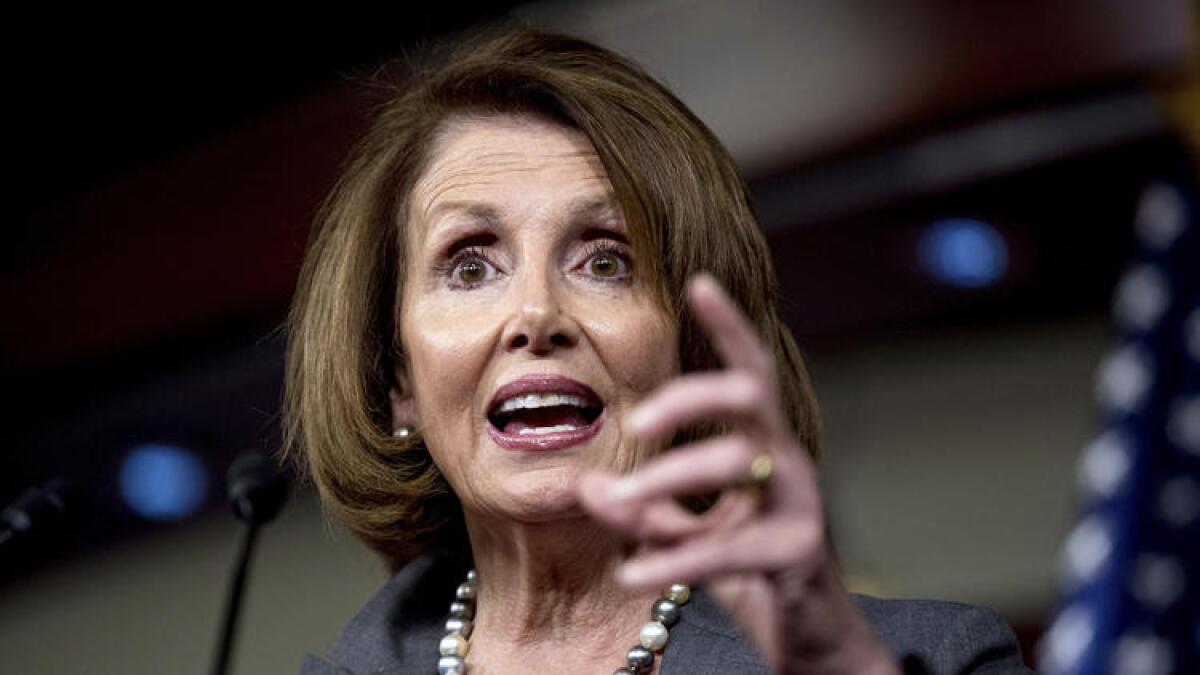
House Minority Leader Nancy Pelosi (D-San Francisco) was most Democrats’ pick Tuesday for House speaker, but, as expected, she lost the gavel to Republican Paul D. Ryan of Wisconsin.
Some were watching to see whether Democrats would back away from the minority leader, especially during a public vote, after the first serious challenge to her authority last month. But only a few did.
Rep. Jim Cooper (D-Tenn.) voted for Rep. Tim Ryan (D-Ohio), Rep. Kyrsten Sinema (D-Ariz.) voted for Rep. John Lewis (D-Ga.) and Rep. Ron Kind (D-Wis.) voted for Cooper.
Cooper and Sinema previously voted for another member over Pelosi.
Assembly sets confirmation hearing after Gov. Brown formally nominates Becerra for state attorney general

Less than an hour after state Atty. Gen. Kamala D. Harris resigned and took the oath of office for the U.S. Senate, Gov. Jerry Brown on Tuesday officially nominated Rep. Xavier Becerra to fill the vacancy and become California’s top law enforcement officer.
The state Assembly set a Jan. 10 date for his first confirmation hearing.
The Assembly and Senate now have 90 days to act on confirmation of Becerra, a Democrat from Los Angeles, as state attorney general.
A letter from the co-chairs of the Assembly Special Committee on the Office of the Attorney General, which will consider the confirmation, asks Becerra to submit written comments on five “critical issues confronting California today and over the next two years” remaining in the attorney general’s term.
Becerra was asked to respond to give his positions on immigration, including cooperation with federal immigration authorities and his view of sanctuary cities; civil rights; environmental protection; police accountability; and consumer protection. The congressman was also asked to describe his position on President-elect Donald Trump’s proposal for a registry for Muslim immigrants.
Kamala Harris sworn in as first Indian American senator and California’s first black senator

Kamala Harris sworn in
Before friends and family in a packed chamber, Kamala Harris was sworn in as California’s newest U.S. senator Tuesday morning. She became the first black woman the Golden State has sent to the Senate and the first Indian American to ever serve in the body.
Harris, 52, a Democrat from Los Angeles, was sworn in by Vice President Joe Biden shortly after 9 a.m. PT as Sen. Dianne Feinstein (D-Calif.) and her new Senate colleagues looked on. Harris’ husband, Los Angeles attorney Doug Emhoff; her stepchildren; brother-in-law Tony West; sister Maya Harris; and her extended family as well as several state officials from across the country who traveled to celebrate with the former state attorney general watched from the gallery.
“Whatever advice she wants, all she has to do is ask,” Feinstein said. “I have said to her that I would like to have a close relationship.”
Feinstein and Harris met repeatedly in the weeks since the election, with Feinstein sharing advice on how to set up the largest Senate office in the country, including how to deal with the up to 100,000 emails, letters and phone calls that can come into a California senator’s office in a given week.
Harris, one of seven new senators, replaces Democratic Sen. Barbara Boxer, who retired after 24 years in the Senate.
Meet the six Californians who are officially joining the largest congressional delegation today

Today the 115th Congress will be sworn in, including California’s first new U.S. senator in more than two decades and five new House members.
In the Senate, members are sworn in one at a time, and Sen. Dianne Feinstein (D-Calif.) is expected to walk her new colleague Sen.-elect Kamala Harris across the chamber to be sworn in.
Many eyes will be focused on Harris in the coming months. Considered a rising star in the Democratic Party, she has already been floated as a possible presidential candidate for 2020.
Friends and family will fill the galleries as all 435 House members are sworn in at the same time. House and Senate leaders also hold a ceremonial swearing-in later in the day, when individual members can get a photo with Vice President Joe Biden.
California’s five new House members are Rep.-elects Ro Khanna (D-Fremont), Jimmy Panetta (D-Carmel), Lou Correa (D-Santa Ana), Salud Carbajal (D-Santa Barbara) and Nanette Barragán (D-San Pedro).
We’ll be tracking the new members throughout the day, but you can check out their backgrounds and biographies below.
Assemblywoman rings in 2017 with a surprise marriage to a former lawmaker
For a legislator who frequently offers glimpses of her personal life on Twitter, the new year brought something entirely different to share: a wedding.
Assemblywoman Lorena Gonzalez (D-San Diego) was married on Sunday to a former Republican member of the Assembly, Nathan Fletcher. The ceremony, attended only by the couple’s close family, was officiated by former Assembly Speaker John A. Pérez.